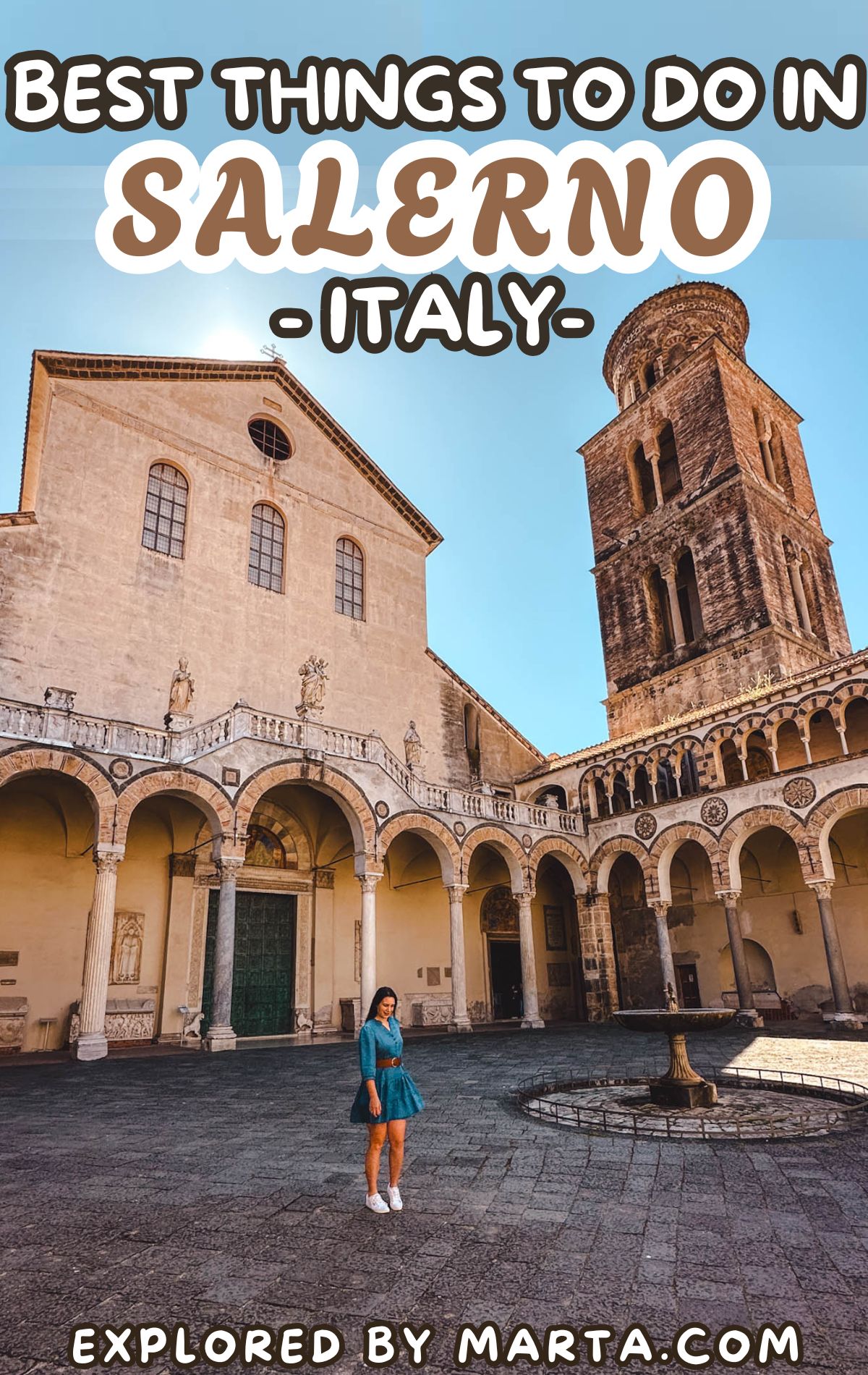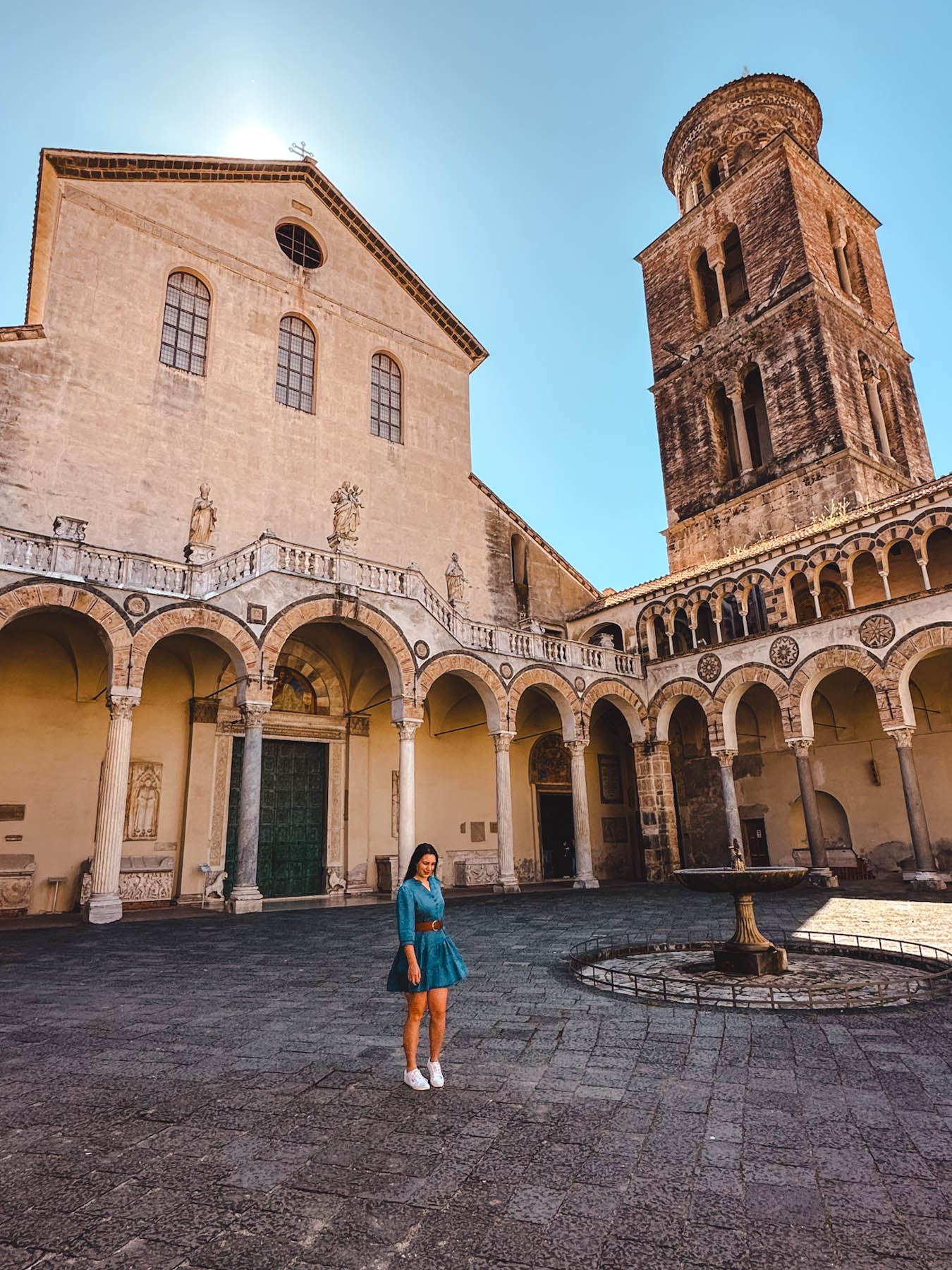15 best things to do in Salerno, gateway to the Amalfi Coast
This post may contain affiliate links. If you use these links to buy something I may earn a small commission at no extra cost to you! Thank you for your support!
Here are all the best things to do in Salerno, Italy! Salerno is an ancient coastal city with a rich history, located near the Sorrentine Peninsula. Today, it is widely known as an ideal base for exploring the Amalfi Coast, Pompeii, and other iconic destinations.
In fact, Salerno is often called one of the gateways to the Amalfi Coast, marking the entrance to the scenic Amalfi Drive road winding along the coastline and through the iconic coastal villages. The other gateway is Sorrento, which sits on the opposite end of the peninsula.
In case you’re staying in Salerno during your travels, this guide covers some of the top things to do in Salerno, complete with photos, descriptions, and Google Maps locations. There are some truly beautiful places worth checking out! Happy travels!
1. Walk Lungomare di Salerno, the city’s most scenic walk
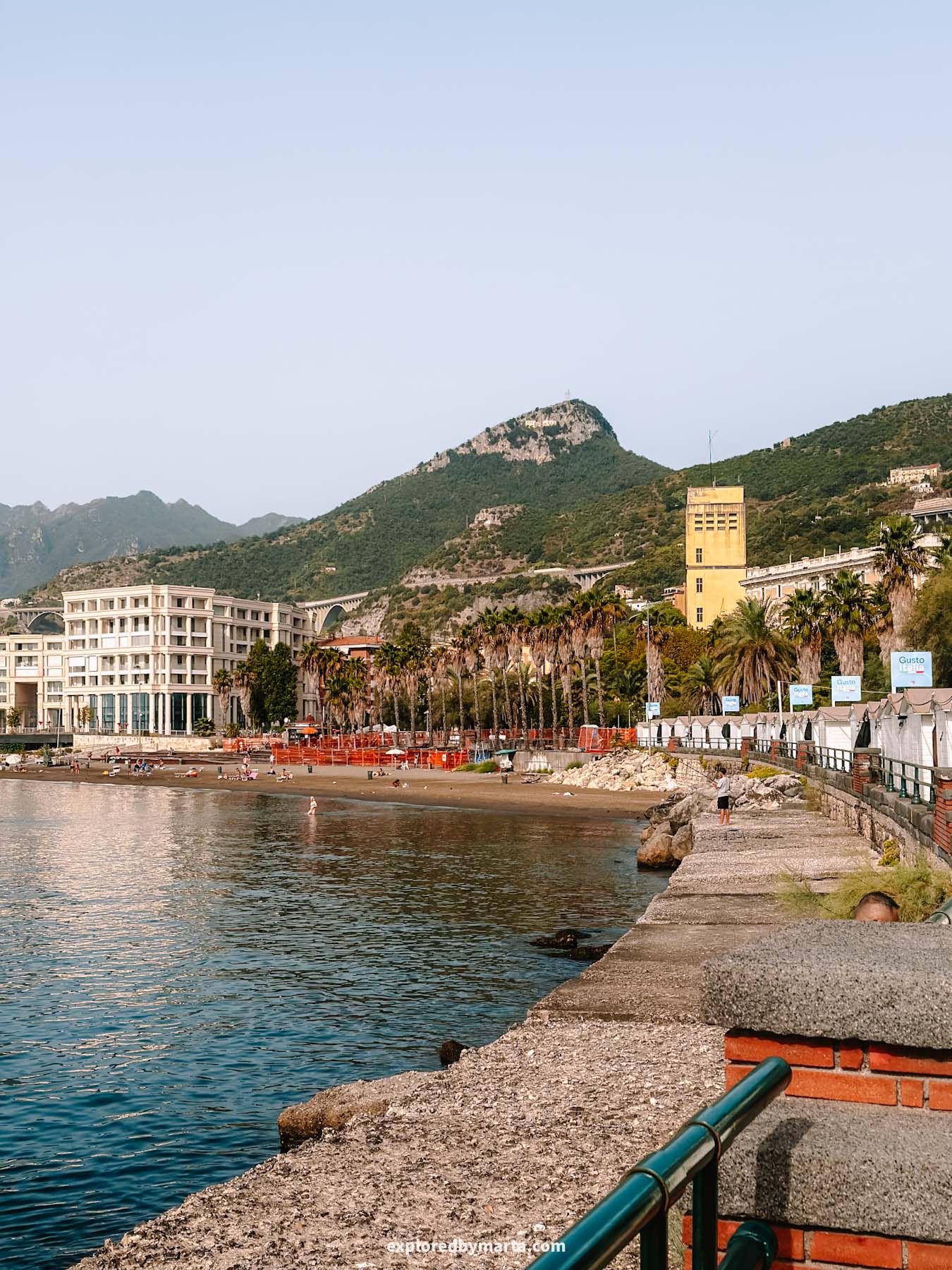
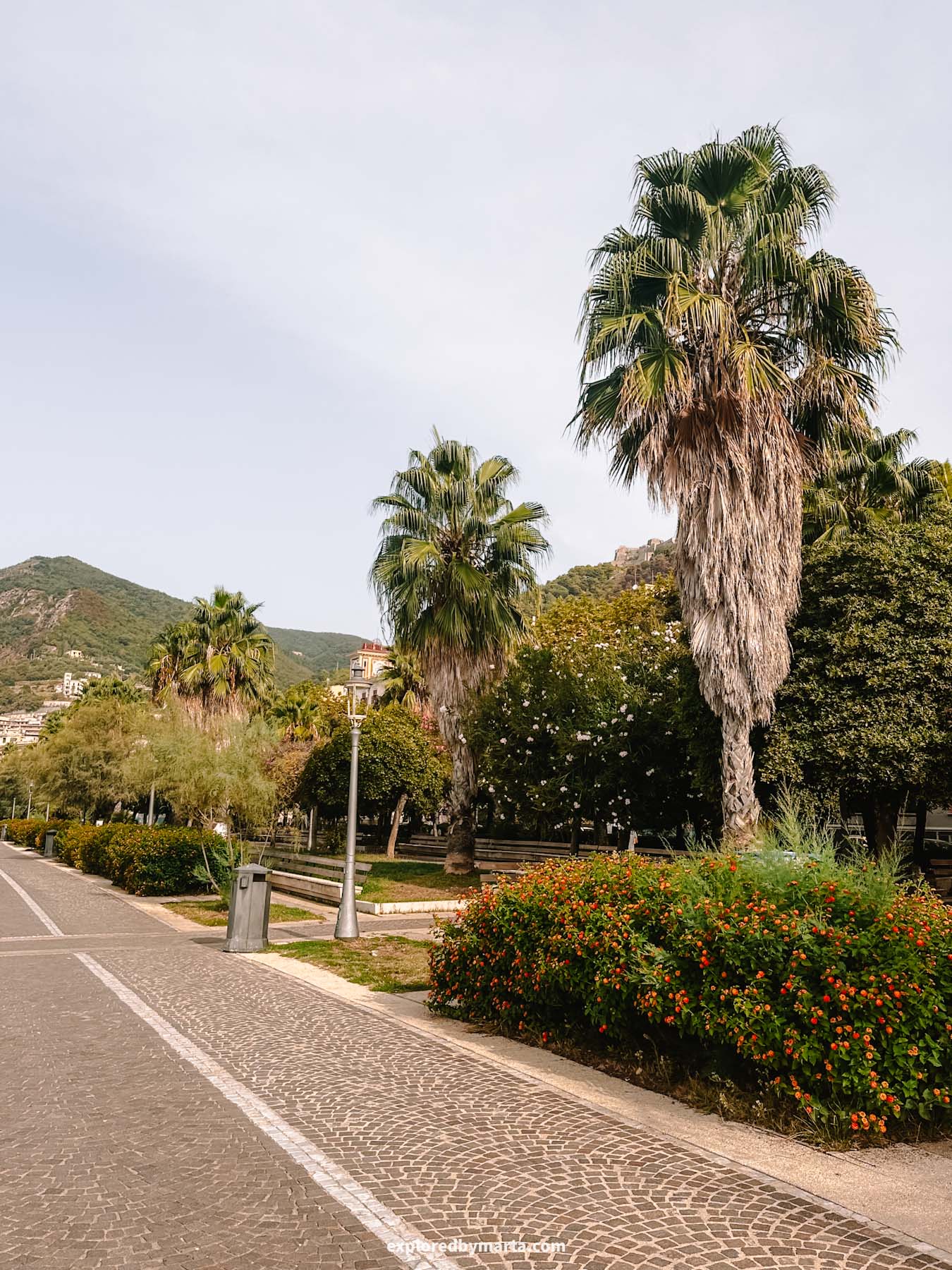
Welcome to Salerno! Let’s start exploring with one of the most beautiful spots in the city—its scenic seaside promenade, Lungomare di Salerno (also called Lungomare Trieste).
Lined with palm trees, blooming flower bushes, cozy cafés, and benches, Lungomare di Salerno is the ultimate place where locals and visitors come to take a walk, breathe in the fresh sea air, and unwind.
We stayed near Salerno during our Amalfi Coast travels and came here often for a morning jog along the promenade. It quickly became one of my favorite places to visit in Salerno!

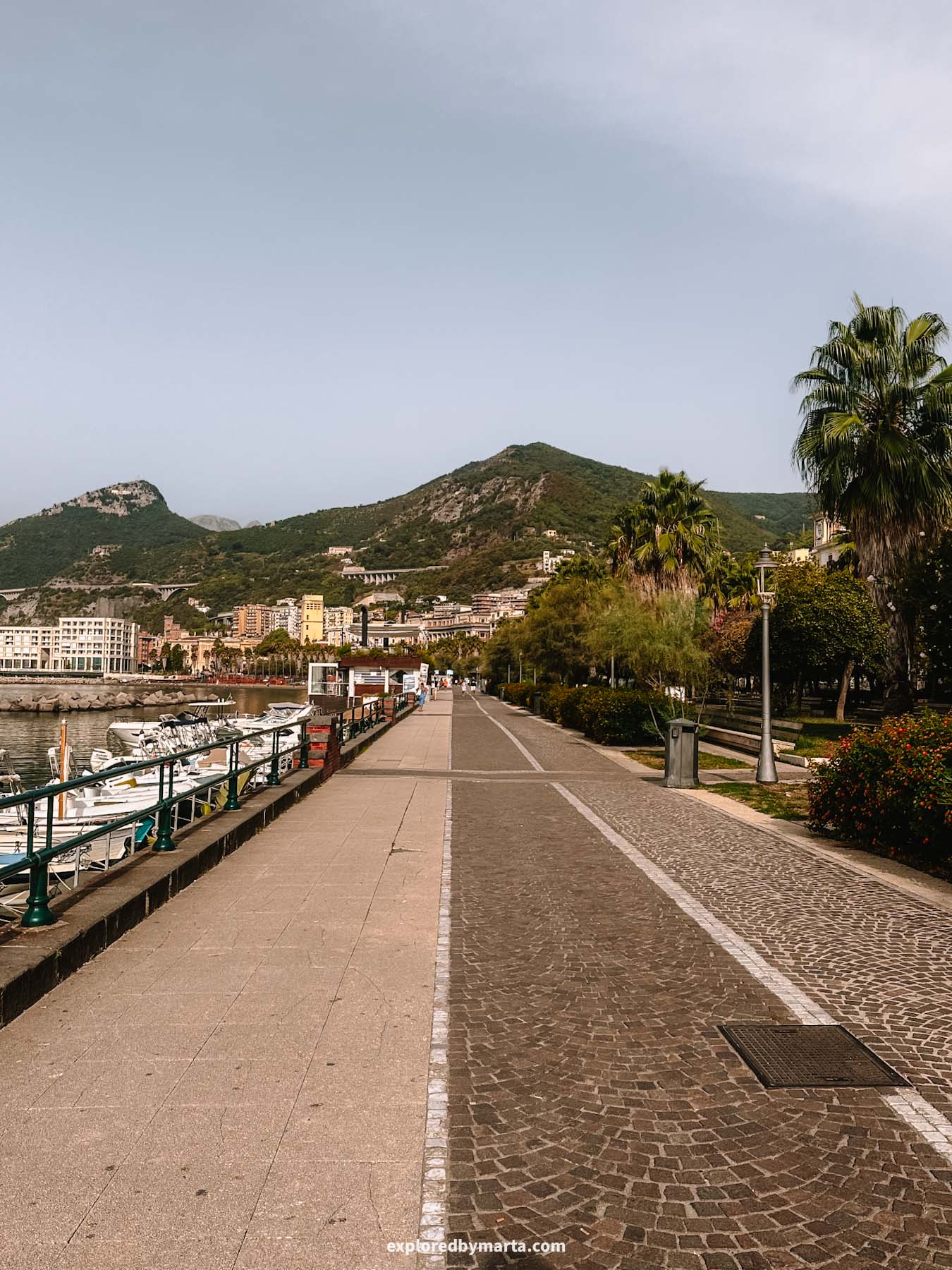
The promenade stretches along Salerno’s waterfront for about 1.5 kilometers (or 1 mile). Along the way, you’ll enjoy fantastic views of the distant Amalfi Coast, the city’s seafront buildings, and local fishermen looking to get their daily catch.
Sometimes the promenade hosts festivals with vendors selling local products like cheese, sweets, and wine from charming wooden huts.
Lungomare is the perfect escape from the narrow streets in the heart of the city of Salerno. My favorite time to visit Lungomare was shortly before sunset, when everything is shining in golden hues.
The second best time for visiting the promenade is in the morning, while most people are still sleeping and everything is so quiet and empty.
Location: Lungomare di Salerno
2. Try the legendary gelatos at Bar Gelateria Nettuno

Bar Gelateria Nettuno is a local legend in Salerno. This quaint ice cream shop opened back in the 1970s, and ever since, it has been serving delicious coffee and Italian gelato to both locals and tourists.
But there’s one thing Bar Gelateria Nettuno is especially famous for: brioche gelato sandwiches. Yes, you heard me—they put gelato inside a fresh brioche bun, and it actually makes perfect sense!


Not only is this soft, creamy gelato sandwich incredibly delicious, but it’s also very filling. So if you want to try the ultimate Italian-style breakfast, a coffee paired with gelato inside a brioche is what you need to get!
Bar Gelateria Nettuno is located right by the beautiful Salerno promenade, so we grabbed our brioche gelatos and went straight to the promenade park, found a bench to sit down, and ate our Italian breakfast while gazing at the sea.
The brioche gelatos were so good that we even returned to this charming gelato shop for another bun. My husband is a pistachio fan through and through, but I liked trying different flavors. The bun definitely tastes better with creamier and sweeter types of gelato!
Location: Bar Gelateria Nettuno
3. Explore Duomo di Salerno and Crypt of St. Matthew
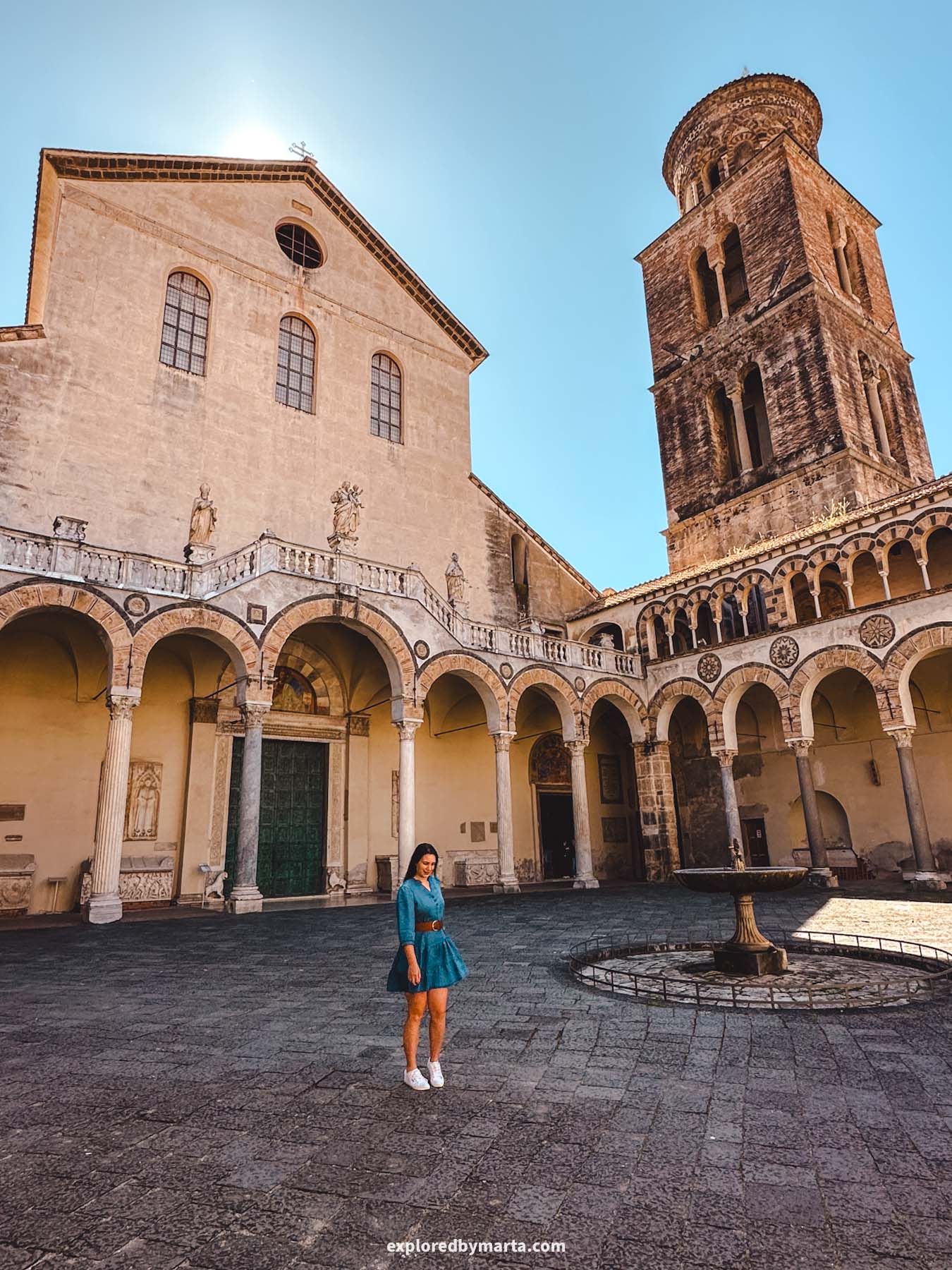
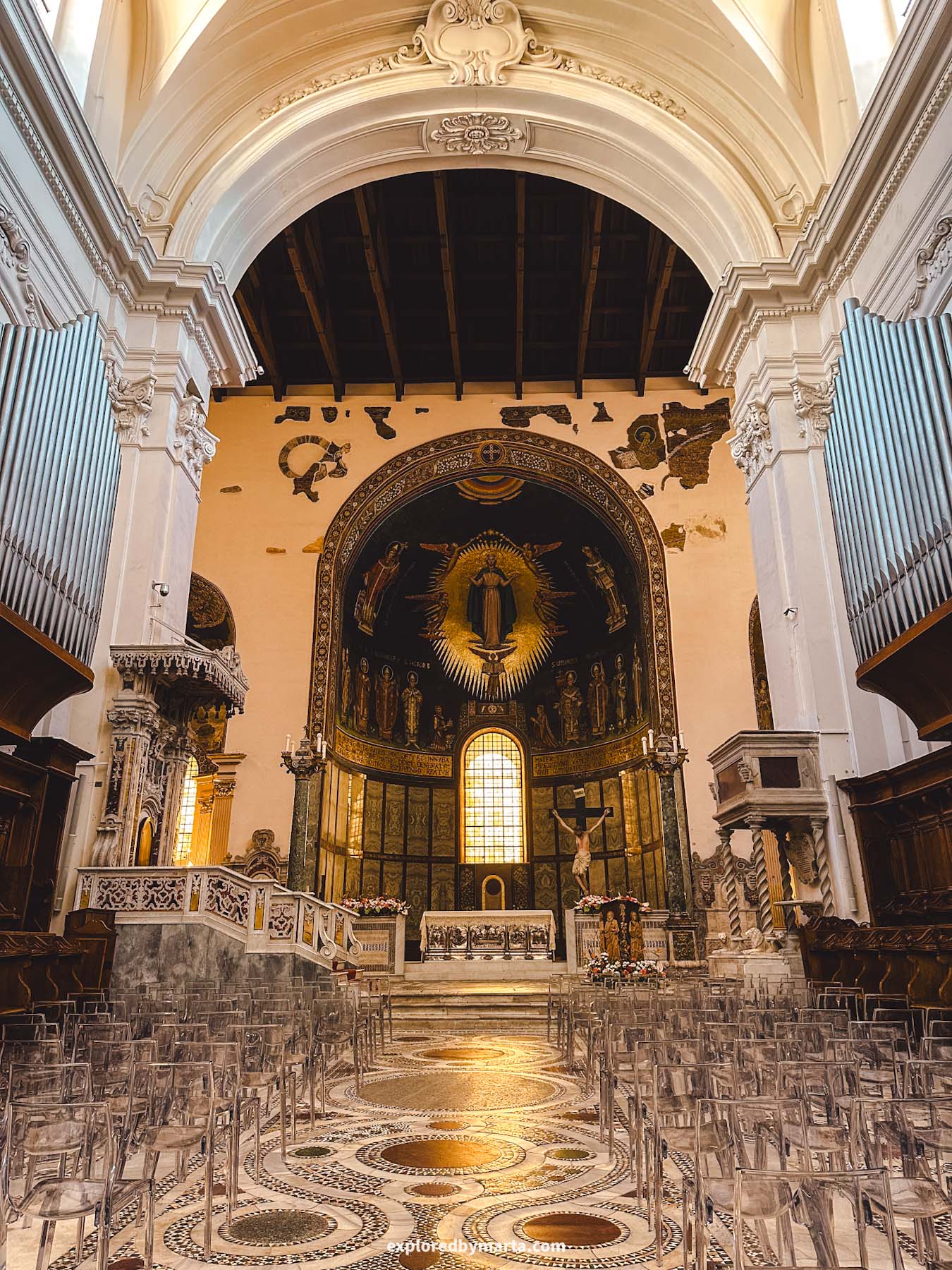
Salerno’s crown jewel – the Duomo di Salerno, or Cathedral of Salerno – is a medieval masterpiece and probably my favorite landmark in the city. It’s a must-visit for anyone coming to Salerno!
Built in the 11th century, the cathedral has become one of the most important pilgrimage destinations in the world. And for good reason – the remains of Saint Matthew, one of the Twelve Apostles, are buried in its crypt.
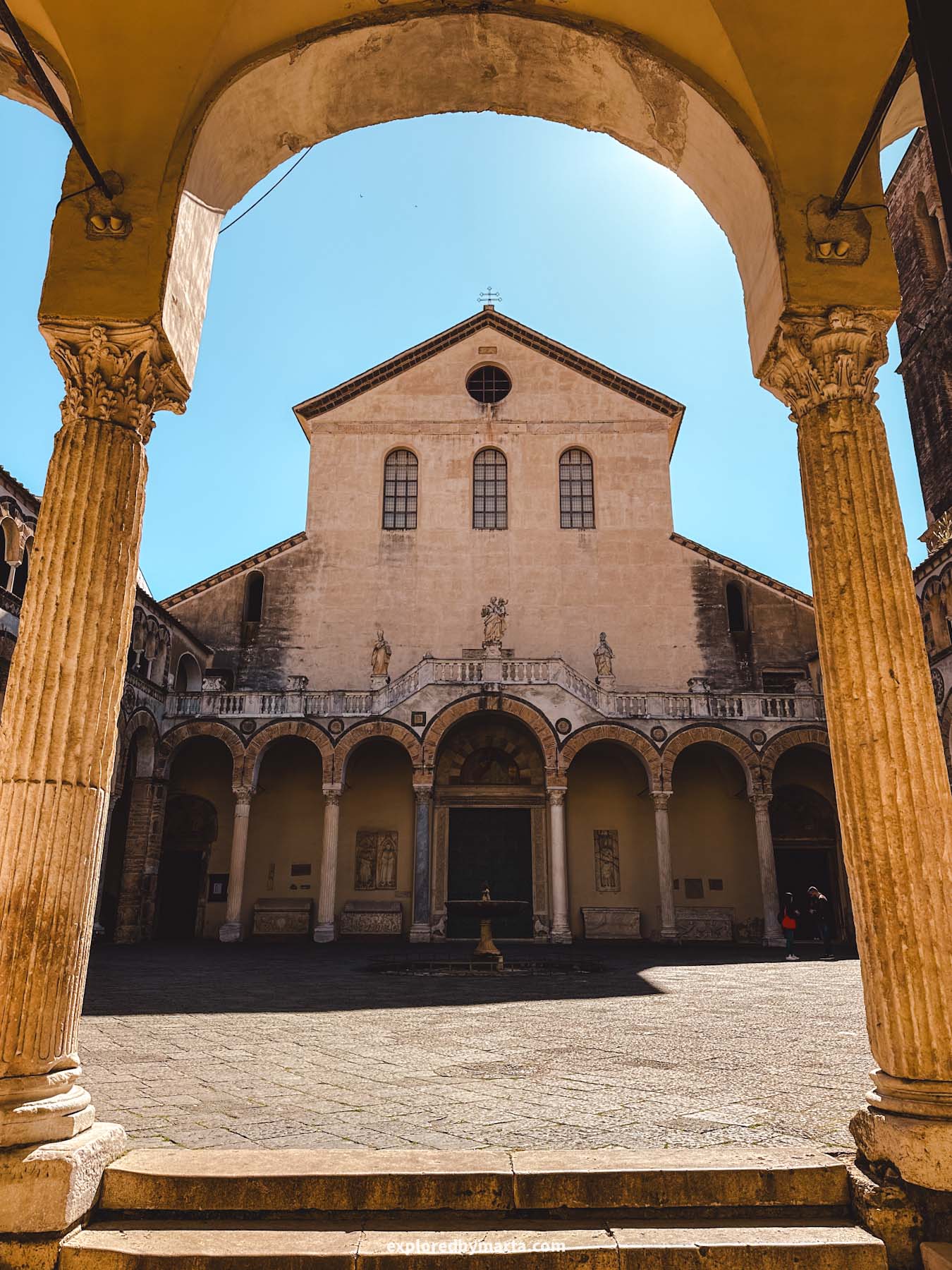
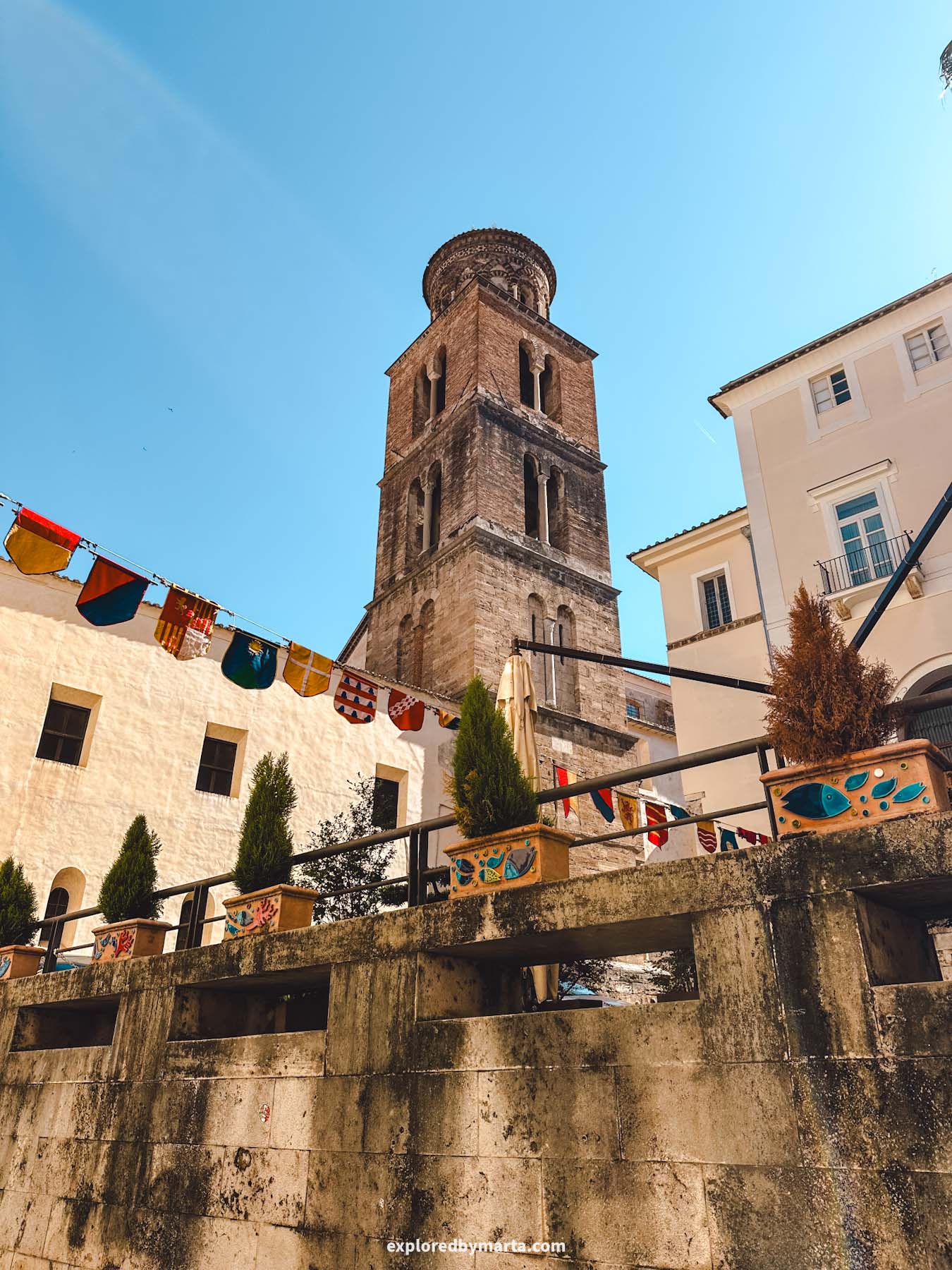
But the crypt isn’t the only reason to visit. The cathedral also features a striking 12th-century bell tower that pierces Salerno’s skyline and a beautiful courtyard lined with Roman columns.
Inside the cathedral, you’ll find a grand nave, impressive frescoes, artworks, and a Baroque-style ceiling. But the richly decorated altar is the central element inside the cathedral.

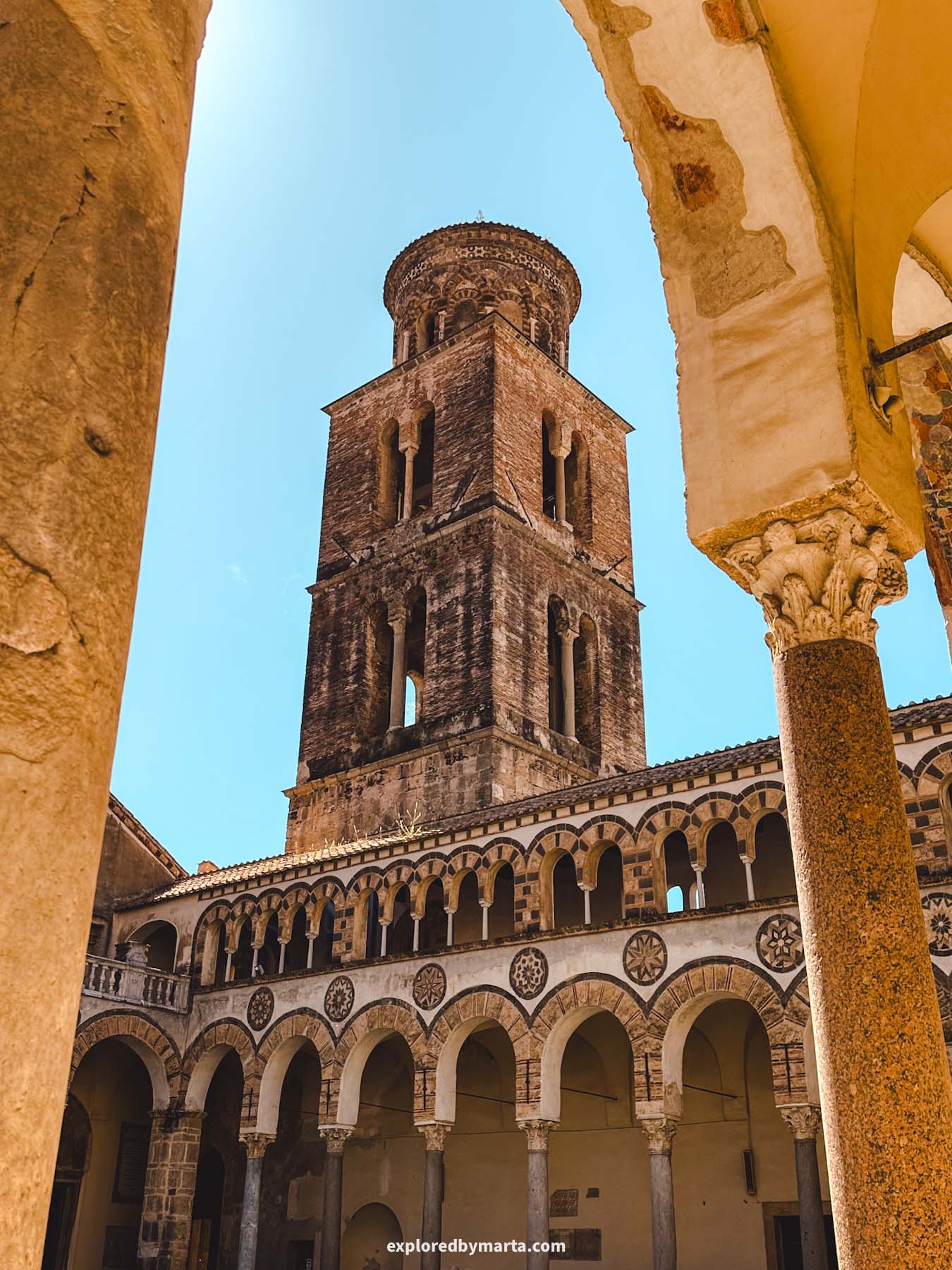
There are several ways to visit the cathedral. If you’re not interested in seeing the interior or the crypt, you can simply access the inner courtyard during opening hours for free — we took lots of beautiful photos here!
But if you’re curious to see the interior, especially its true marvel — the Crypt of Saint Matthew — then you’ll need to purchase an entrance ticket. I highly recommend visiting the crypt — it is lavishly decorated with gilded columns, frescoes, and marble.
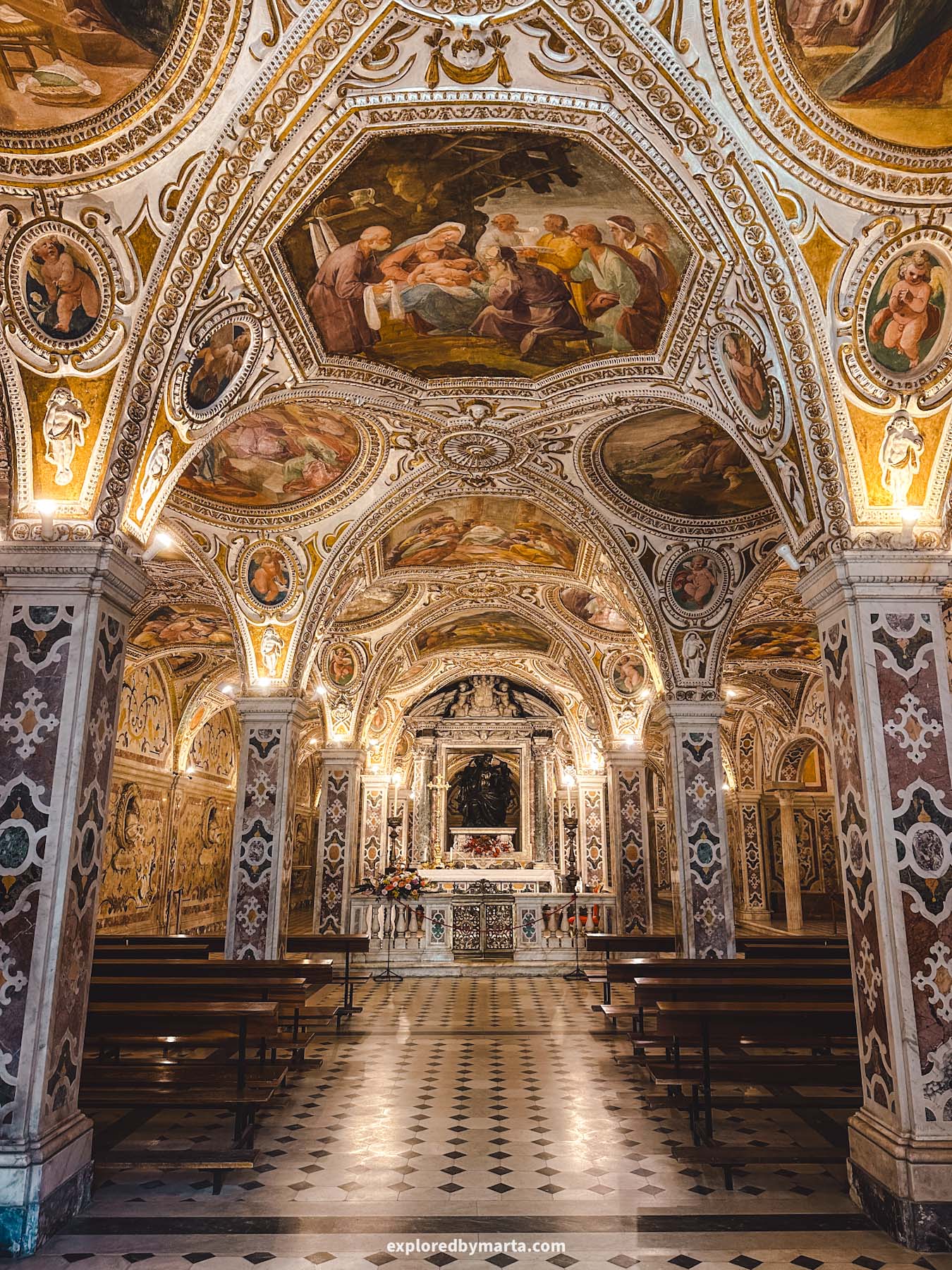
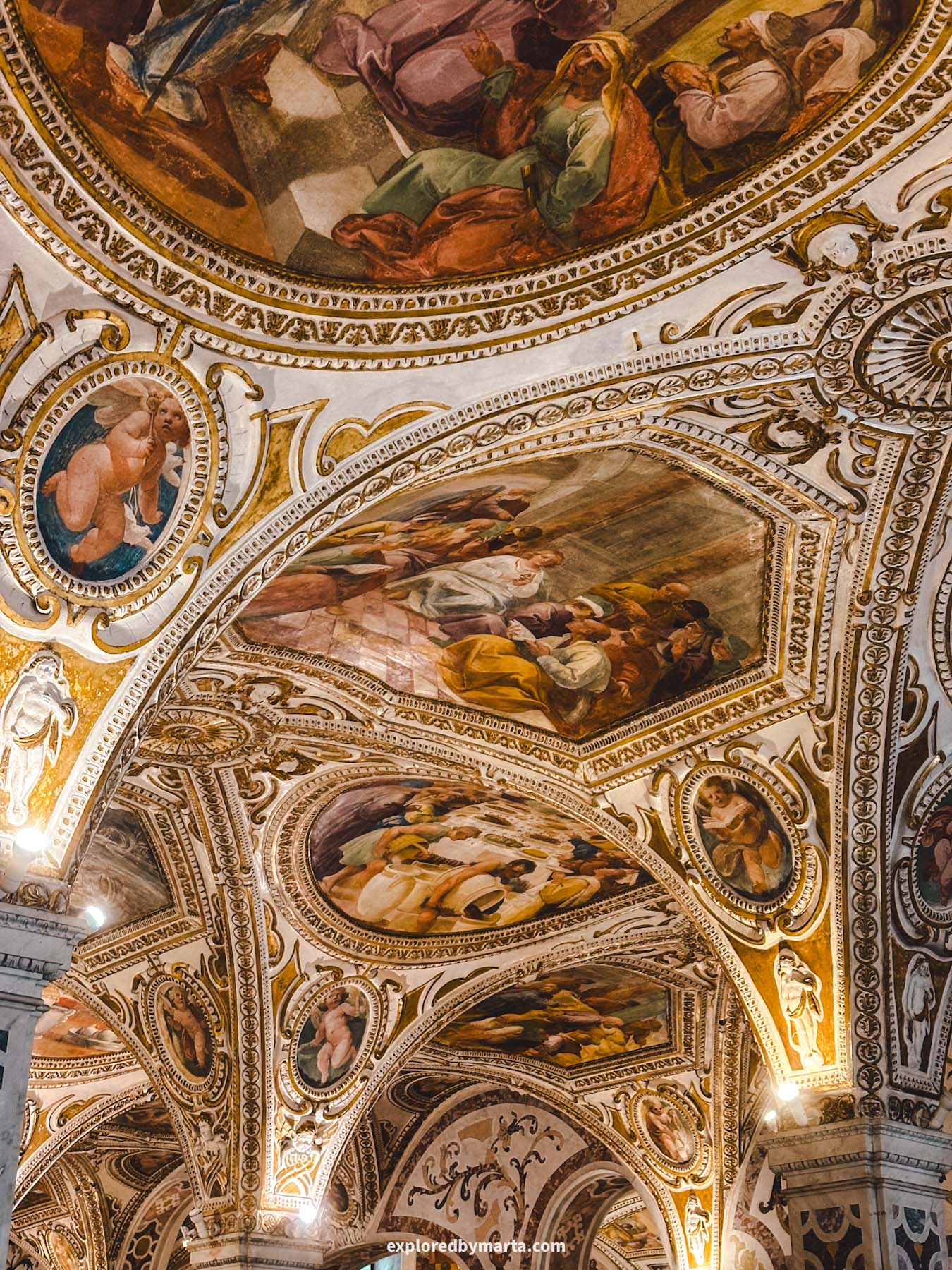
Saint Matthew’s crypt in Salerno is considered one of the most beautiful crypts in all of Italy!
We spent quite some time walking around the crypt, admiring its marble busts, gilded columns, and stunning frescoes. The crypt was renovated in the 17th century in Baroque style, and you can definitely tell they didn’t hold back!
There’s more to visiting the cathedral. At the ticket office, we were offered a full ticket that also included entry to Salerno’s Diocesan Museum of San Matteo (not very exciting) and entry to the Church of St. George (stunning!).
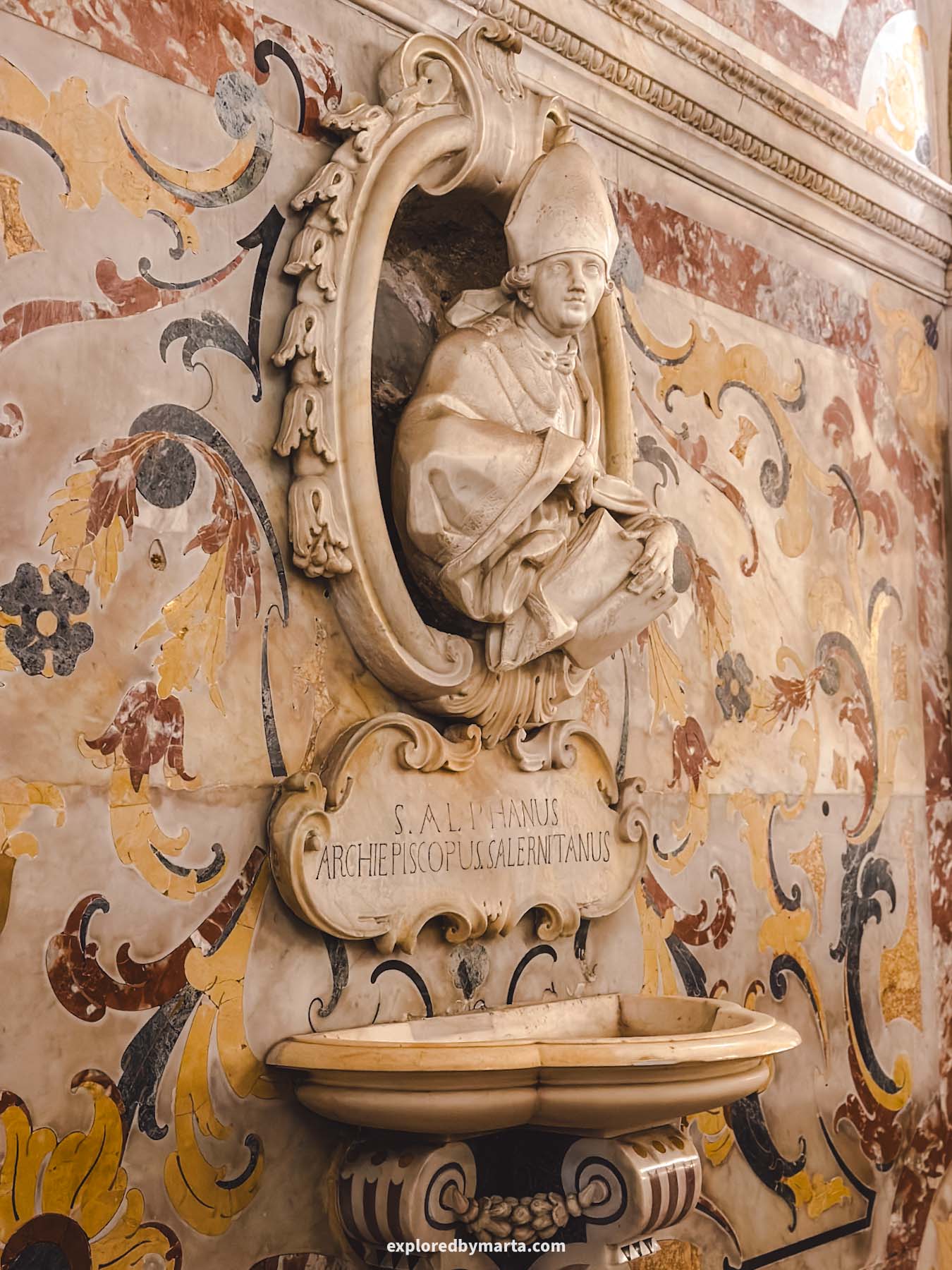
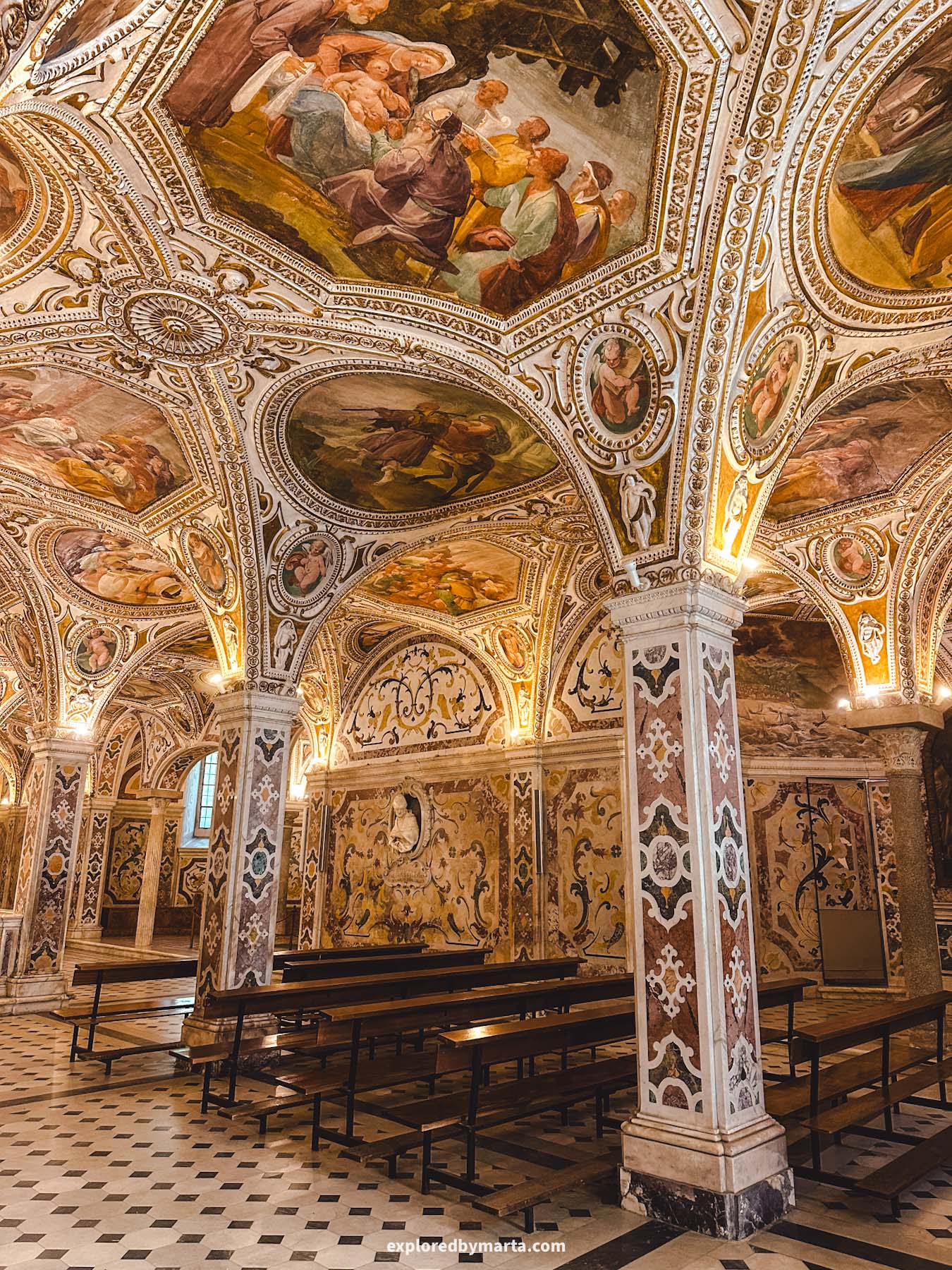
We visited both of these bonus spots. While the museum felt a bit dull (unless you’re really into religious artifacts and paintings), the Church of St. George was absolutely jaw-dropping. And it is located just a stone’s throw from the cathedral!
The Church of St. George completely surprised us with its jaw-dropping Baroque interior. Honestly, even the cathedral can’t compete with this absolute marvel!
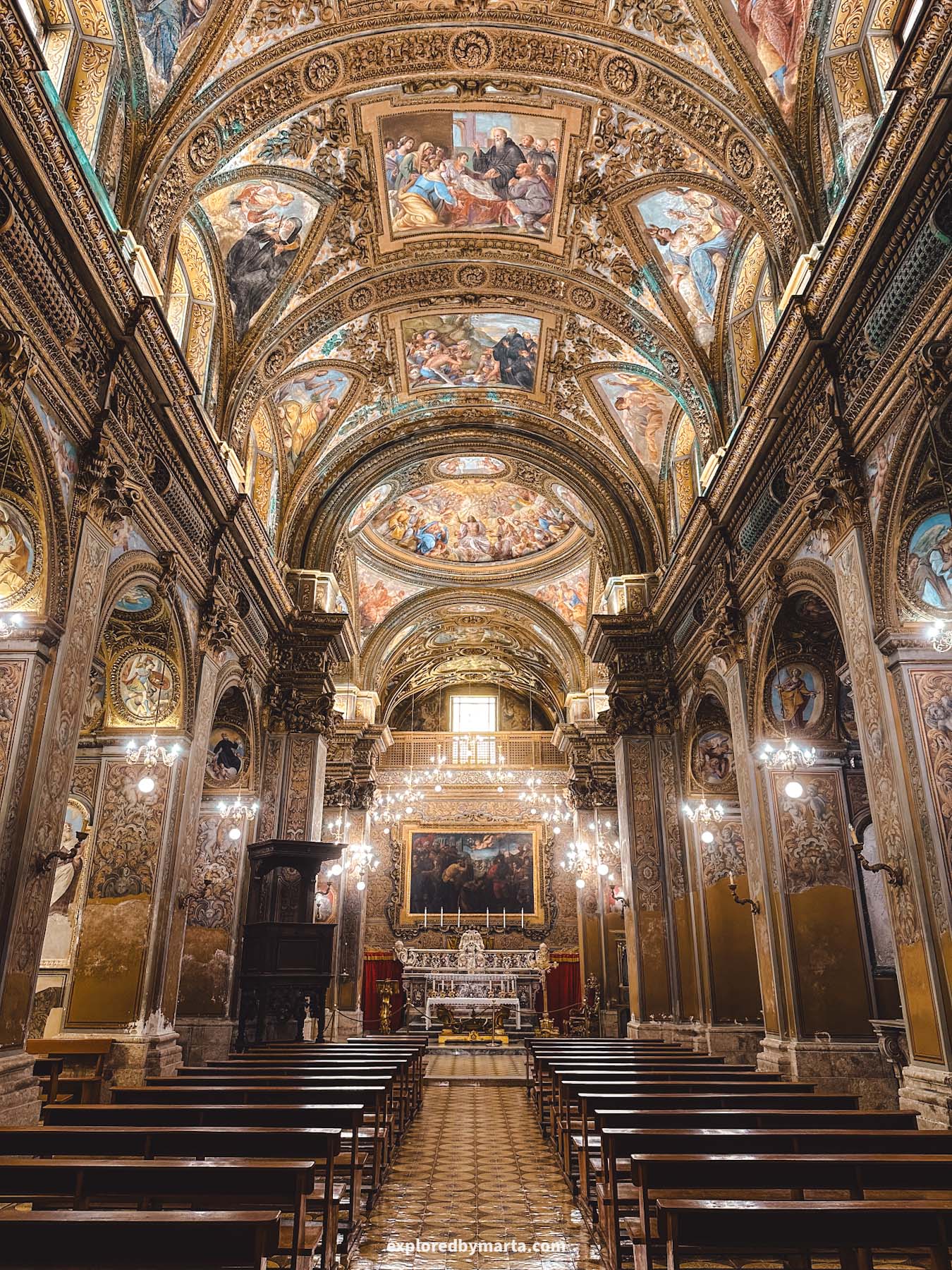
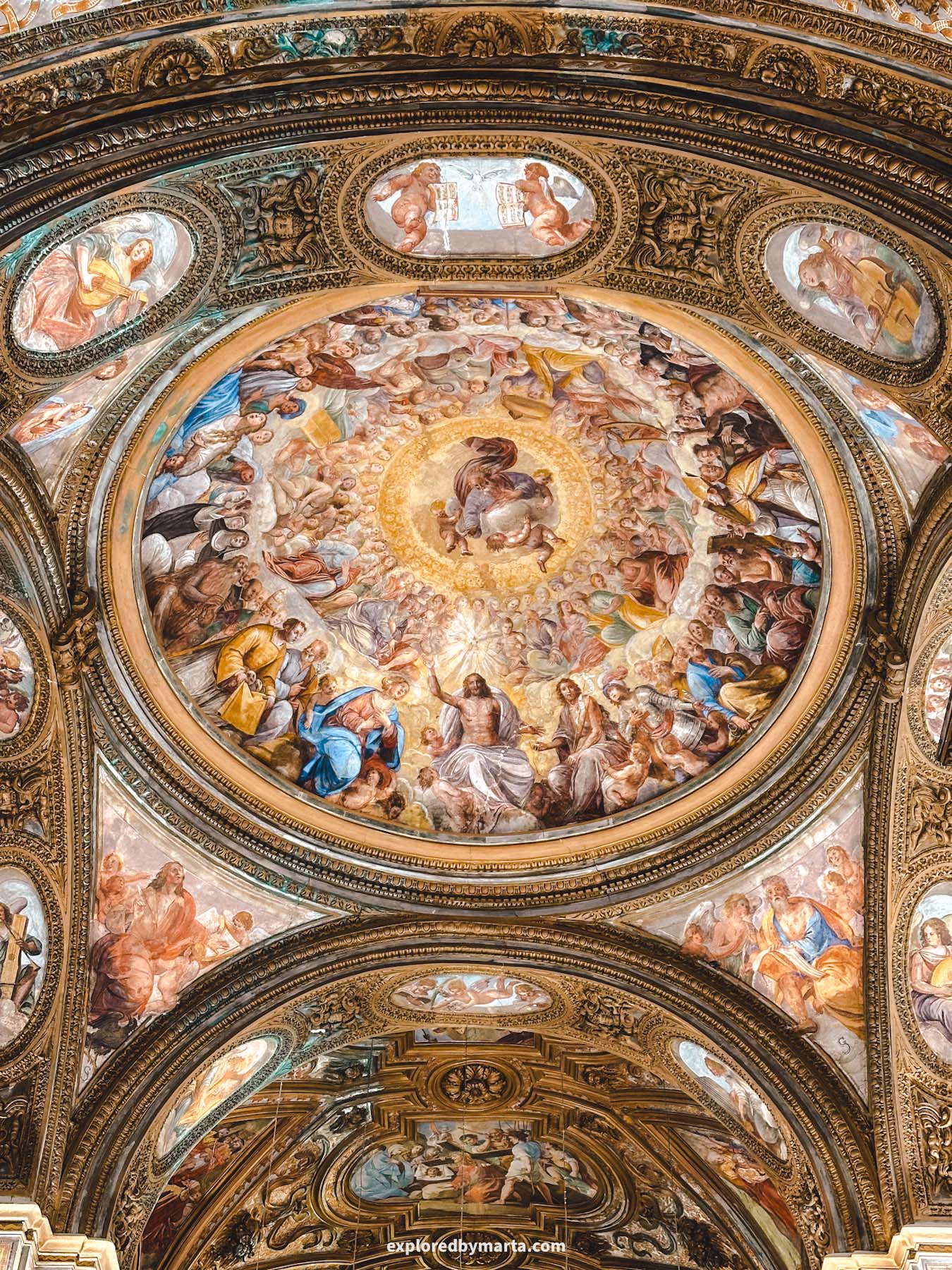
Imagine taking Saint Matthew’s crypt and making it much larger and even more elaborate — that’s the Church of St. George for you! Simply wow!
I had to sit down for a few minutes just to take it all in and truly comprehend the incredible craftsmanship that went into creating such a stunning building (although it isn’t very inviting from the outside!).

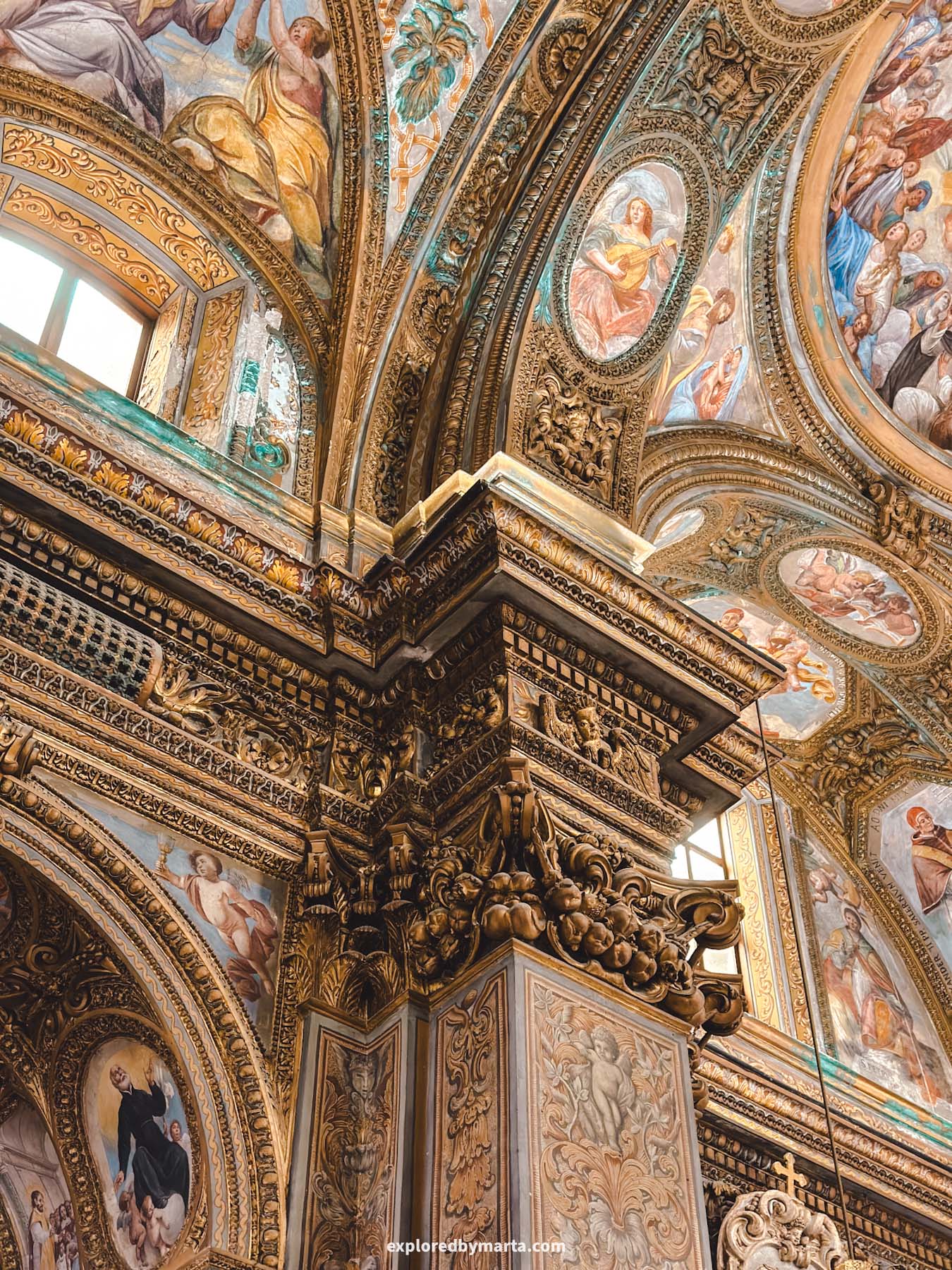
Originally a Benedictine monastery church, it was built in the early Middle Ages, but much of its magnificent Baroque splendor dates back to the 17th century.
I highly recommend spending those few extra euros to upgrade to the full ticket and setting aside some time to peek into this masterpiece. It’s so worth it!
I’ve visited countless churches throughout my travels in countries like Spain, Portugal, and Italy, and not many religious buildings still take my breath away — but this one definitely did!
Location: Duomo di Salerno – Church of St. George – Diocesan Museum
4. See panoramic views of Salerno from above
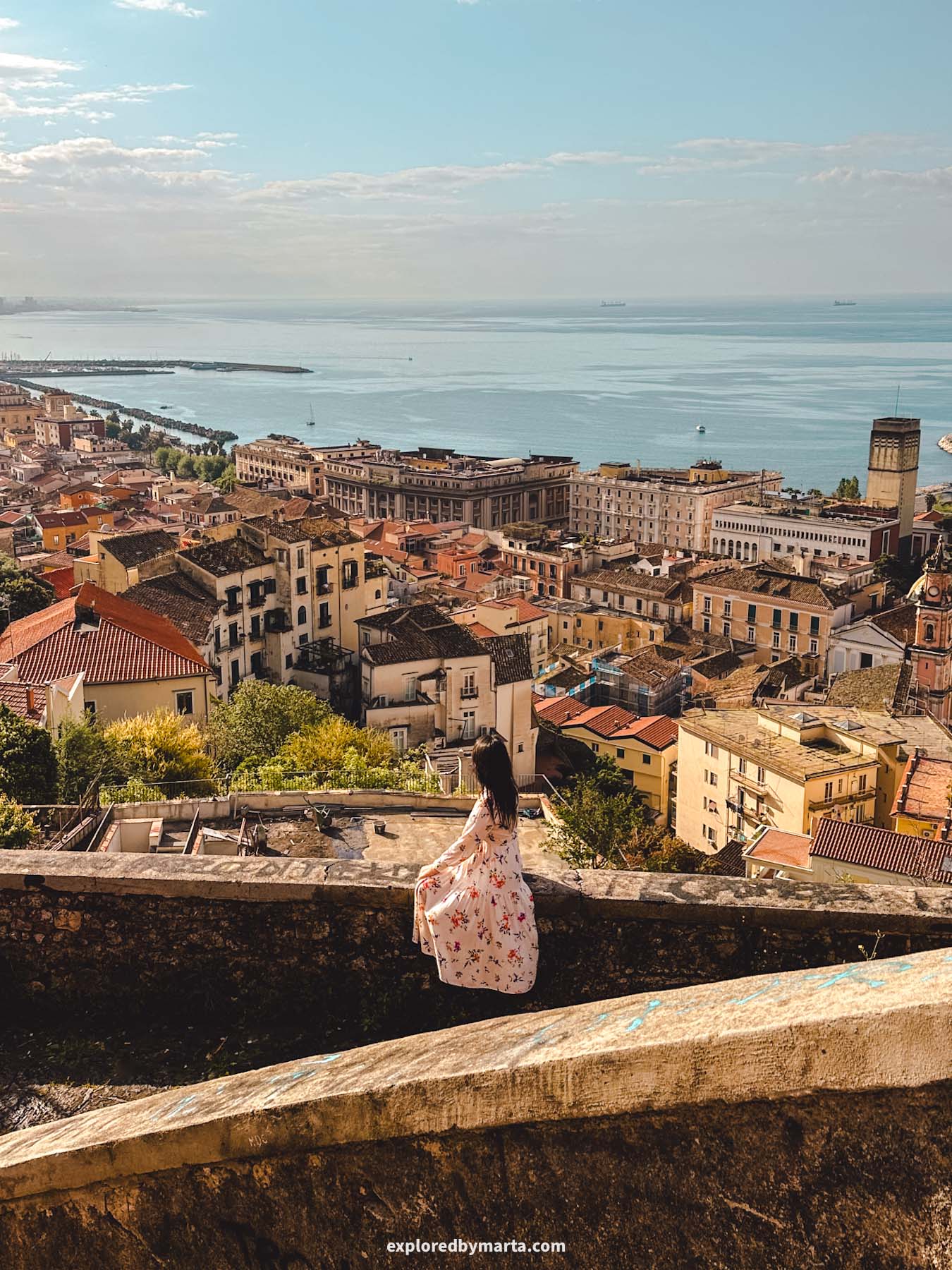
Salerno is located at the foot of a mountain range—the same one that runs along the Amalfi Coast—so there are some fantastic spots where you can have great views of the city from above.
Seeing places from above has always been one of my favorite things to do in a new city, and Salerno was no exception. It gives you a fresh perspective on what the place is like and how it was built.
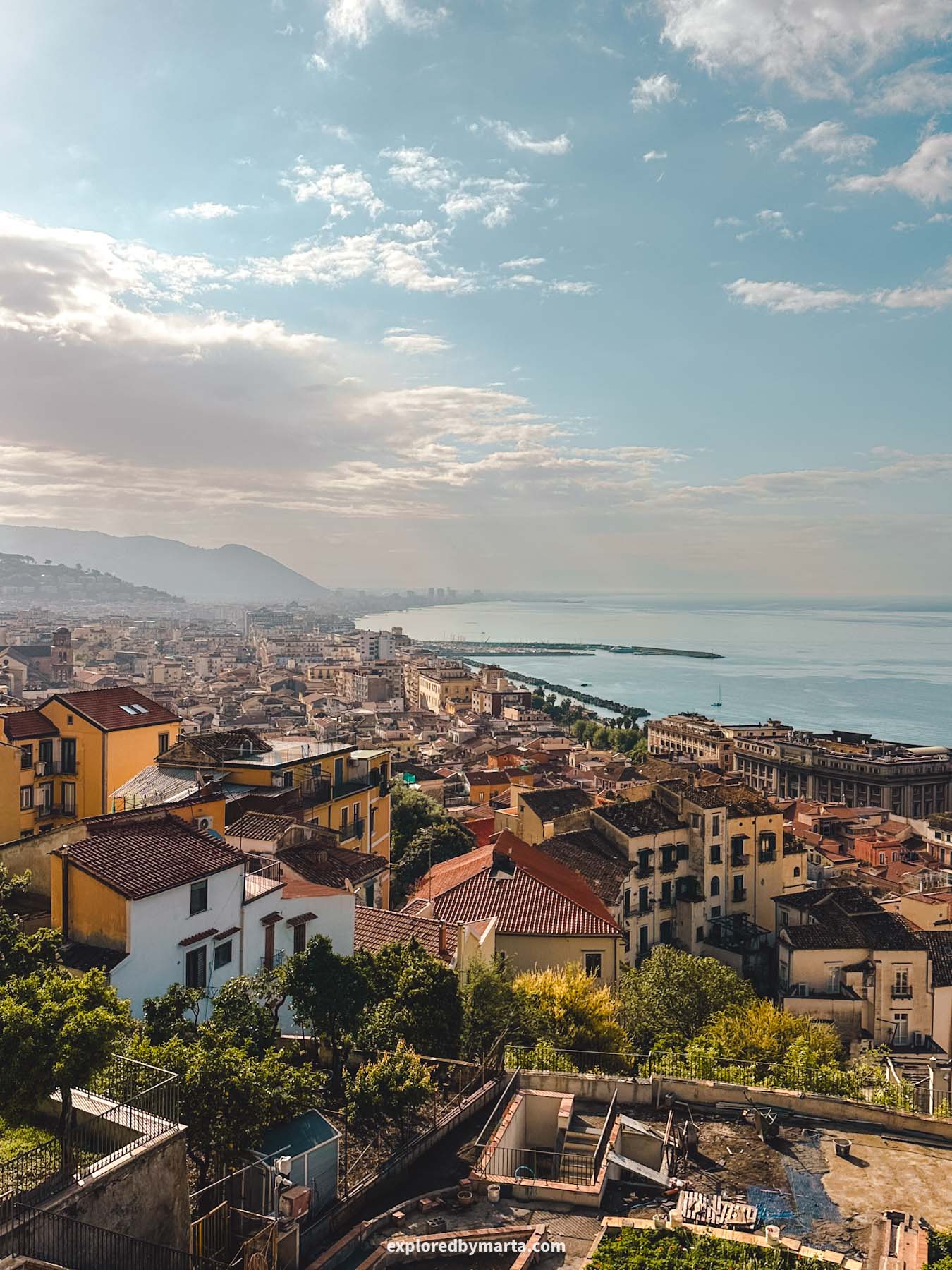
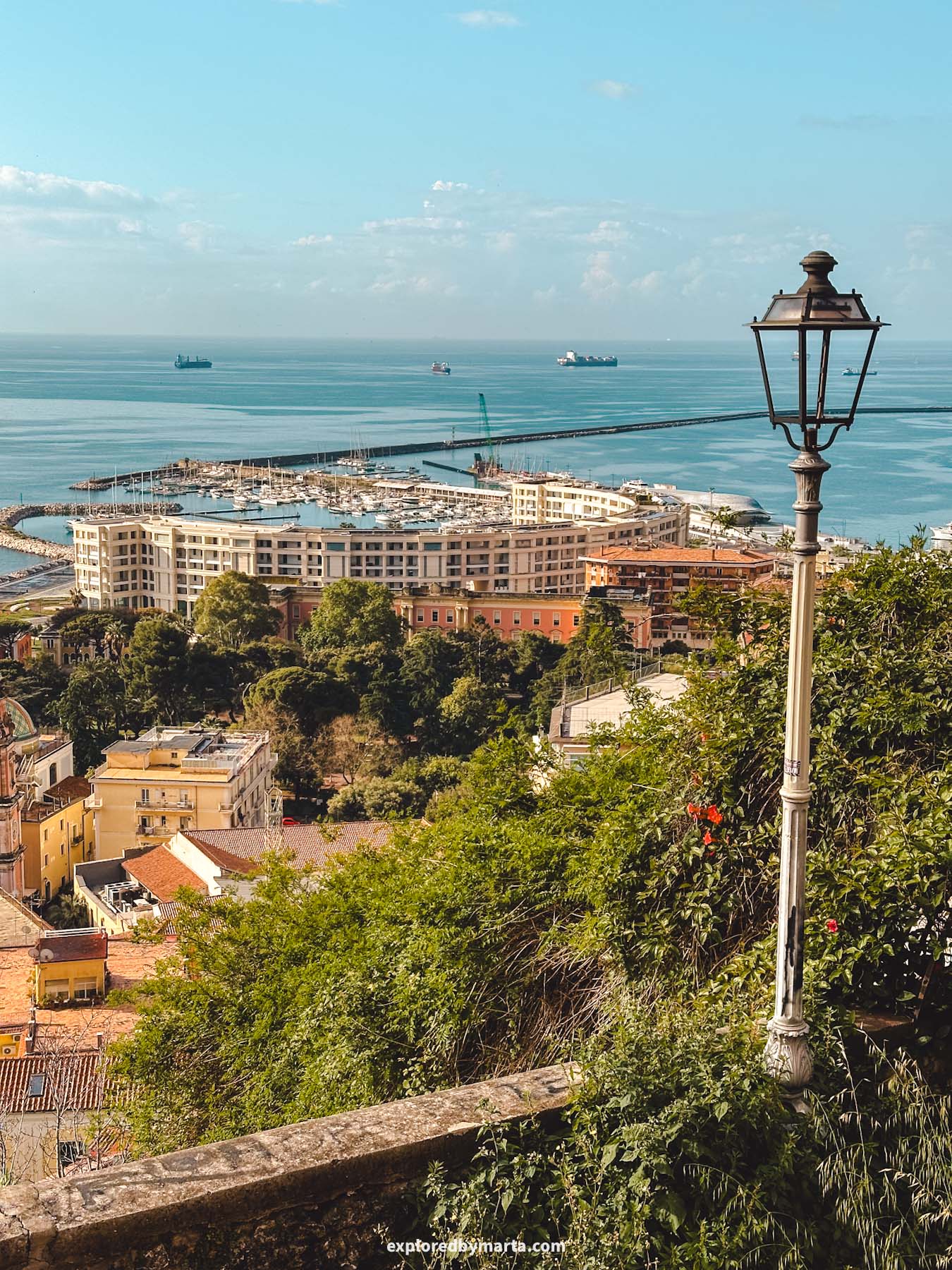
The most panoramic views of Salerno, and with the easiest access, are located on the west side of the city. Reaching these viewpoints does require climbing some stairs, just like everywhere on the Amalfi Coast.
We found a couple of viewpoints on Google Maps (locations below) and decided to stretch our legs after those gelatos, so we climbed up. The views turned out to be stunning! Seeing the city from above is definitely one of the top things to do in Salerno!
Location: Punto Panoramico di Salerno – Punto Panoramico
5. Visit Salerno’s iconic murals

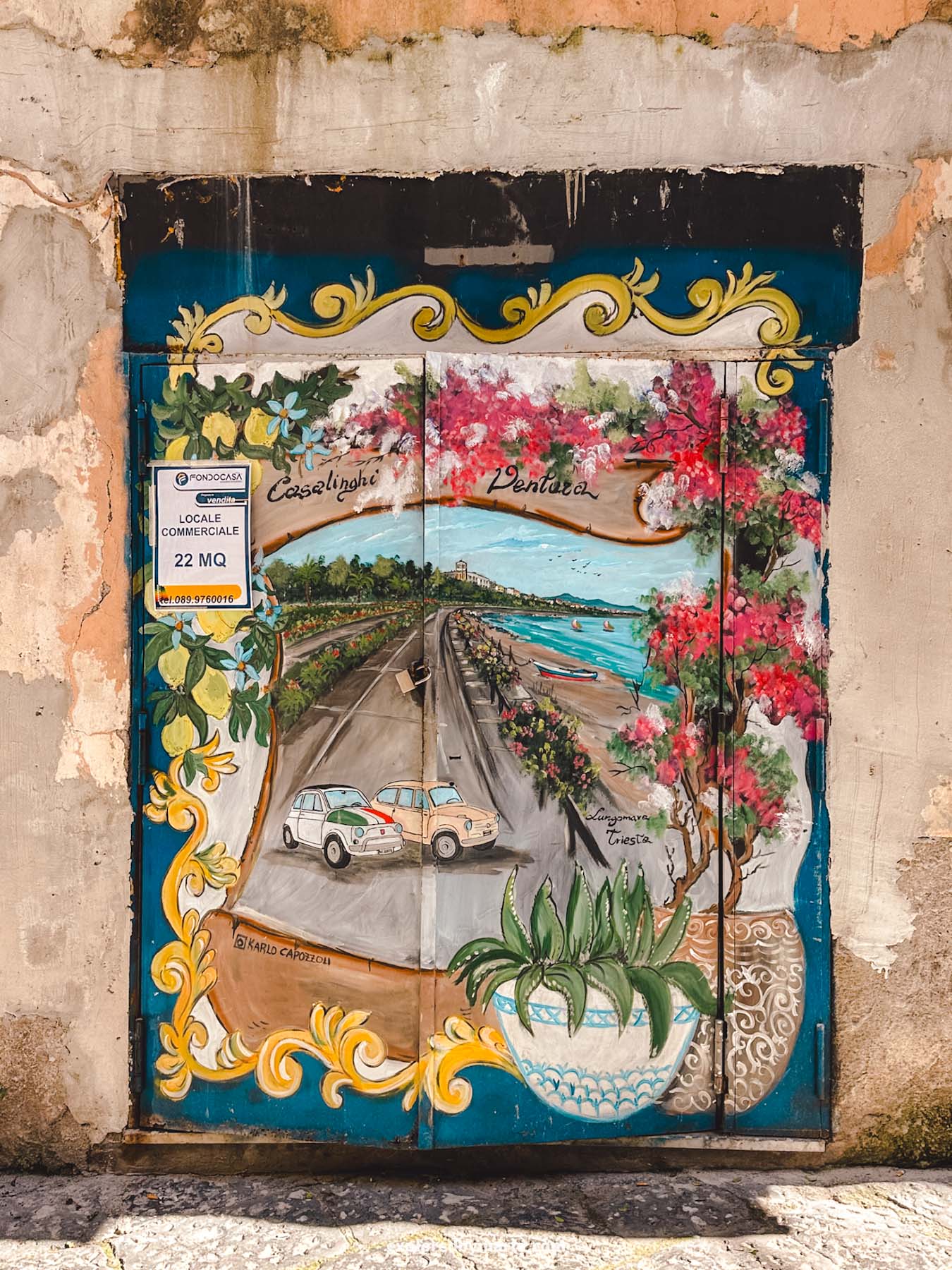
Salerno is known for its love of art, including street art. There are special neighborhoods in Salerno’s historic center where you’ll find buildings, walls, and squares covered in colorful murals and poetic texts.
Exploring these beautiful murals in the streets of Salerno was one of my favorite things to do in Salerno. We wandered through much of the Old Town (Centro Storico) and found three standout spots with the most striking murals, which I highly recommend you visit.


Let’s start with my favorite: Via Masuccio Salernitano, a charming street in the heart of the Old Town. I especially loved that many murals here depict iconic scenes from the Amalfi Coast—lemons, scenic cliffs, the sea, and more.
The second beautiful spot is a short tunnel on Vicolo S. Maria de Domno, which connects Via dei Mercanti with Piazza S. Agostino. The murals here are more delicate, with fine details painted as if with a tiny brush. So beautiful!
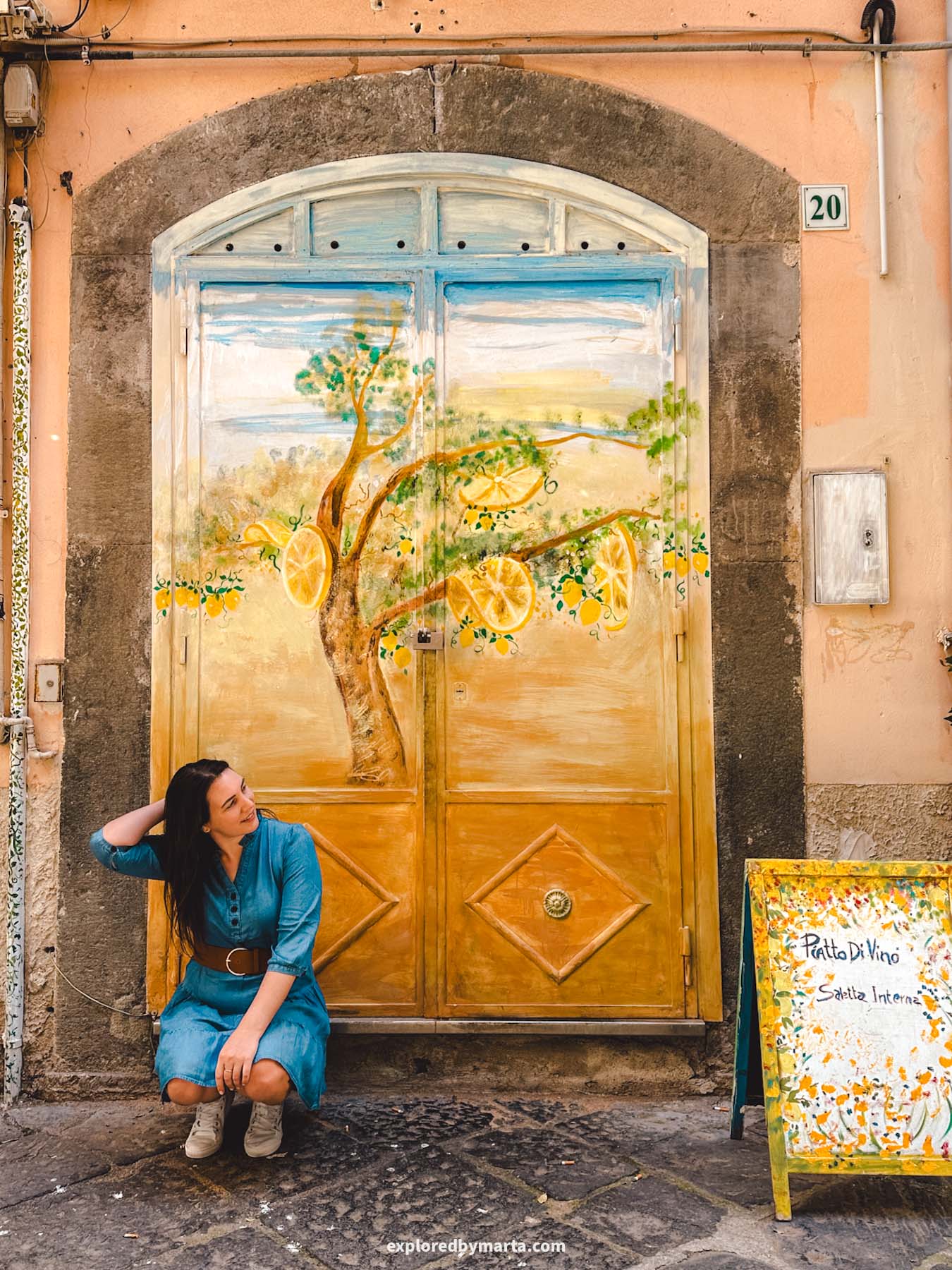
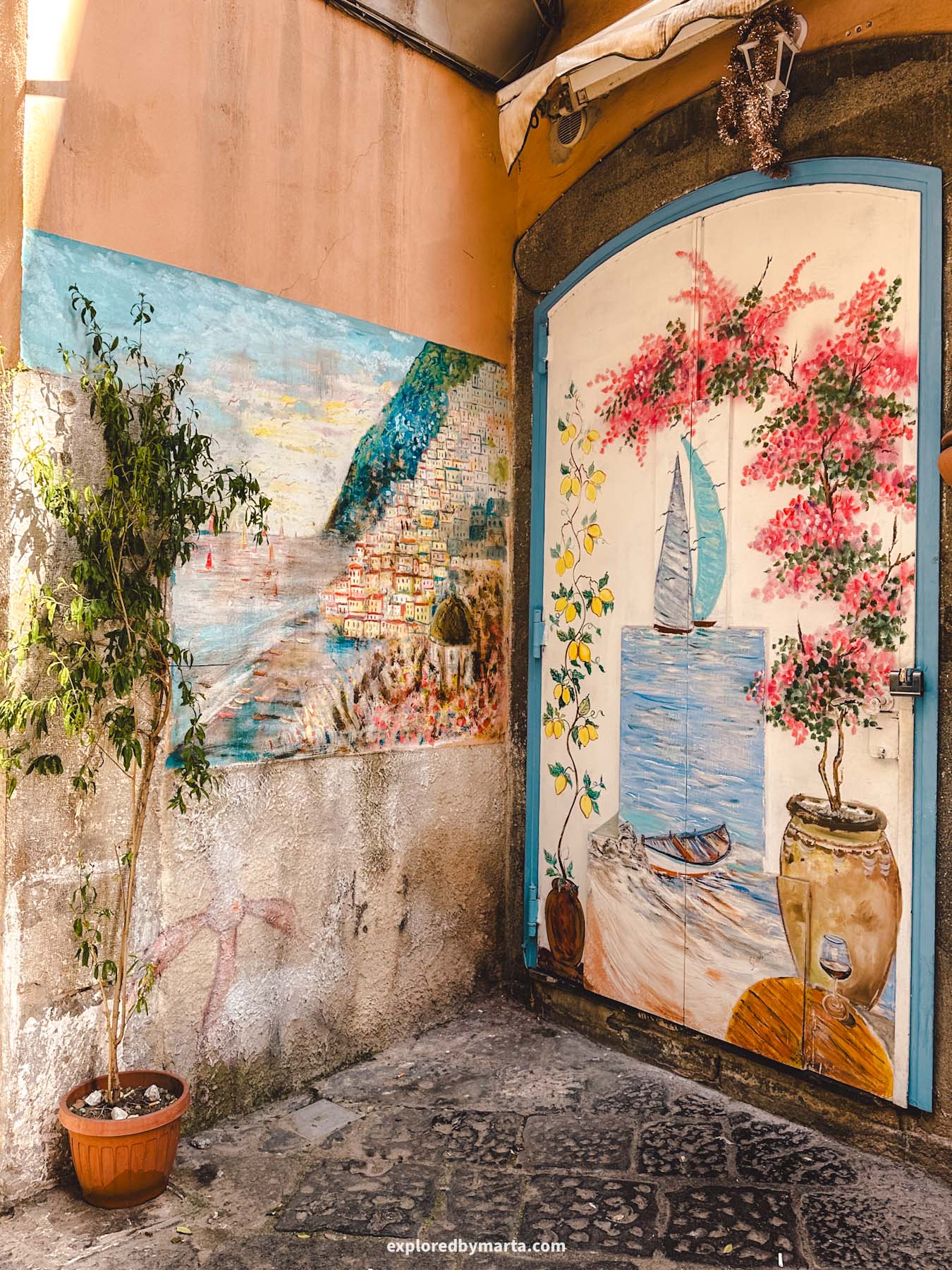
The third area is part of a project called Muri d’Autore (Walls of the Authors), located in the La Fornelle District, the oldest part of Salerno.
This street art initiative dates back to the 1980s, when local poets and artists came together to blend poetry with mural painting and turn the neighborhood into an open-air art gallery.
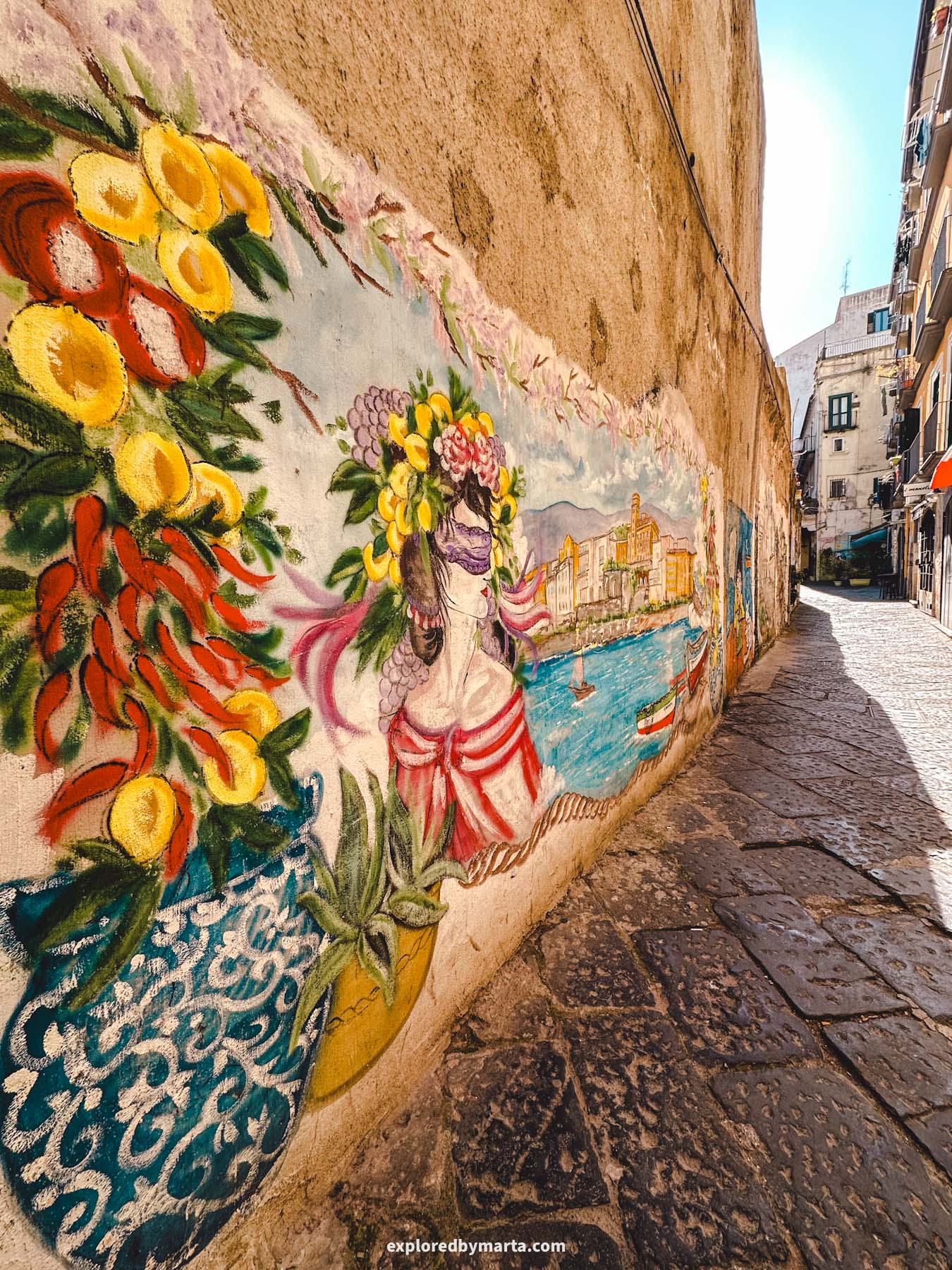
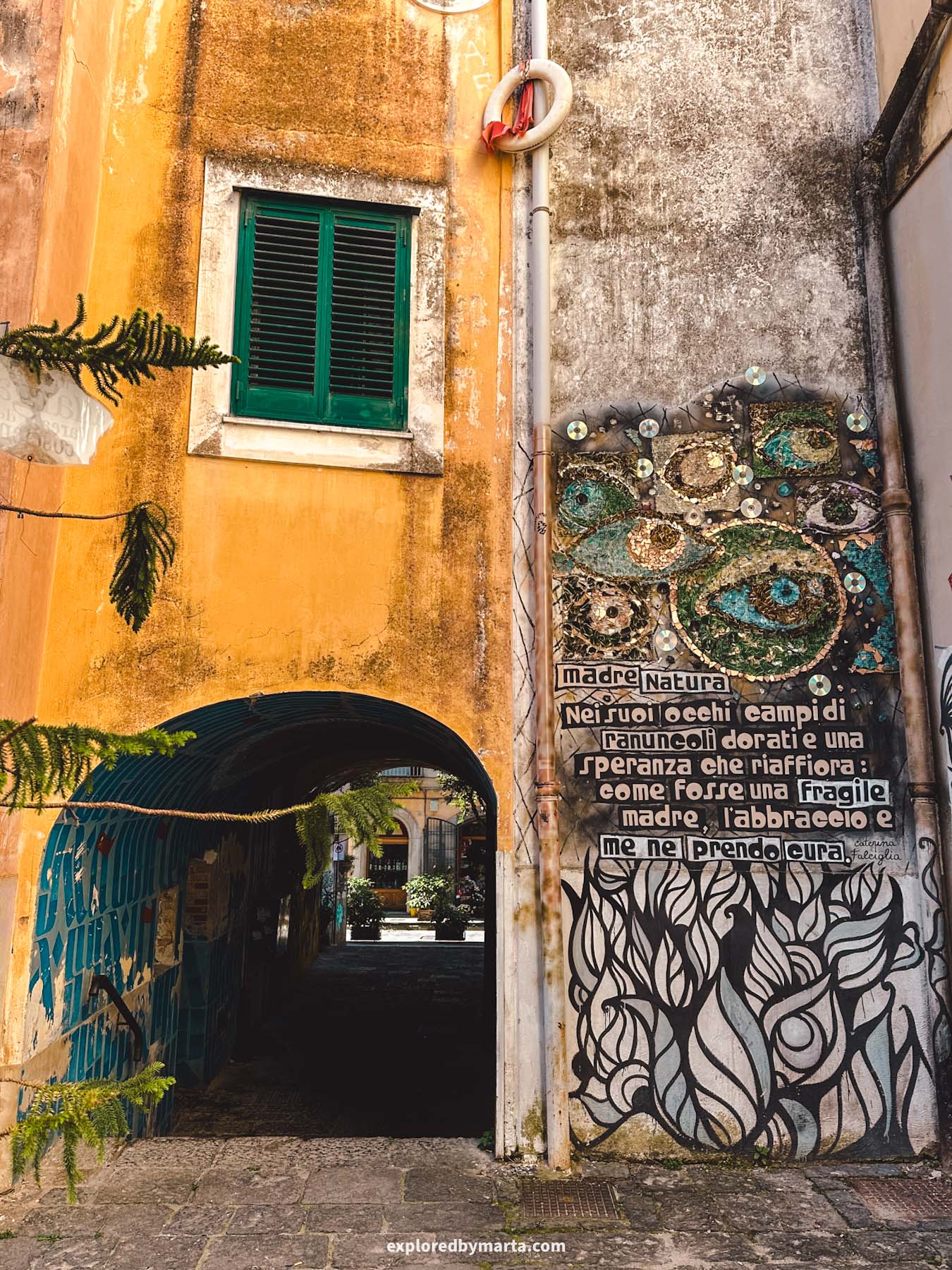
Many murals in La Fornelle are now a bit faded, so I hope Salerno’s artists continue preserving and restoring them.
I loved exploring Salerno’s street art. You don’t need to make a special trip just for these murals, but they’re definitely worth visiting if you can take a small detour while heading to restaurants or other landmarks in the city.
Location: Murales Masuccio Salernitano – Vicolo S Maria de Domno – Muri d’Autore
6. Find the best pizza in Salerno

Pizza is Italy, and Italy is pizza. We’re big pizza lovers—and we’re especially big fans of Neapolitan pizza! So, wherever we traveled around the Amalfi Coast, we made it a mission to find the best pizza spots, including in Salerno.
After a bit of research, it came down to four excellent pizzerias in Salerno: Pizzeria Giagiu with its unique gourmet pizzas, Saporito with its traditional and classical Neapolitan pizzas, Pizzà Identità Gastronomiche contemporary pizzeria, and La Smorfia (try their fried pizza!).


Each pizzeria offers something special, but you really can’t go wrong with any of them. Pizzeria Giagiu is perfect for a special occasion or when you’re in the mood for something bold—think pizza with coffee foam or one that’s lit on fire to melt the cheese (yes, really!).
If you’re looking for classical and traditional taste, Saporito and La Smorfia are great options. Local ingredients, classical Neapolitan pizzas, and good prices is what you’ll get. However, Pizzà Identità Gastronomiche is a blend of traditional taste with modern execution.
I can’t possibly pick my favorite, because good pizza is good pizza. But I would probably go to Pizzeria Giagiu again if I had to. Their approach to pizzas is truly unique. I’ll forever remember how they lit my husband’s pizza on fire!
Location: Pizzeria Giagiu – Saporito – Pizzà Identità Gastronomiche – La Smorfia
7. Take a walk to Piazza della Libertà
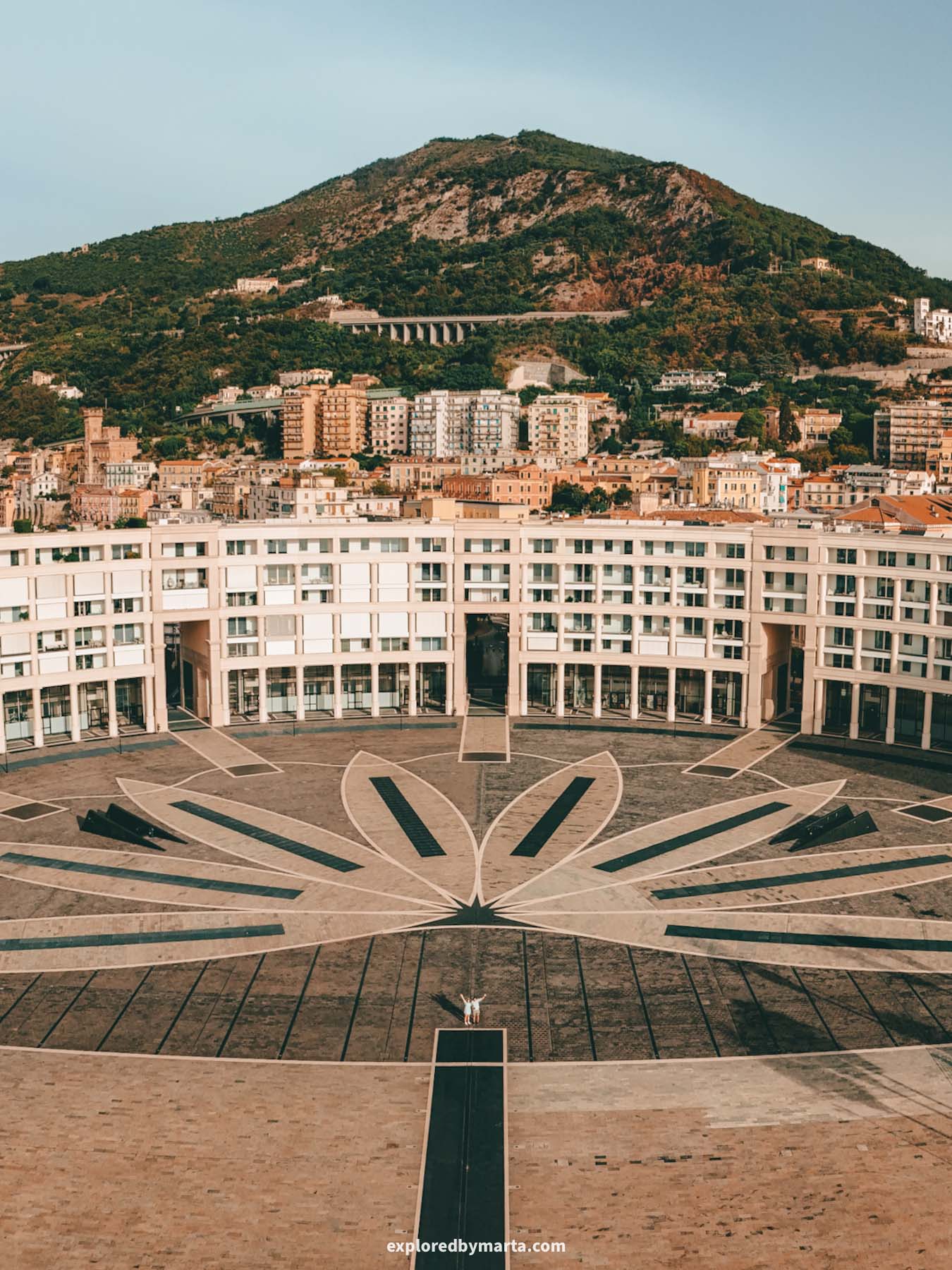
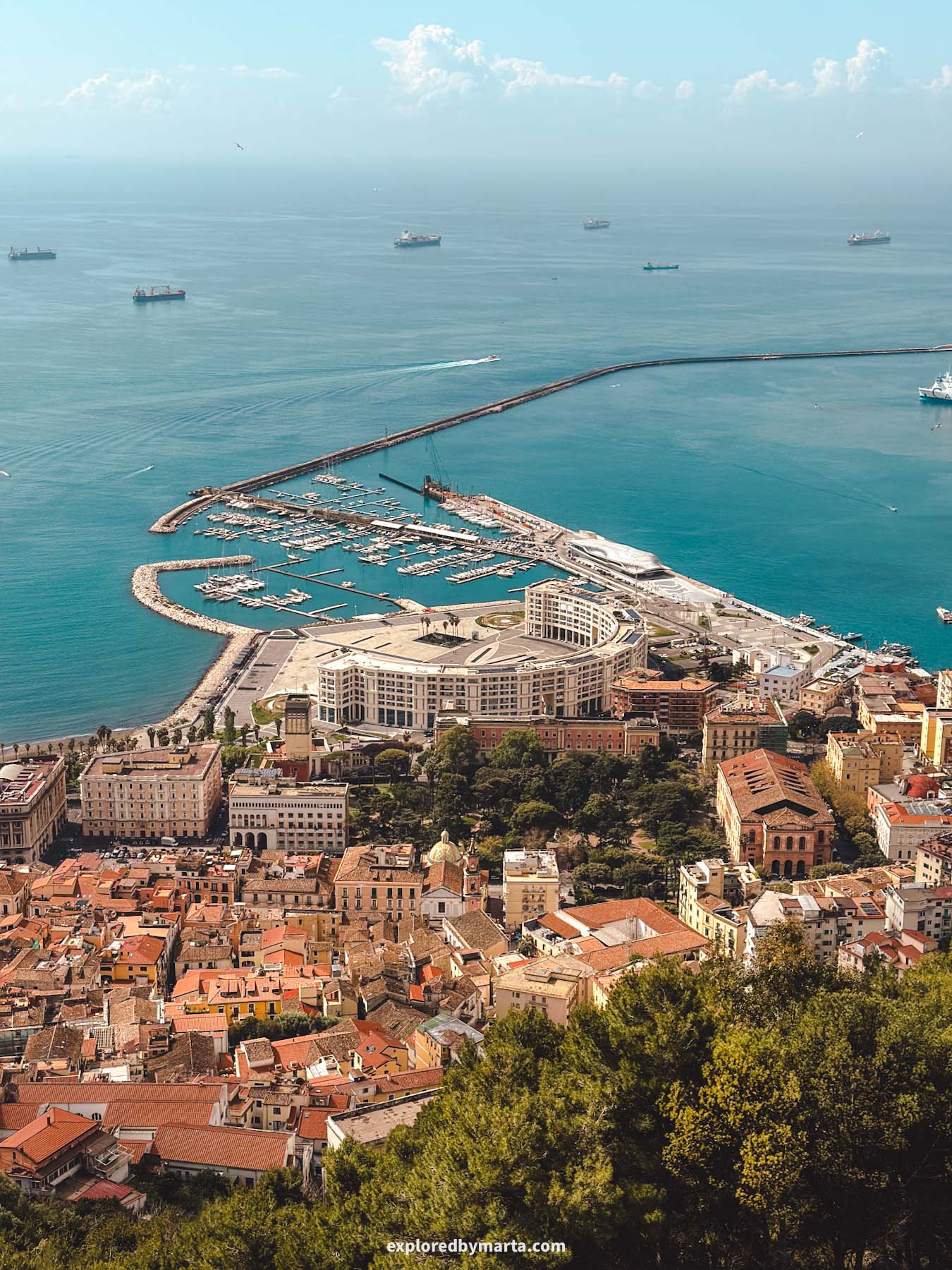
From pizza to piazza! What you need after eating a good Neapolitan pizza is a lazy walk! And Piazza della Libertà is the ideal spot for a leisurely stroll.
Piazza della Libertà, or Liberty Square, is known as the largest seafront square in Europe. It’s where locals and visitors come to walk, jog, or simply relax by the sea.
The square sits about 5 meters above sea level and offers beautiful views of the Salerno ferry port, marina, the Gulf of Salerno, and the city’s scenic seafront promenade.
If you’re looking for a chill spot to enjoy a cocktail by the water, this is the place to be. There are several bars located just below the square, along the promenade at sea level.
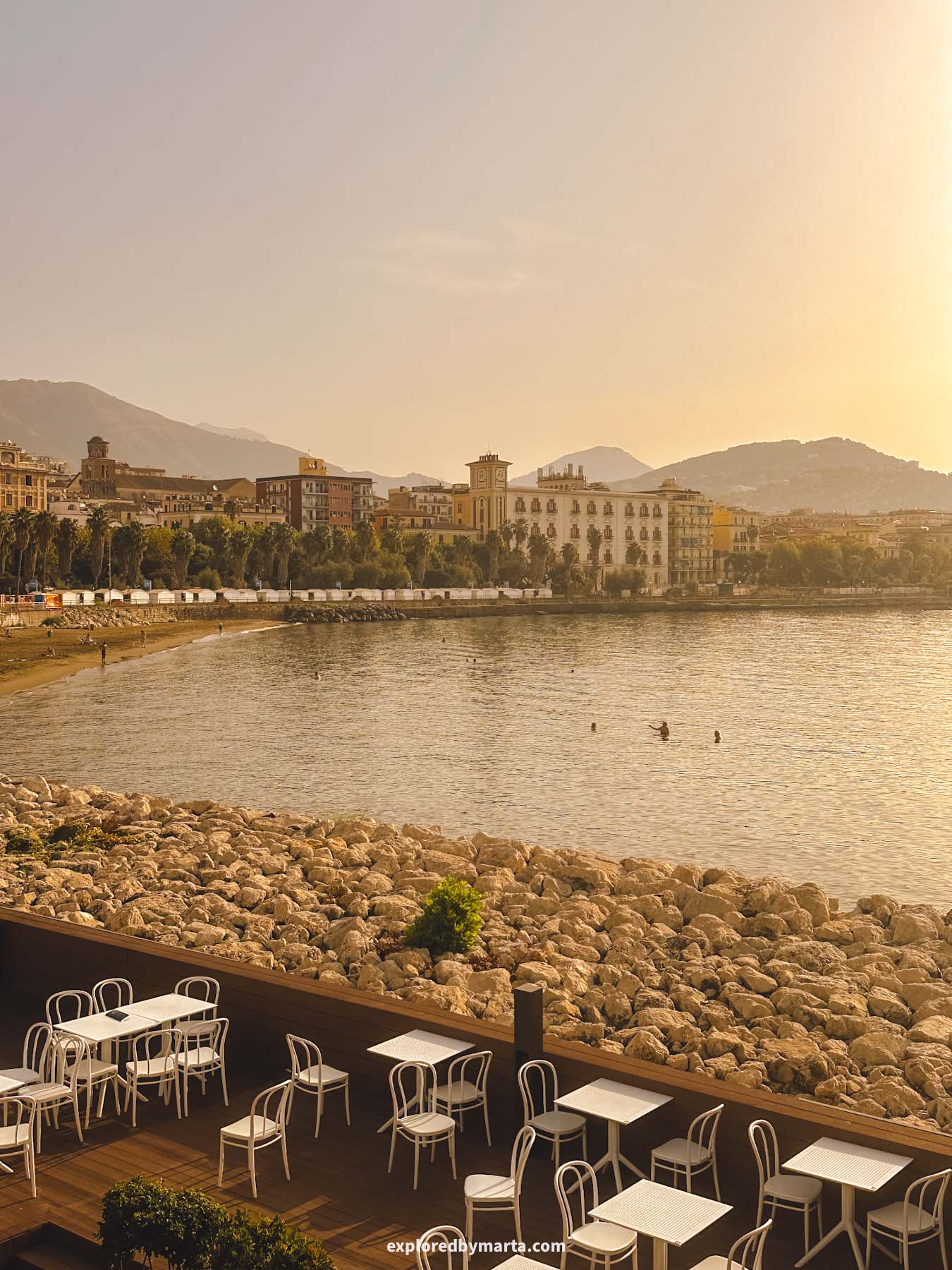
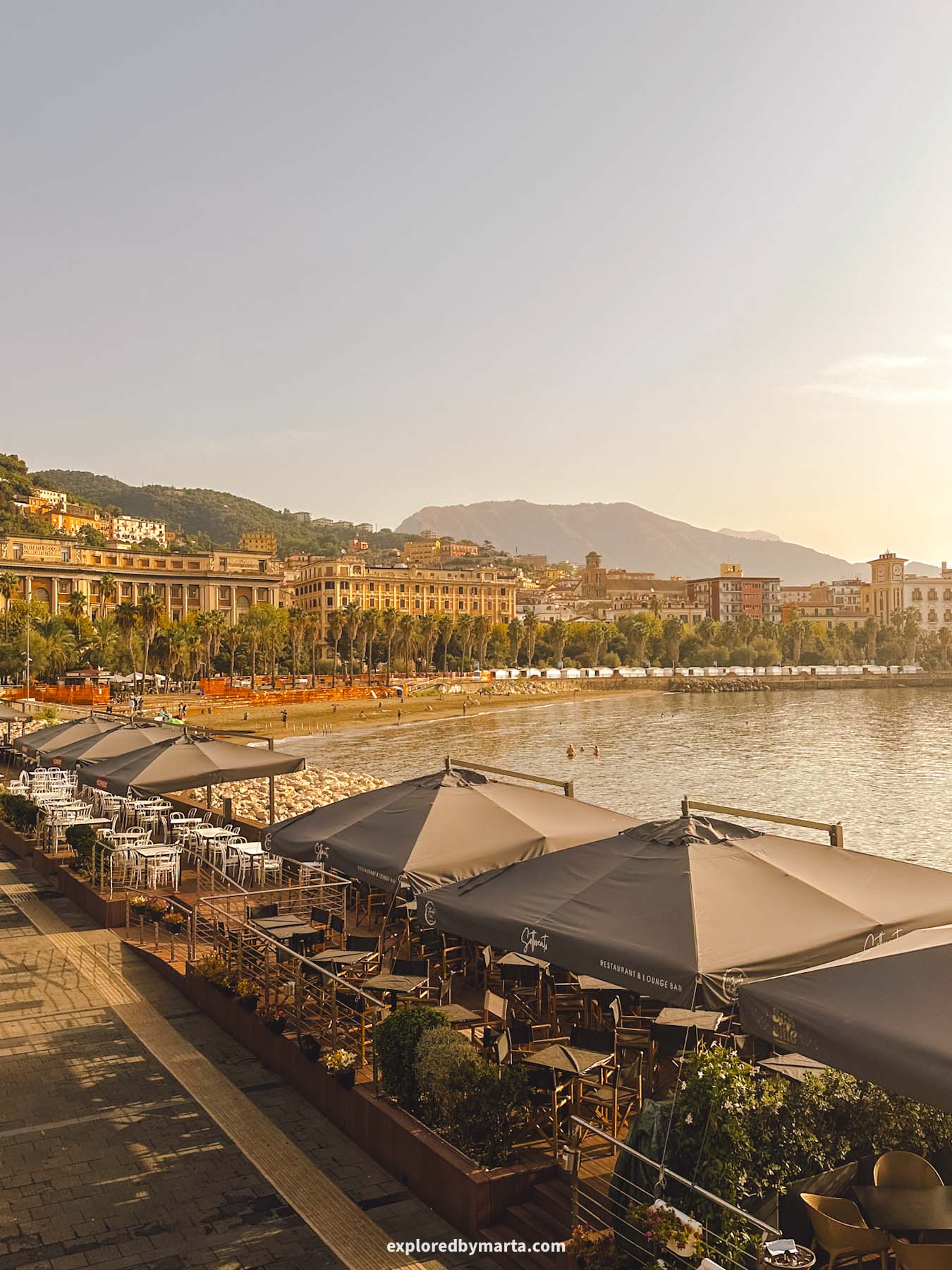
Thanks to its size—28,000 square meters—the area around the square is also a popular venue for local events and public gatherings.
But I don’t envy people living in The Crescent building, which hugs the square. It seems like a nice place to live, but not during public events.
We found ourselves returning here often because there’s a large parking lot right underneath the square. Since we weren’t staying in the city center, this was the most convenient place to park our rental car and start exploring Salerno.
Everything in this part of Italy is so narrow and compact, so every time I walked through this square, I was taken aback by how huge it is. Like—how did they manage to create such a massive open space… for nothing!?
Location: Piazza della Libertà
8. Climb up to Salerno’s scenic botanical gardens
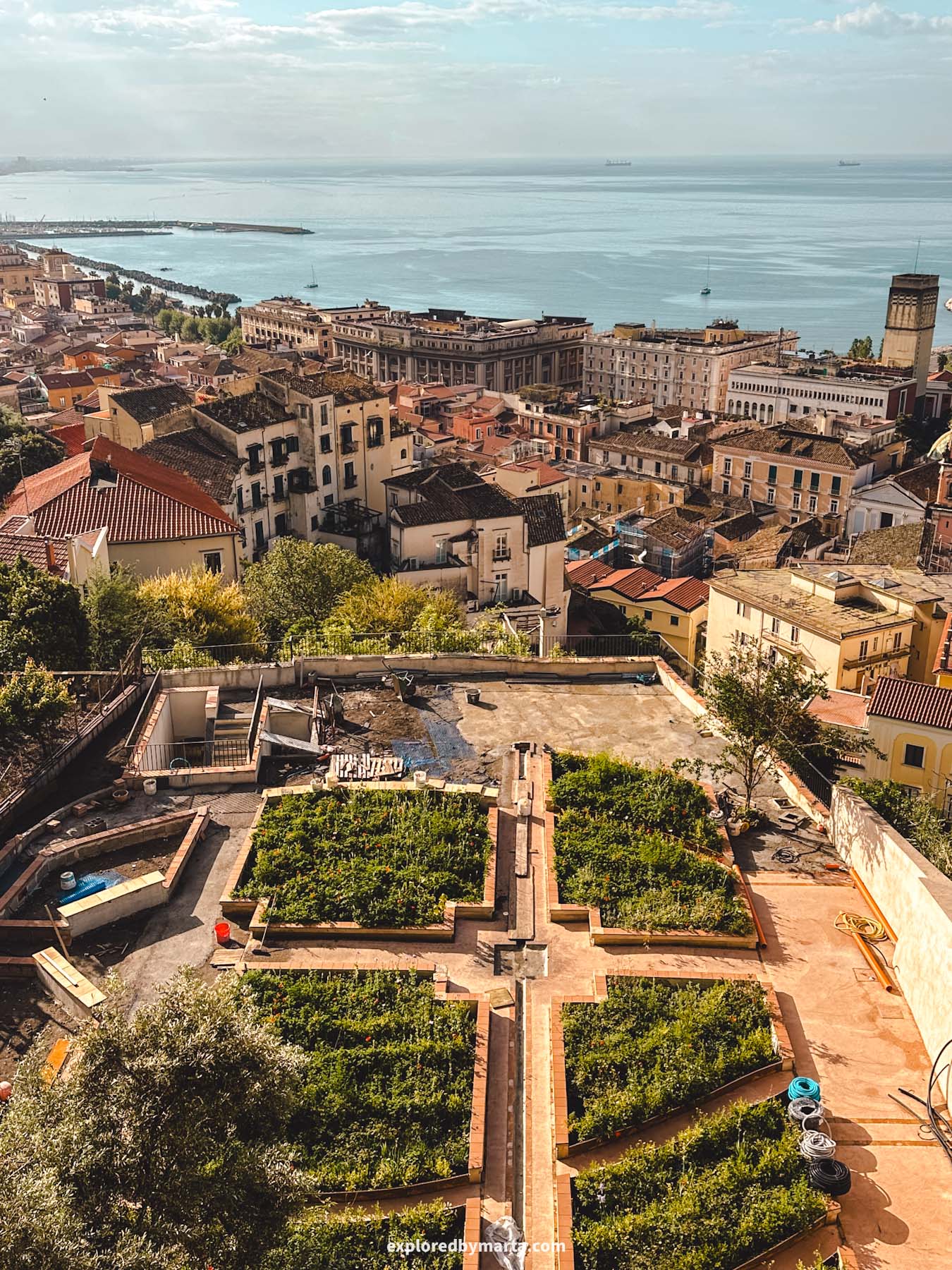
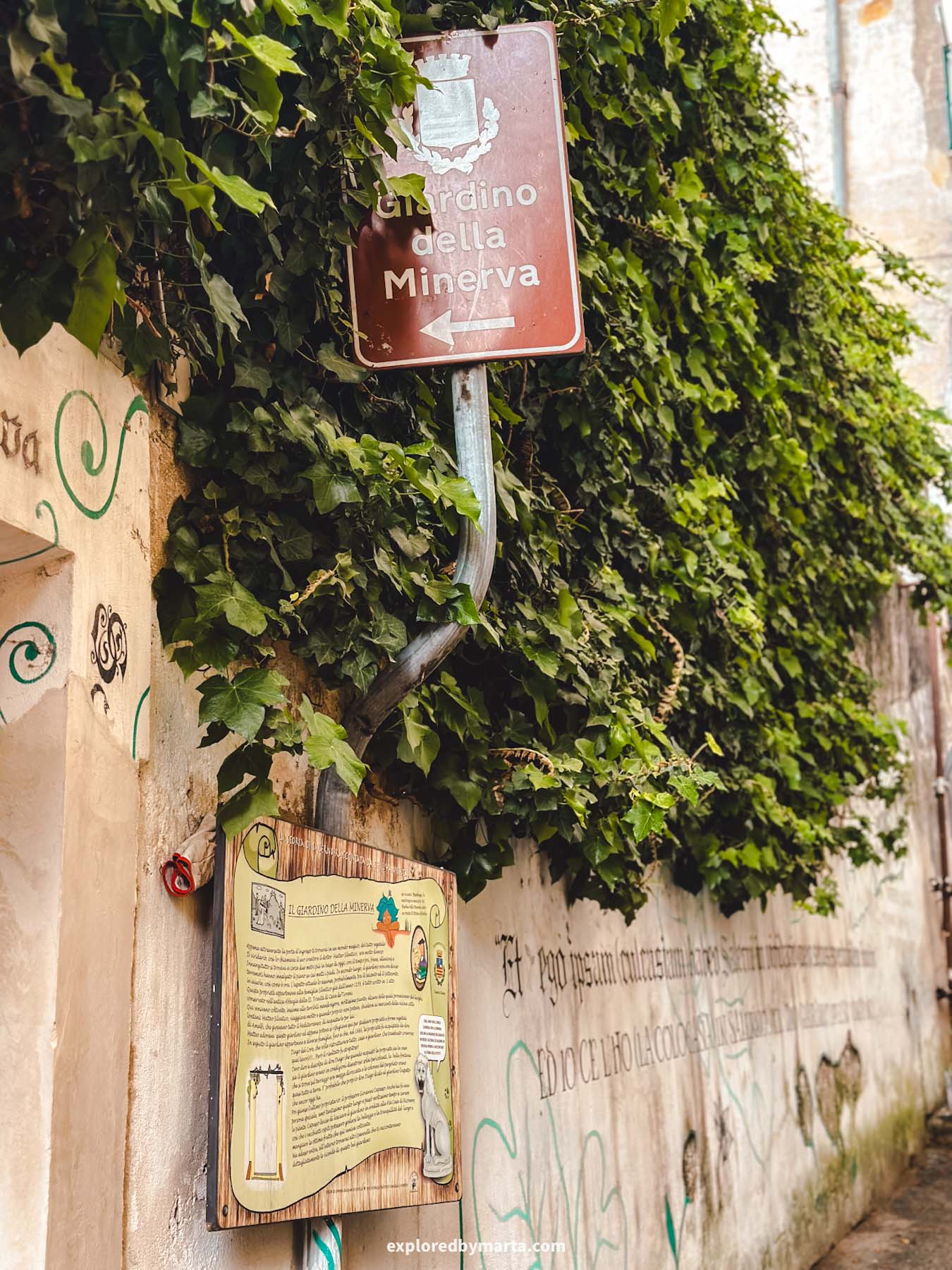
Giardino della Minerva is the name of Salerno’s centuries-old botanical gardens, hanging on a cliffside in the Old Town of Salerno.
The garden is known as one of Europe’s earliest botanical gardens, as it dates back to the 14th century. It served as an open-air classroom where students from the local medical school could learn about medicinal plants.
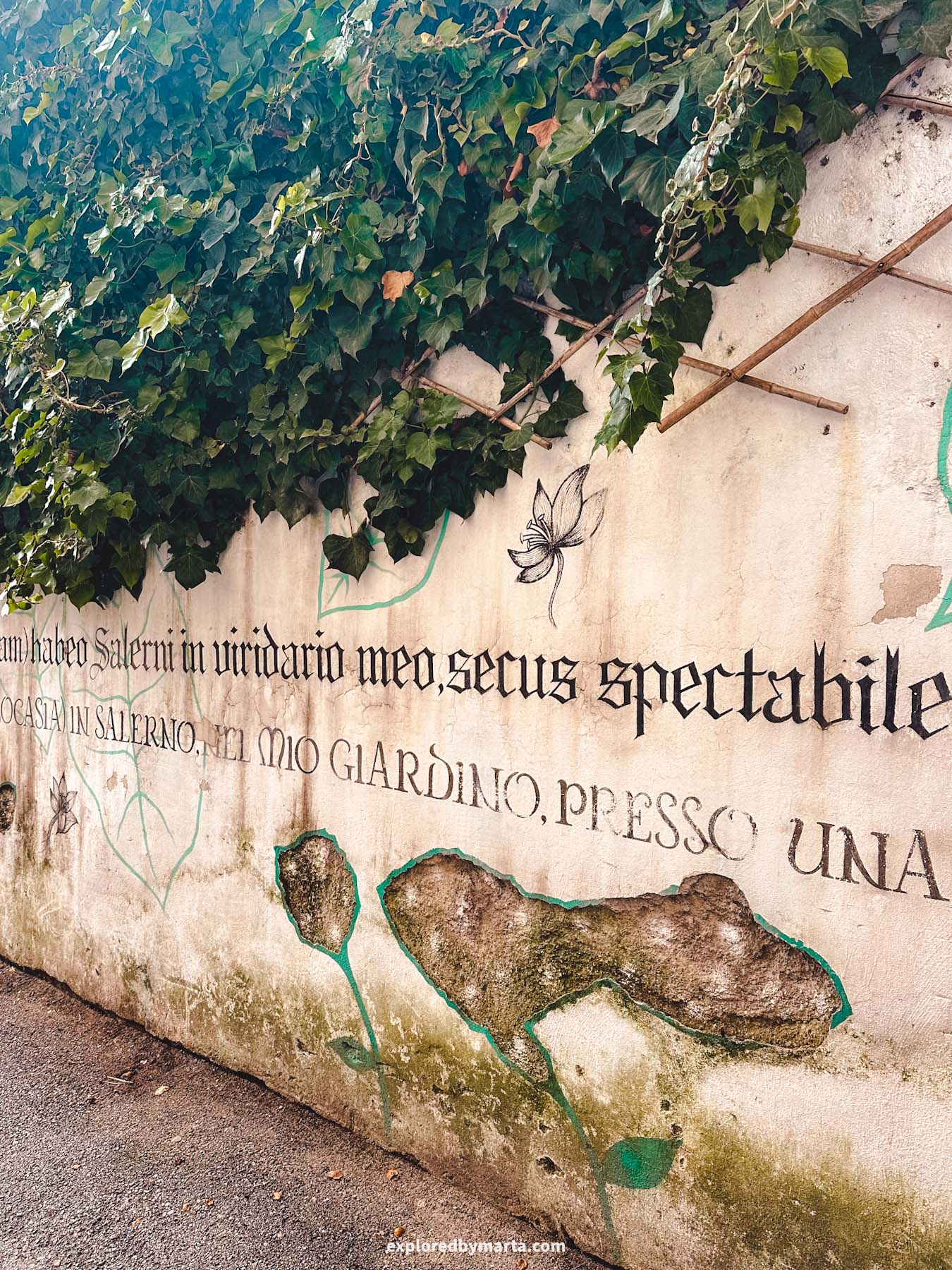
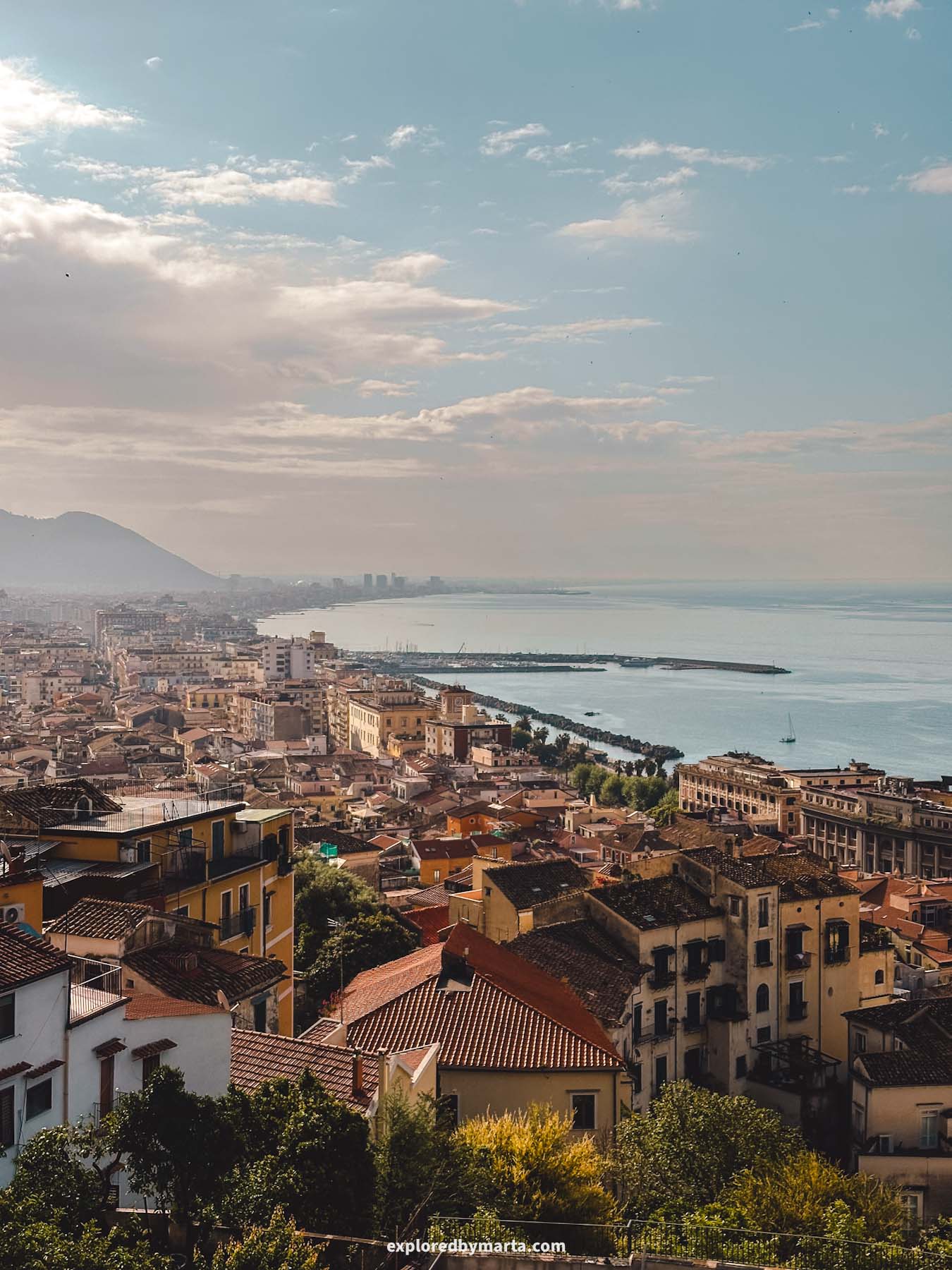
The terraced botanical garden hosts hundreds of rare and exotic plant species, including the likes of a mandrake. Yes, the one from Harry Potter.
Today, Minerva’s Garden is regarded as one of Italy’s ten most beautiful historic gardens. Unfortunately, when we visited, it was closed due to restoration works, but we did see parts of it from above.
If you are visiting Salerno, definitely check if they are already open!
Location: Giardino della Minerva
9. Take a beach break at Salerno’s urban beaches
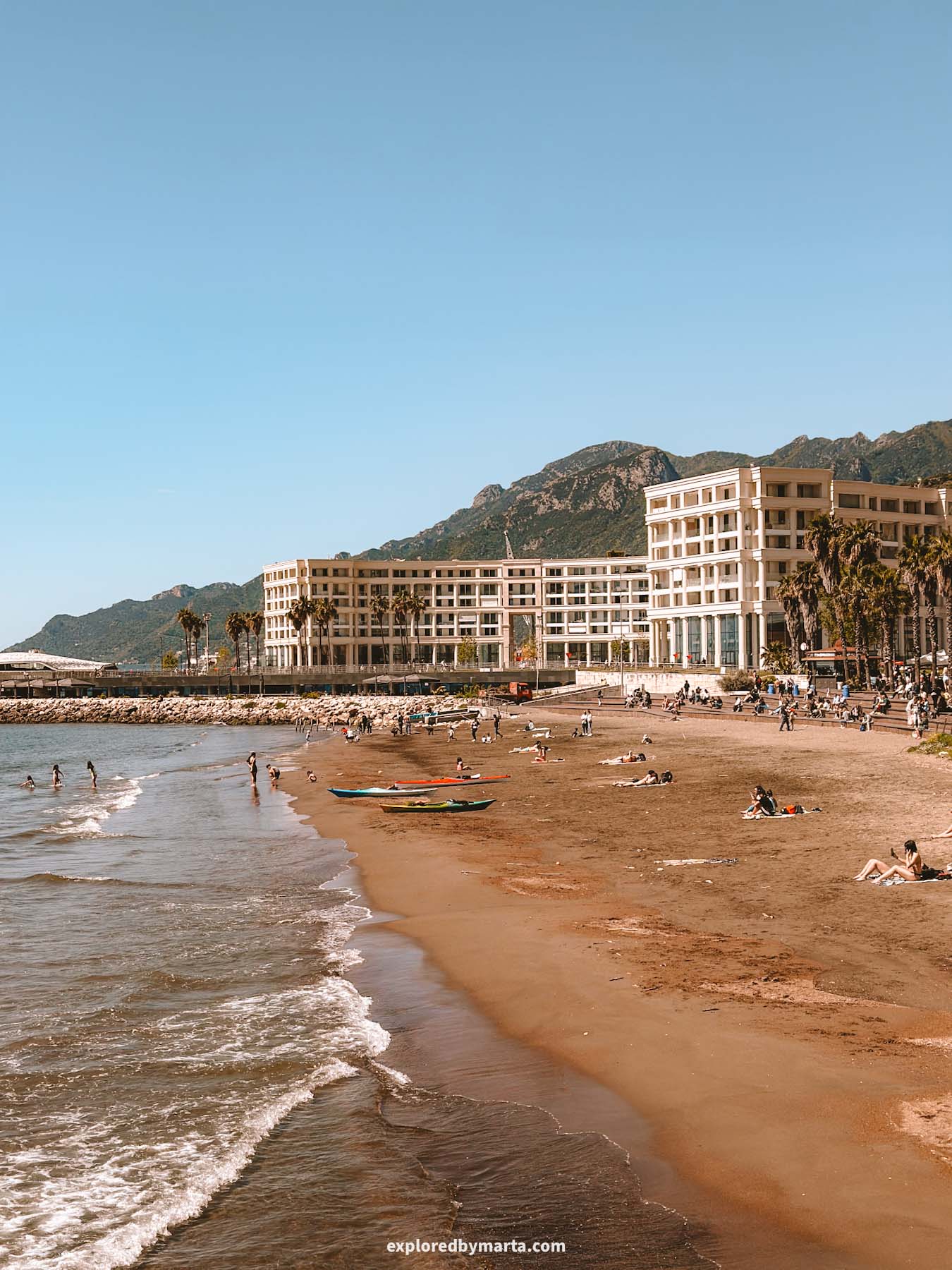
Salerno boasts a long stretch of coastline along the Tyrrhenian Sea, so if you’re looking to spend a day at the beach, there are several options to choose from.
One great spot is Spiaggia Santa Teresa, a public urban beach located right next to Piazza della Libertà. It’s one of the most central beaches in the city—perfect for sunbathing or a quick dip in the sea, but it doesn’t have any facilities.
At the other end of the Salerno promenade, you’ll find a tiny beach called Spiaggetta del Pontile, ideal for a short swim. This is a small beach, but you can take a quick dip into the water or have a picnic by the water.
However, the best sandy beaches and beach clubs are located just outside Salerno’s Old Town. If you follow the coastline, you’ll eventually reach Spiaggia il Porticciolo and Spiaggia di Salerno—both of which stretch for miles along the shore.
While the beaches near the Old Town are convenient for a quick swim or sunbathing, they don’t have any facilities. So, if you want to spend a full day at the beach, I recommend heading out to Spiaggia di Salerno, a long sandy beach with beach clubs and facilities.
Location: Spiaggia Santa Teresa – Spiaggetta del Pontile – Spiaggia di Salerno
10. Check out Salerno’s oyster building

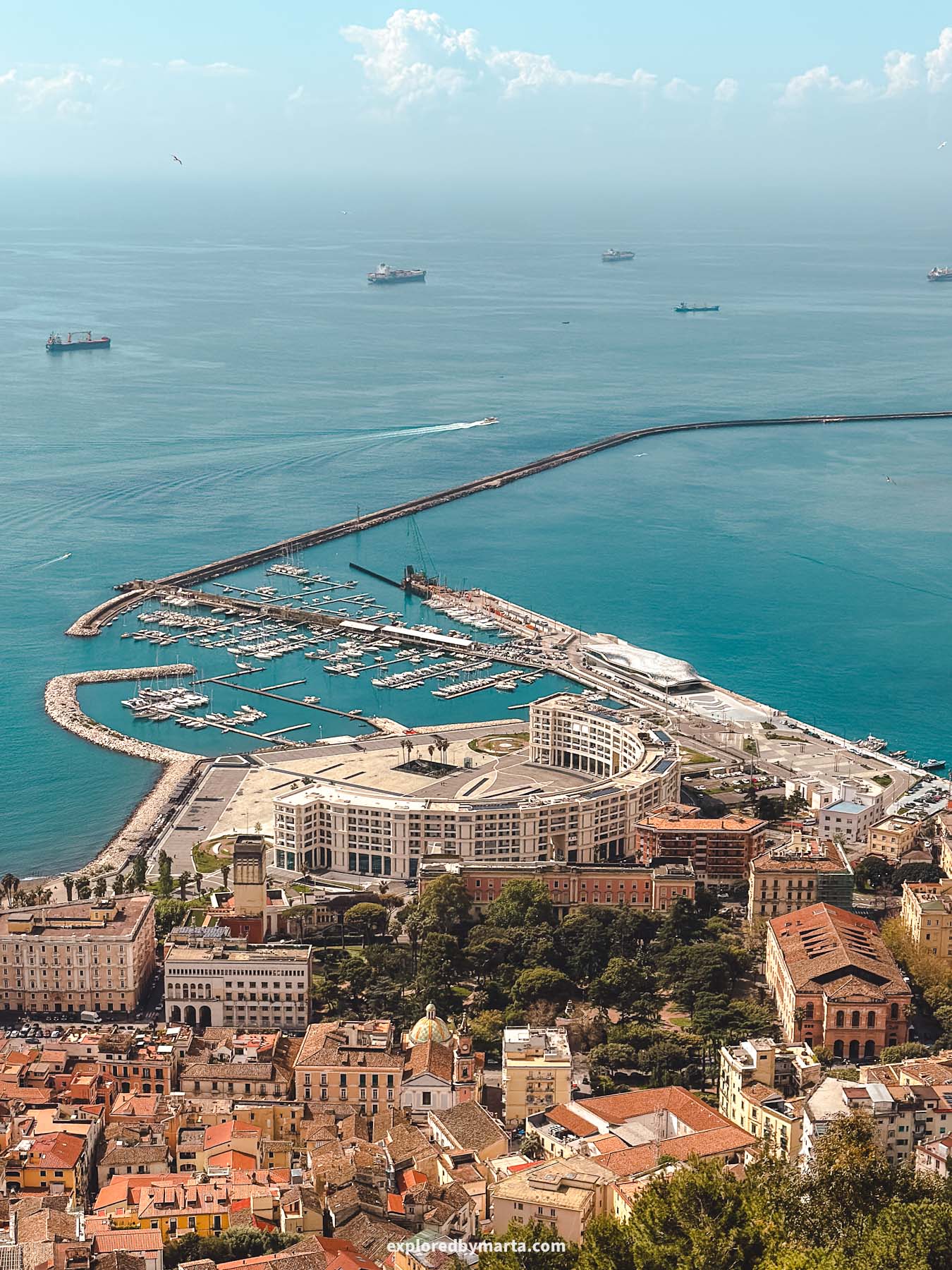
Stazione Marittima di Salerno, the cruise terminal in Salerno, is one of the most unique contemporary landmarks in the city. It was designed by the world-renowned architect Zaha Hadid and was one of her final projects.
What makes it especially distinctive is its shape — the terminal was inspired by the shape of an oyster. Do you see it? I’m not a fan of oysters myself, so I didn’t see it at first, but once you know, the resemblance becomes clear.
The exterior of the terminal represents the oyster’s hard shell, while the interior features softer spaces and shapes. If you’re walking along Salerno’s promenade or visiting Piazza della Libertà, be sure to stop by — the terminal is just a few meters away!
And if you’re taking a ferry to visit towns along the Amalfi Coast, you might end up here anyway. Many water taxi and ferry services depart from this terminal (there’s also another port in the city) to such destinations as Amalfi, Positano, Capri, and others.
Location: Stazione Marittima di Salerno
11. Walk through the Porta Nova historic city gate
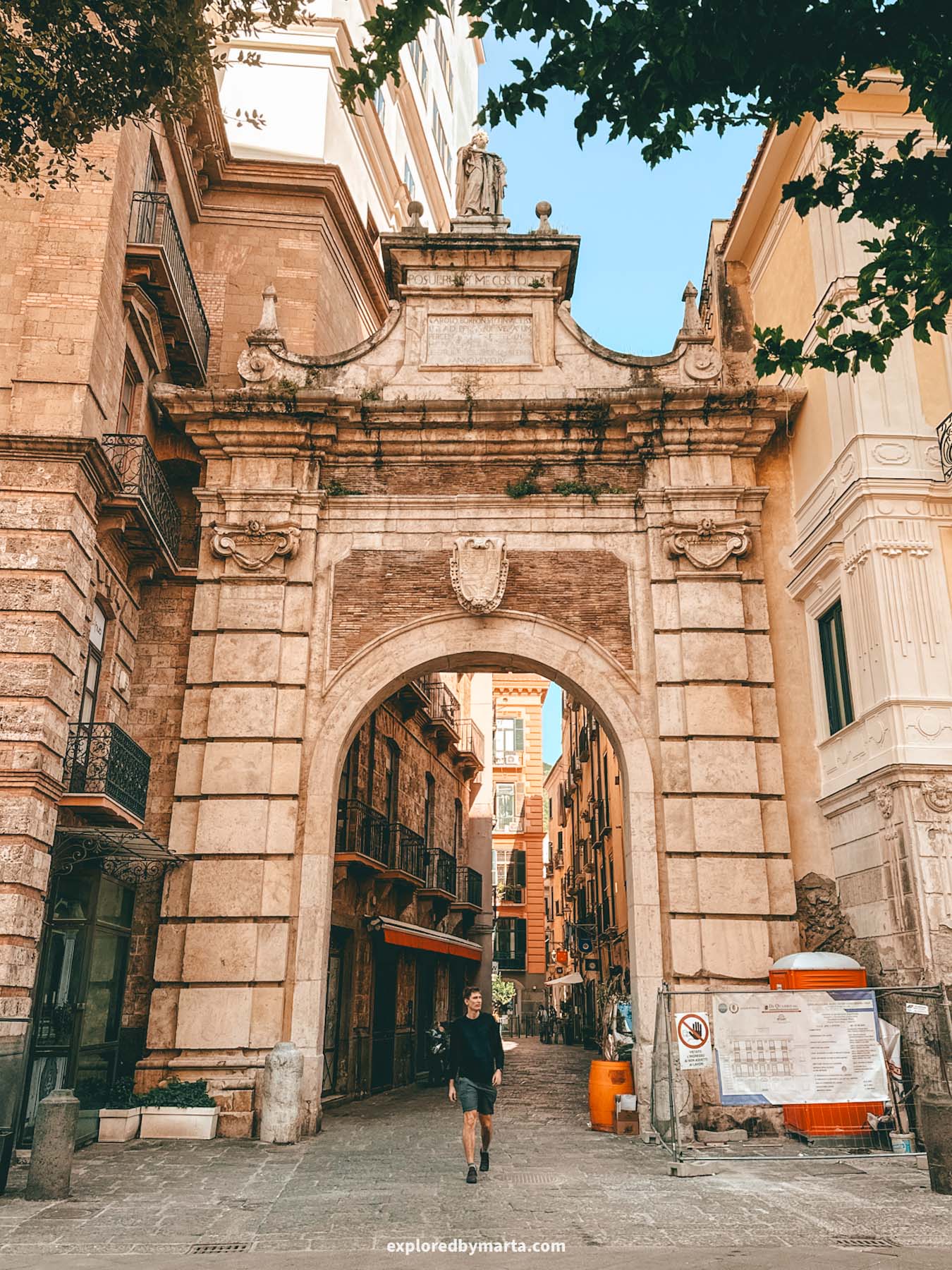
Salerno is a city with a rich and long history. Being founded even before our era, it has seen its fair share of historical events that have shaped Europe over the centuries.
One of the things that tells the story of Salerno’s history is architecture. As you stroll around the historical center, don’t forget to look up and admire the historic buildings – it was one of my favorite things to do in Salerno!
One of the most distinctive landmarks in Salerno’s Old Town is the Antica Porta Nova, often simply called Porta Nova. This historic city gate was built in the 18th century and features a statue of Saint Matthew, the patron saint of Salerno.
Antica Porta Nova is the only surviving city gate from Salerno’s ancient defensive walls. Once a main entrance to the city, it now marks the boundary between the historic old town and the more modern areas of Salerno.
Definitely walk by this unique place in Salerno!
Location: Antica Porta Nova
12. Pass by the Medieval Aqueduct of Salerno
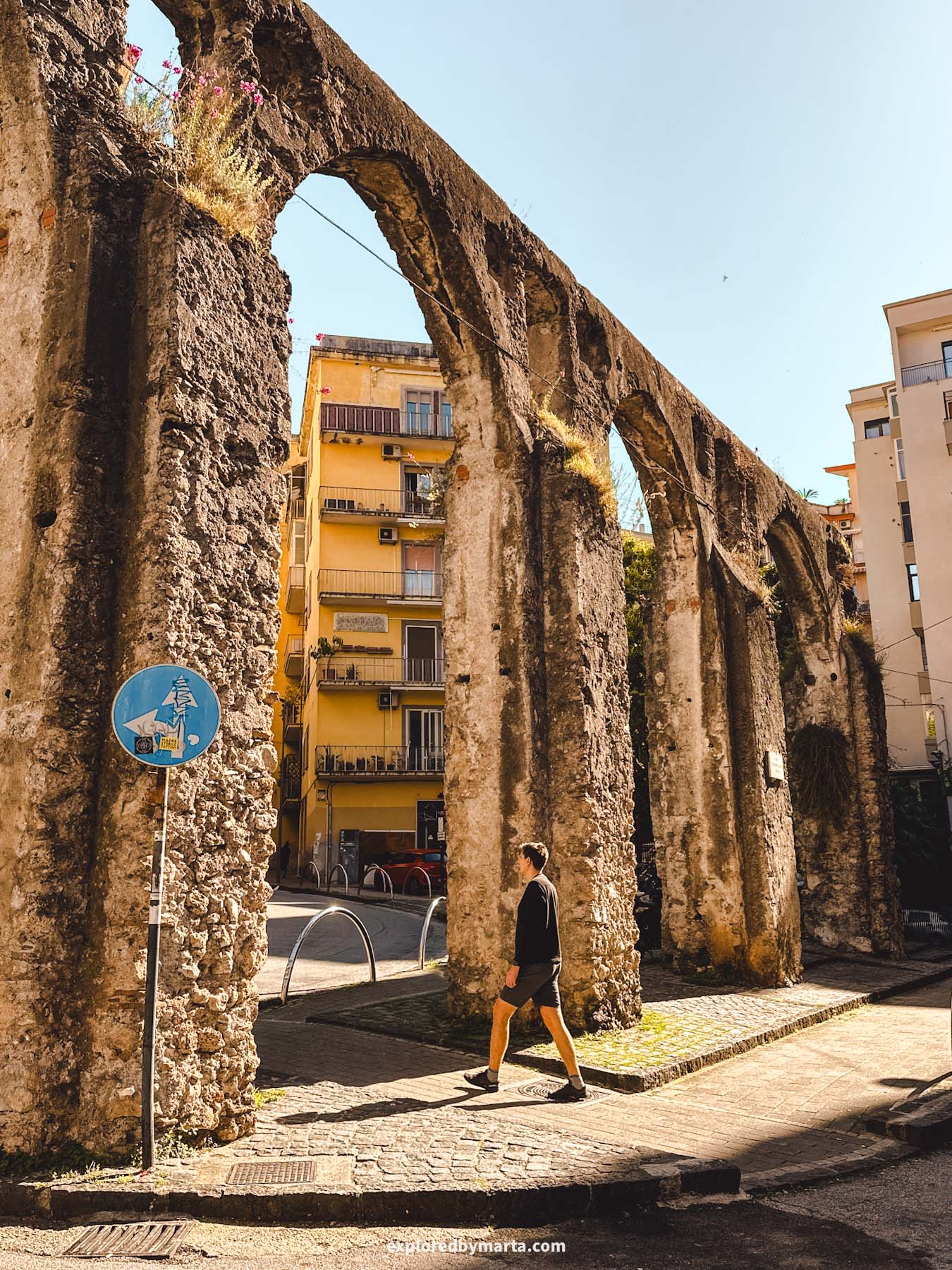
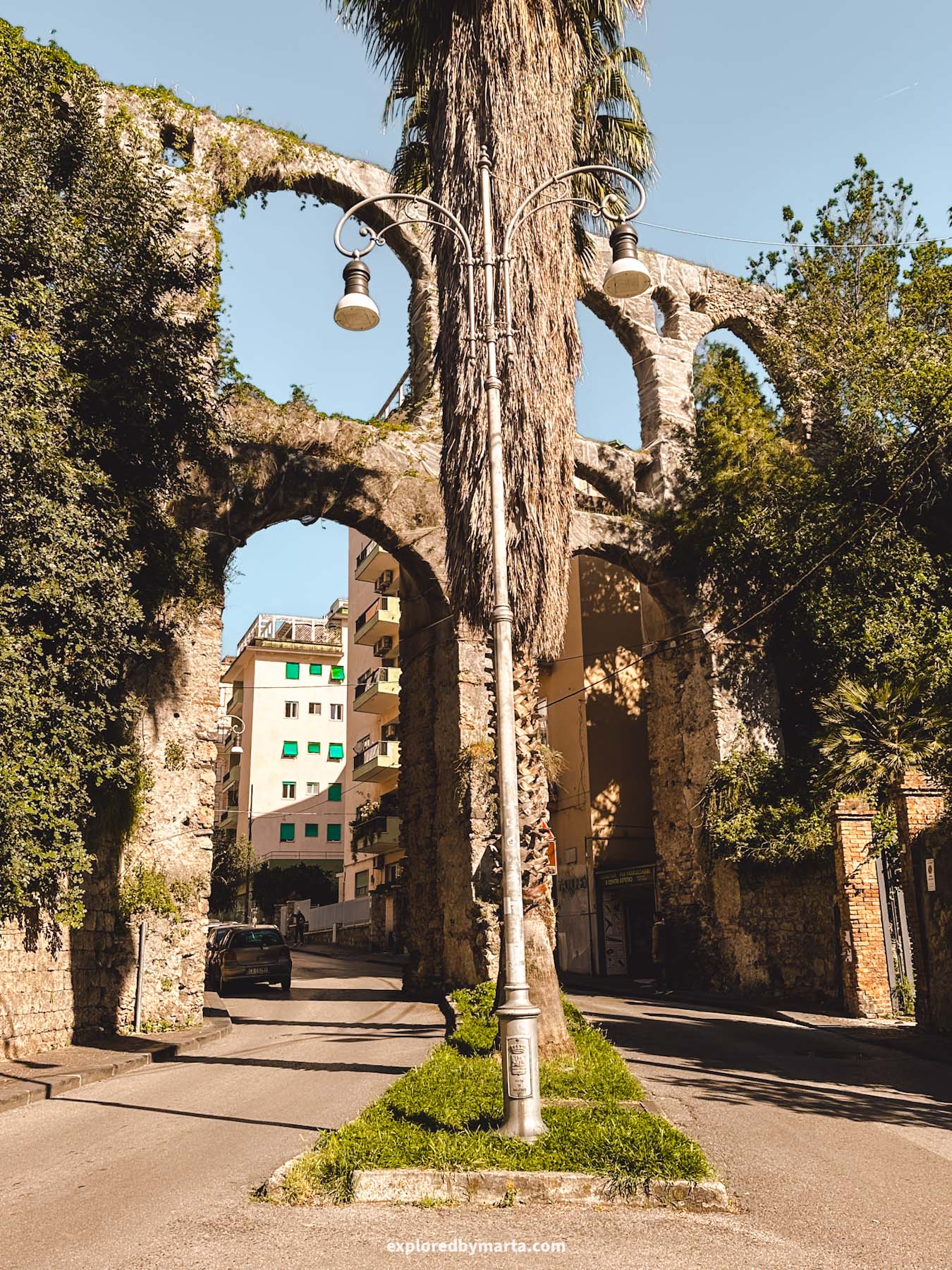
Talking about arches, there’s another cool historic structure worth a visit in Salerno – the city’s medieval aqueduct!
Located just a short walk from the Porta Nova historic city gate, the 9th-century aqueduct is one of Salerno’s most interesting attractions.
The stone aqueduct was built by Benedictine monks to supply their monastery and the city with water. Today, only small portions of it remain, and you can see them along Via Arce.
I didn’t expect the aqueduct to be so tall—cars can easily drive right under its arches! It’s pretty cool to see medieval times blending with the 21st century like that, haha!
There isn’t much to do or see except for snapping a few photos, so it will be a short visit to see the aqueduct. If you have time for a relaxed walk through the city, I definitely recommend including this spot on your route!
Location: Acquedotto Medievale
13. Explore the medieval Castello di Arechi
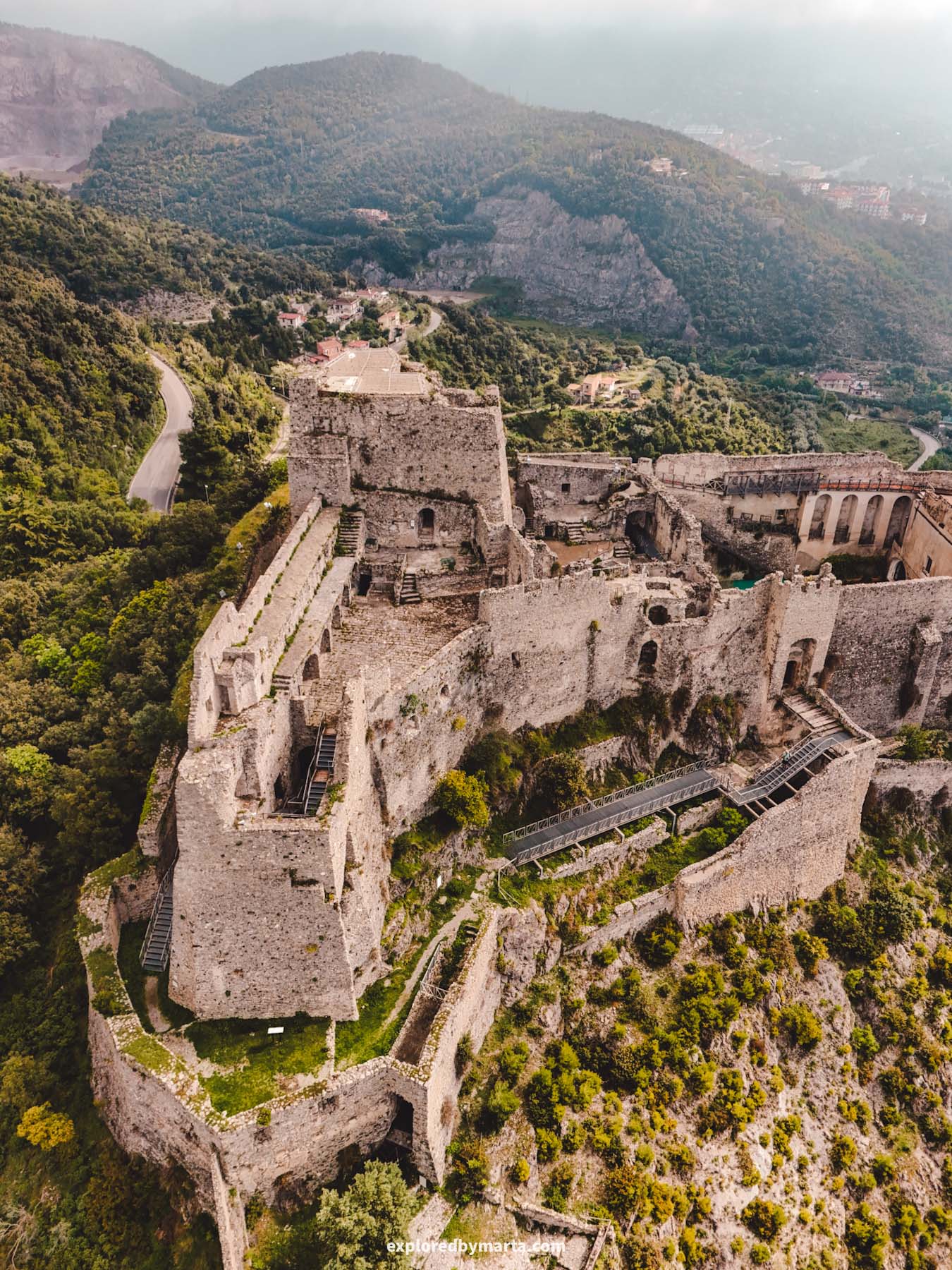
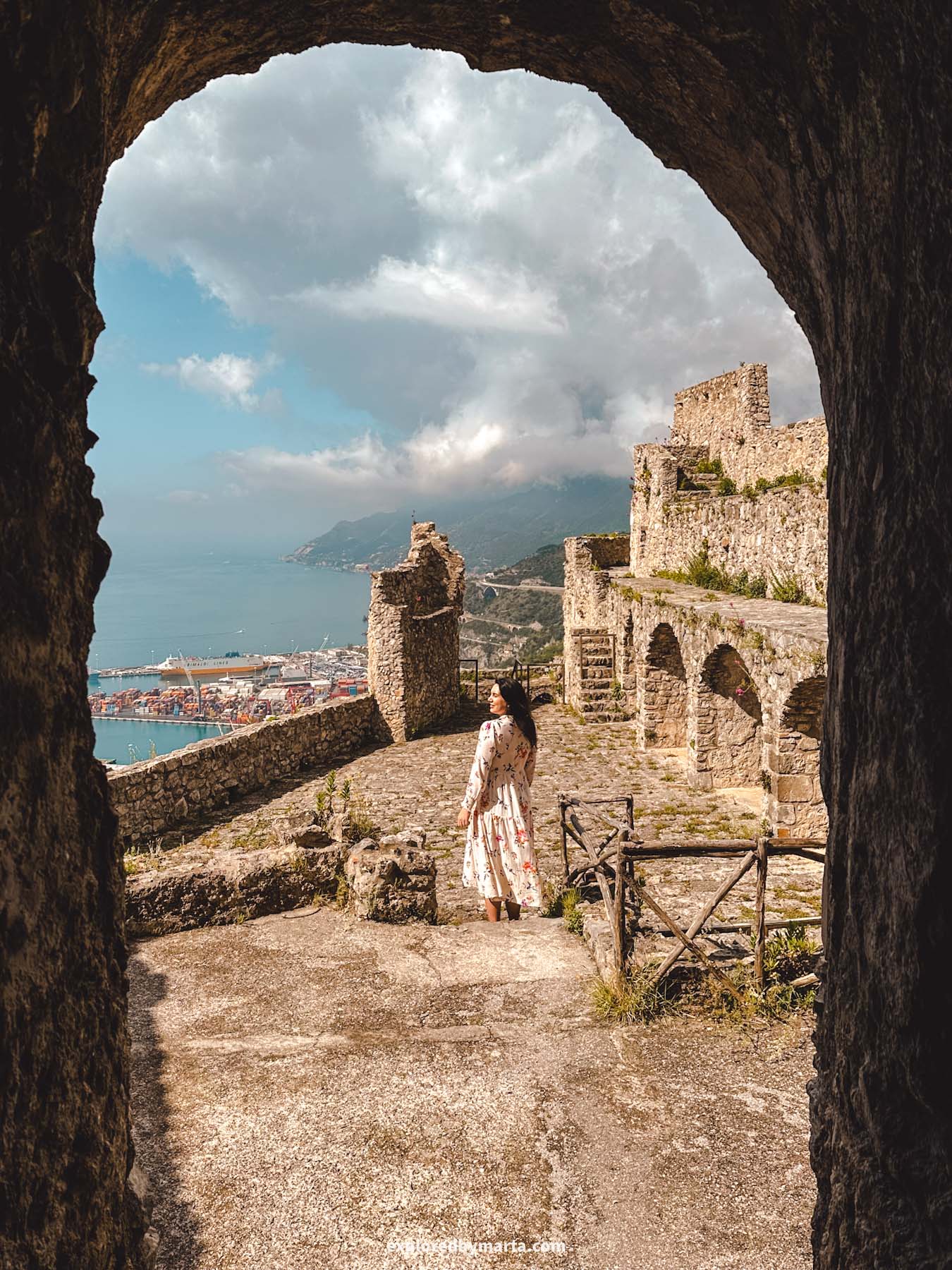
Standing about 360 meters above sea level on Mount Bonadies, next to Salerno, is Castello di Arechi, or Arechi Castle, one of the most significant historical landmarks in the region.
The oldest parts of this medieval fortress date back as far as the 6th century, although most of the structure was built over the following centuries.
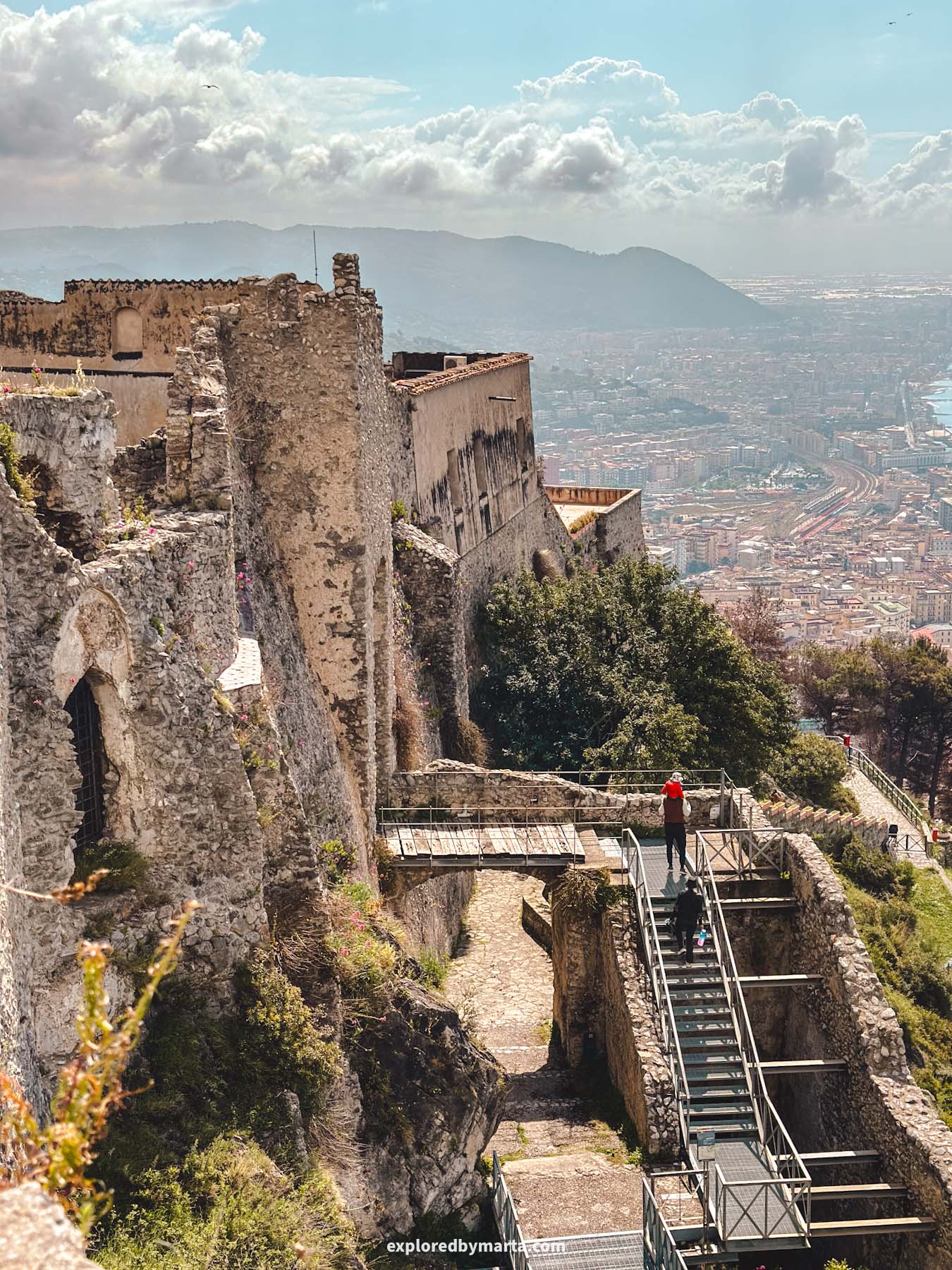
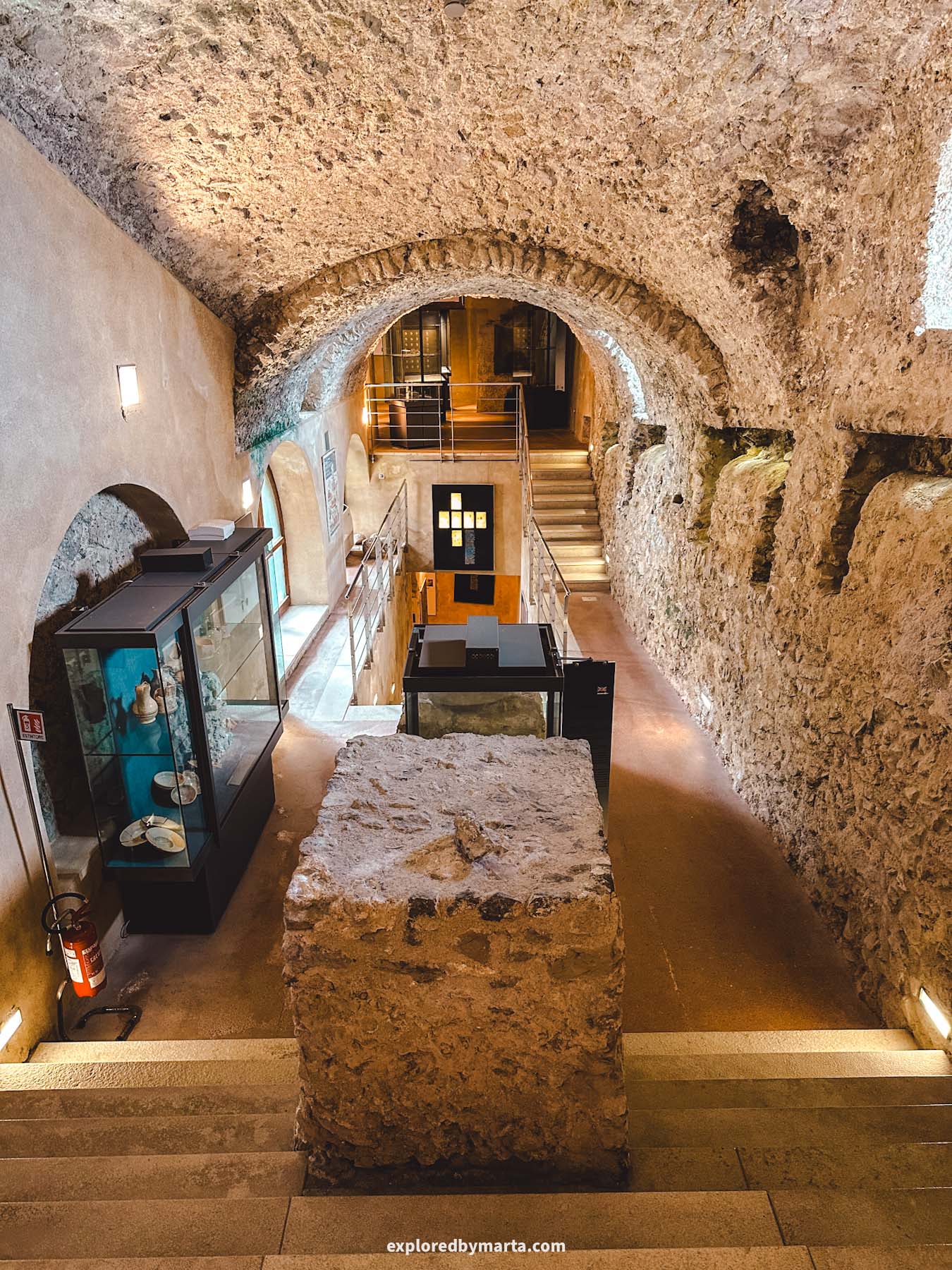
Castello di Arechi was one of my favorite places we visited in Salerno. Not only is it a great spot to explore historic artifacts, but it also offers panoramic views of the Amalfi Coast, Salerno, and the Gulf of Salerno.
The castle is surrounded by a lush forest, making the visit a peaceful walk filled with fresh air and stunning scenery. I highly recommend adding this medieval gem to your Salerno itinerary!
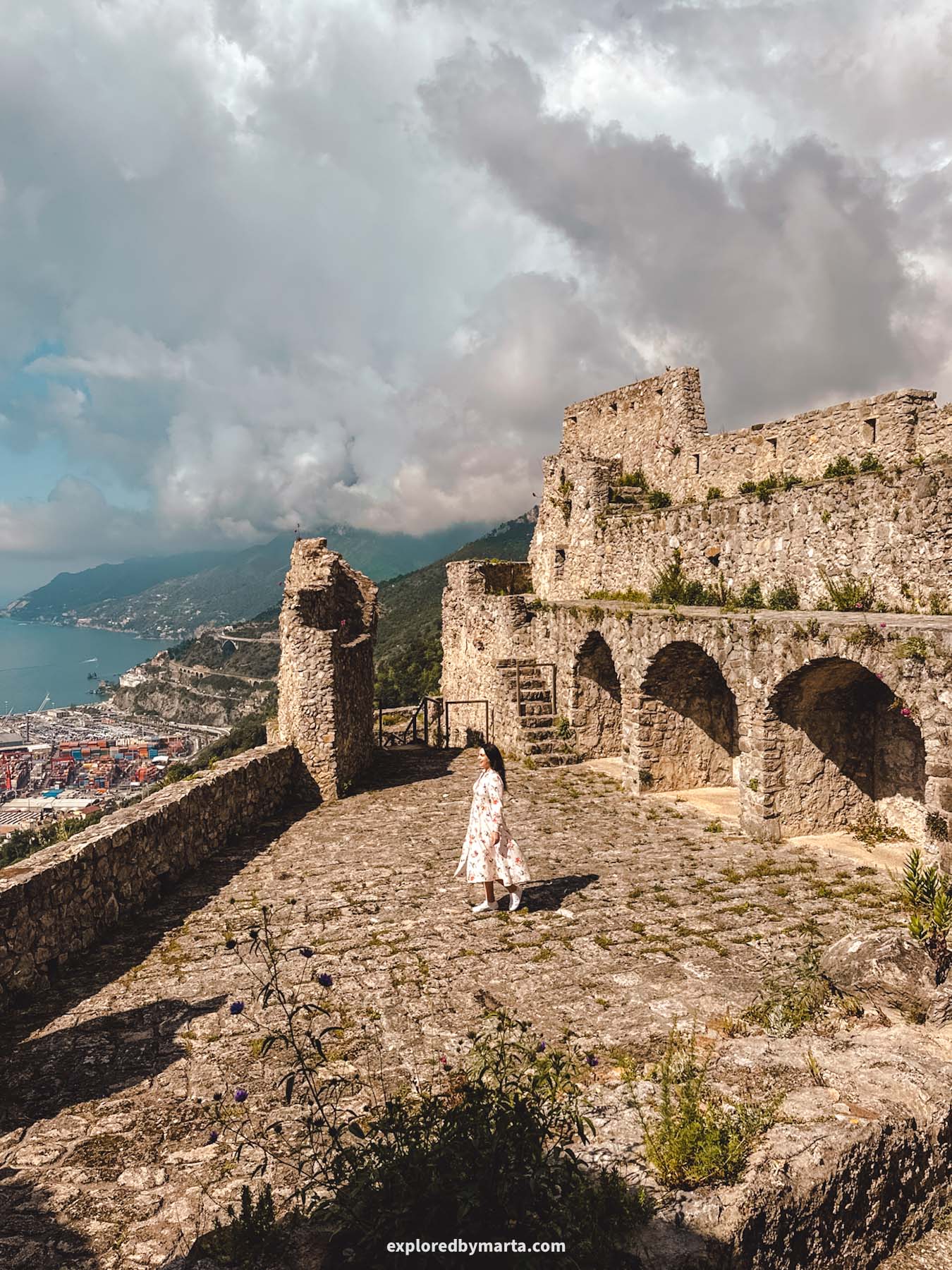
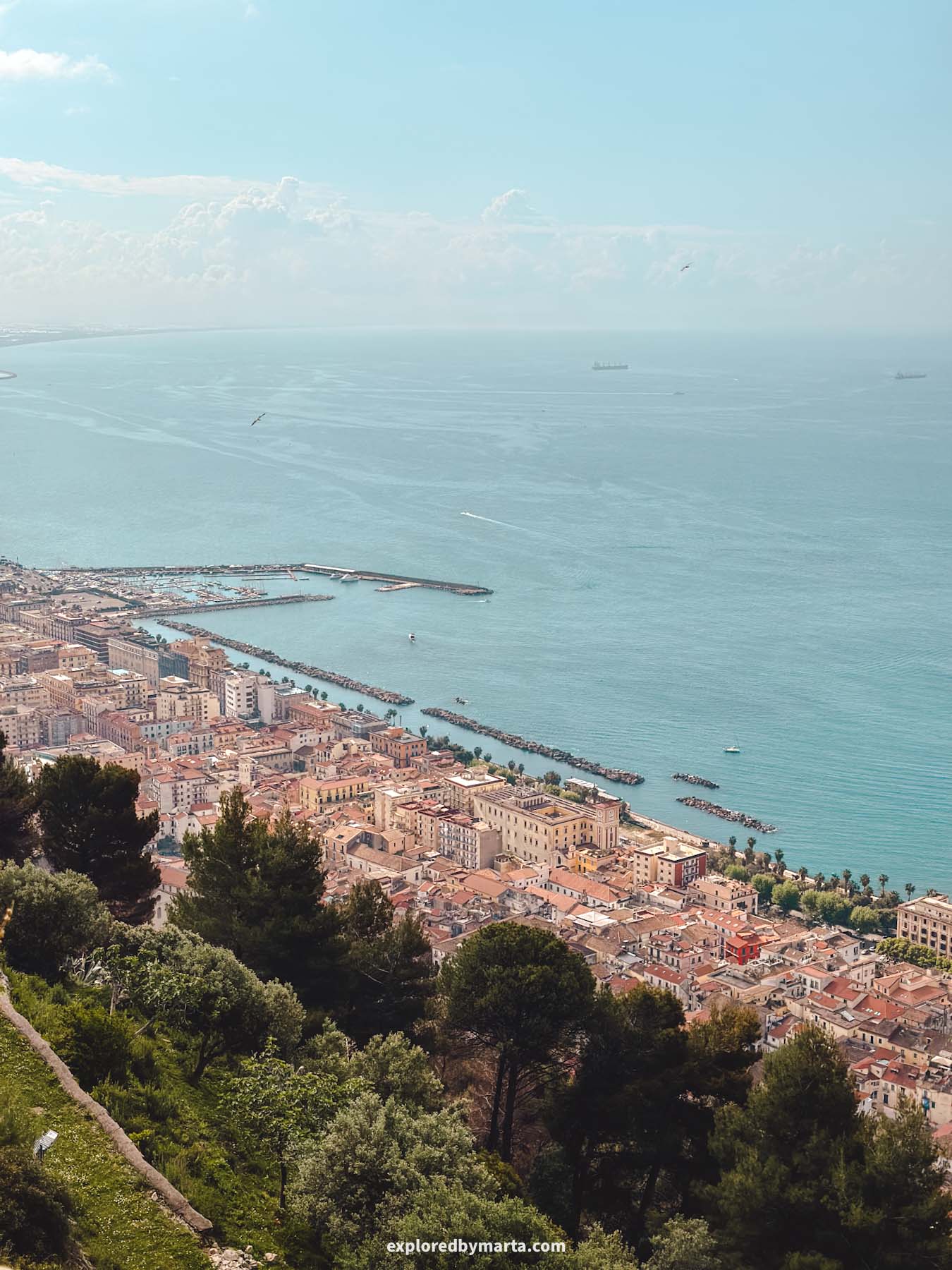
You can reach the castle by hiking, though it’s a steep and challenging climb from Salerno, or by car (there’s parking available near the entrance), taxi, or bus. A regular bus route goes directly from Salerno to the castle.
The best part? You can explore the outside of the castle for free. If you’d like to see the interior, there’s a small entrance fee. Inside, you’ll find a museum showcasing artifacts such as coins, tools, and other historical items.
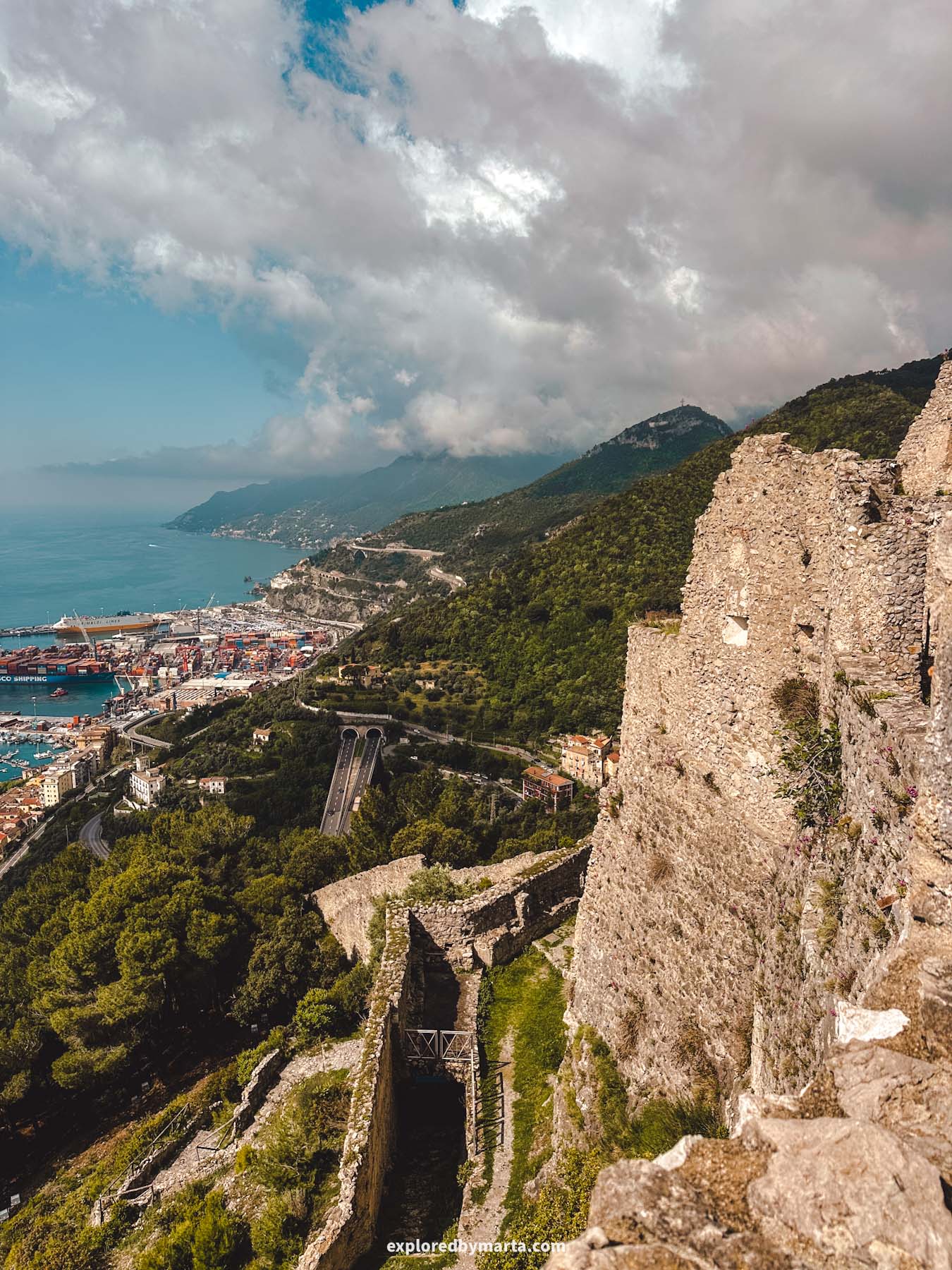
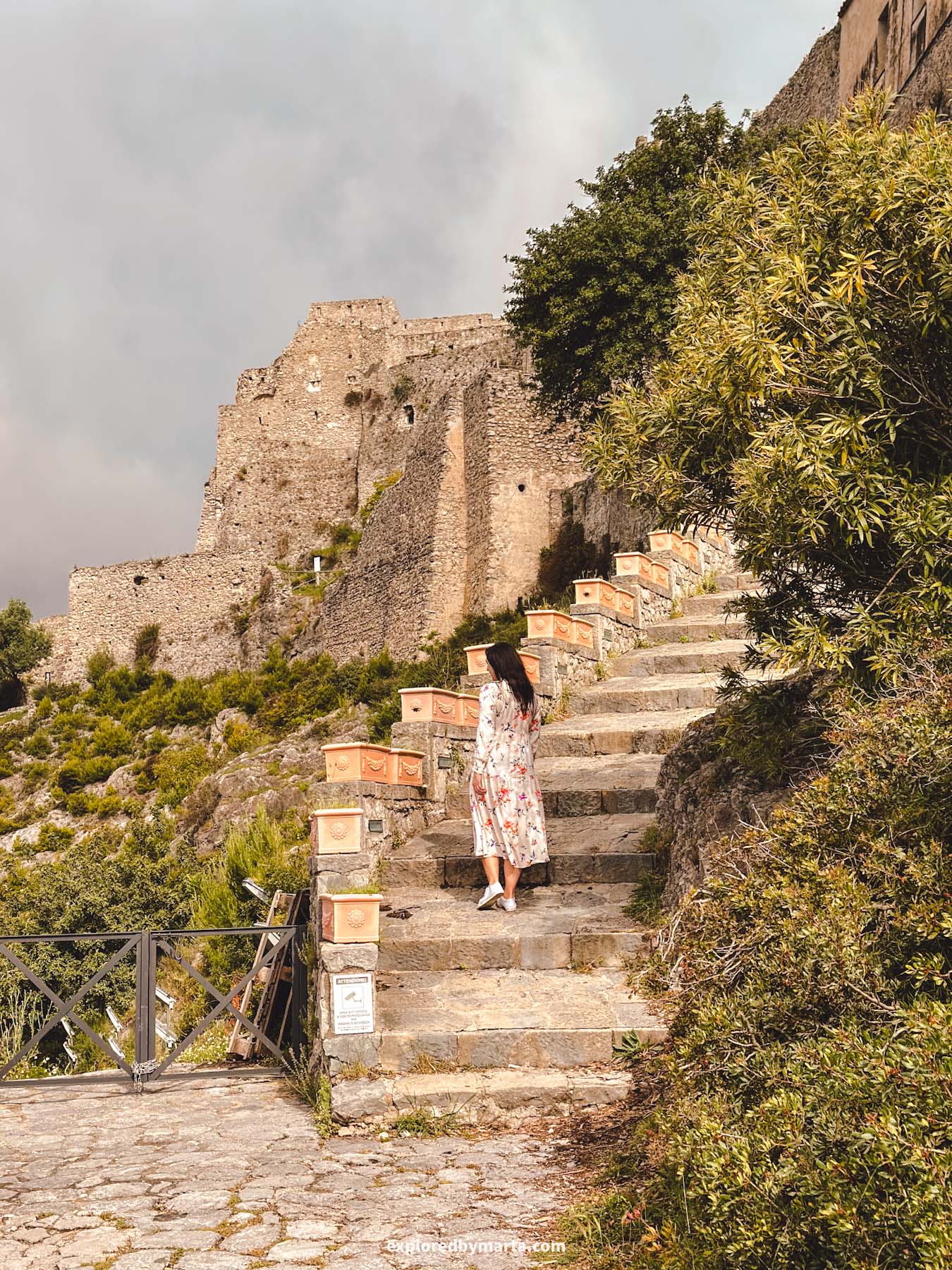
The castle is named after Arechi II, a Lombard prince, but over the centuries, it was occupied by various groups—including the Byzantines, Normans, Aragonese, and others—each leaving their mark on the structure and its defenses.
Exploring the castle was one of my favorite things to do in Salerno, and I highly recommend adding it to your itinerary. The views from up there are truly unbeatable!
Location: Castello di Arechi
14. Go on a trip to the Greek temples in Paestum
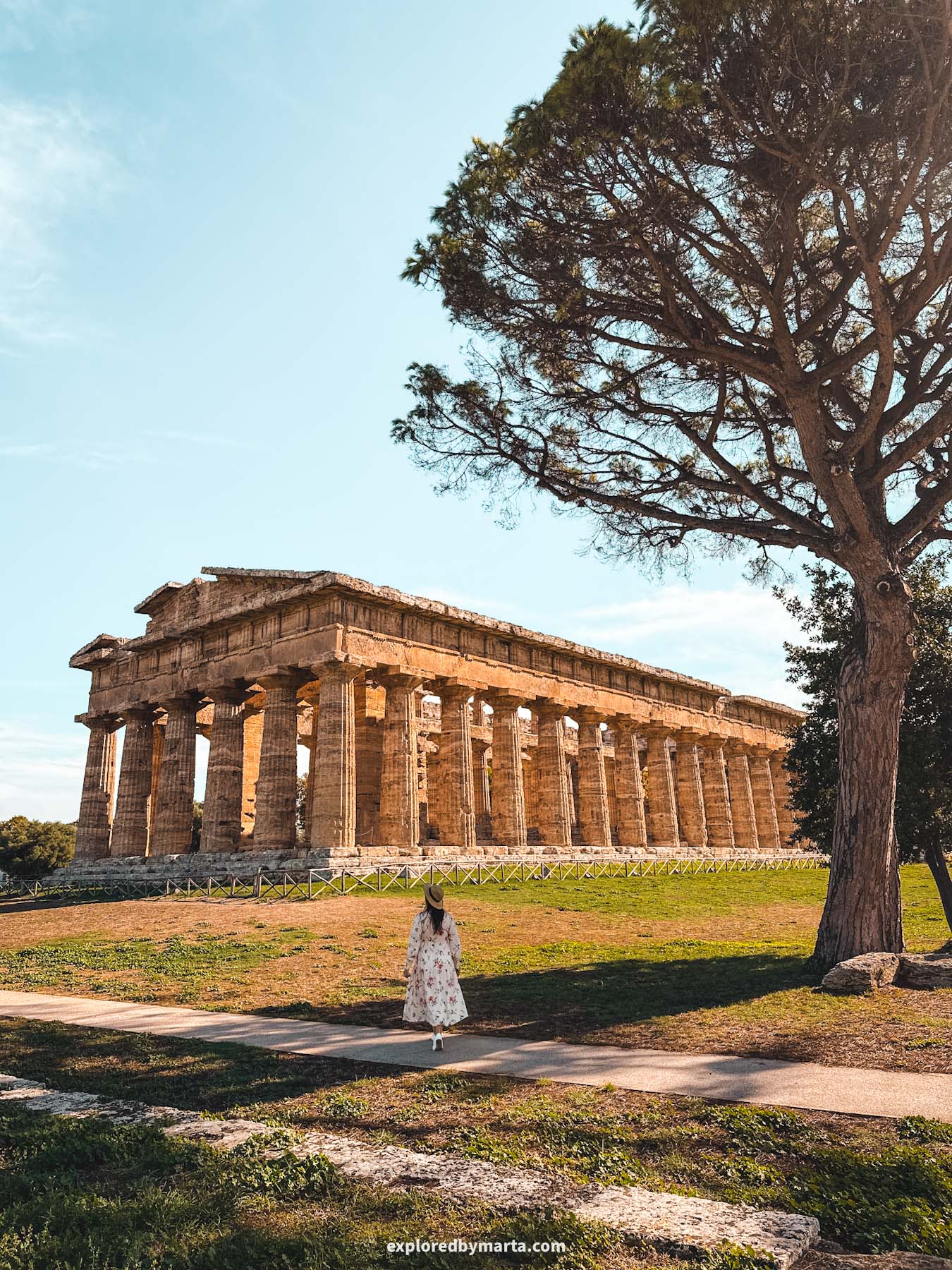
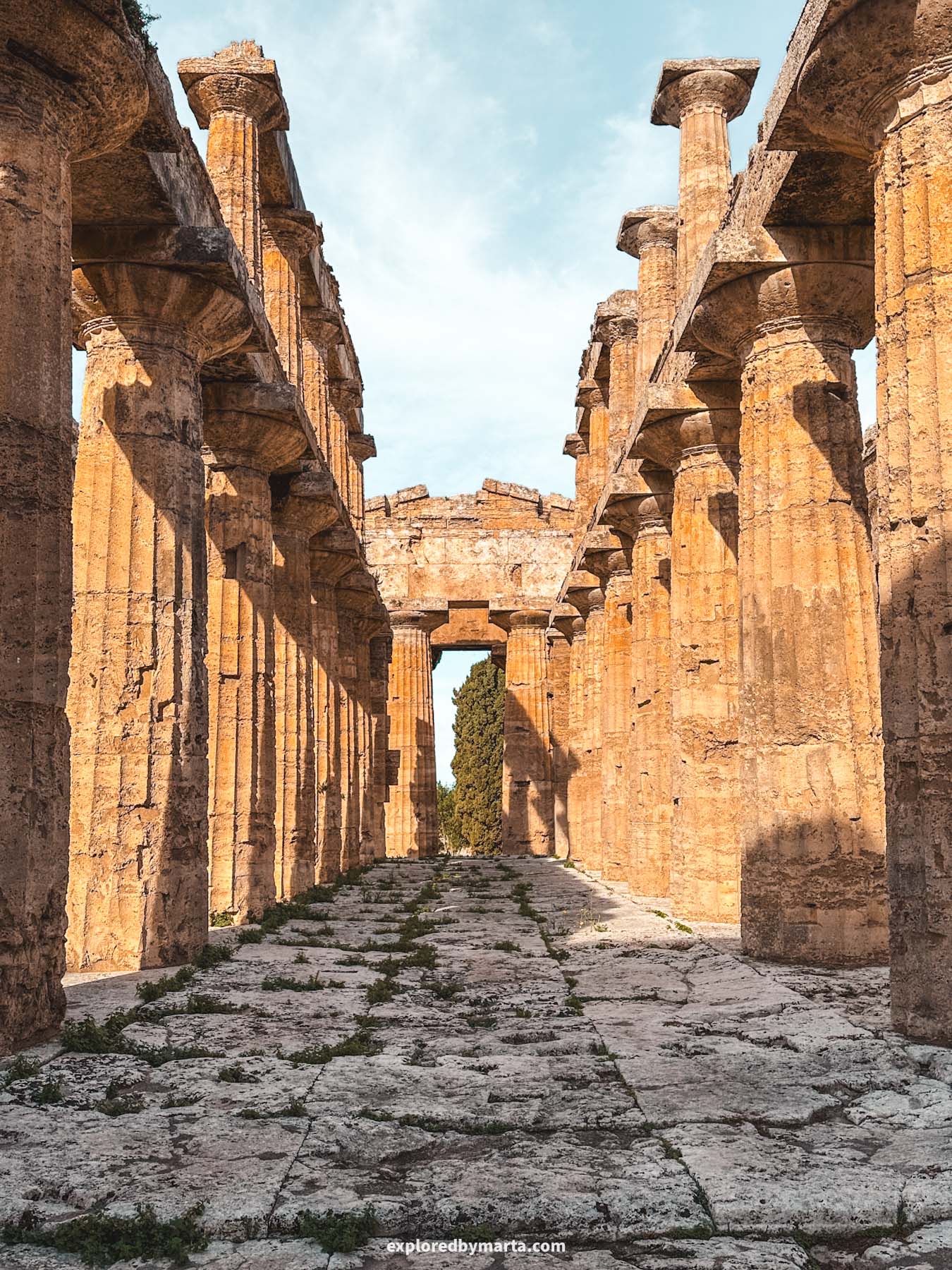
The area around the Mediterranean Sea is often referred to as the cradle of Western civilization. The sea connected civilizations from Europe, Asia, and Africa, allowing ancient empires to thrive and develop at a rapid pace.
This also meant that territories around the Mediterranean changed rulers many times throughout the centuries. As one empire fell, another rose and continued building and developing the cities.
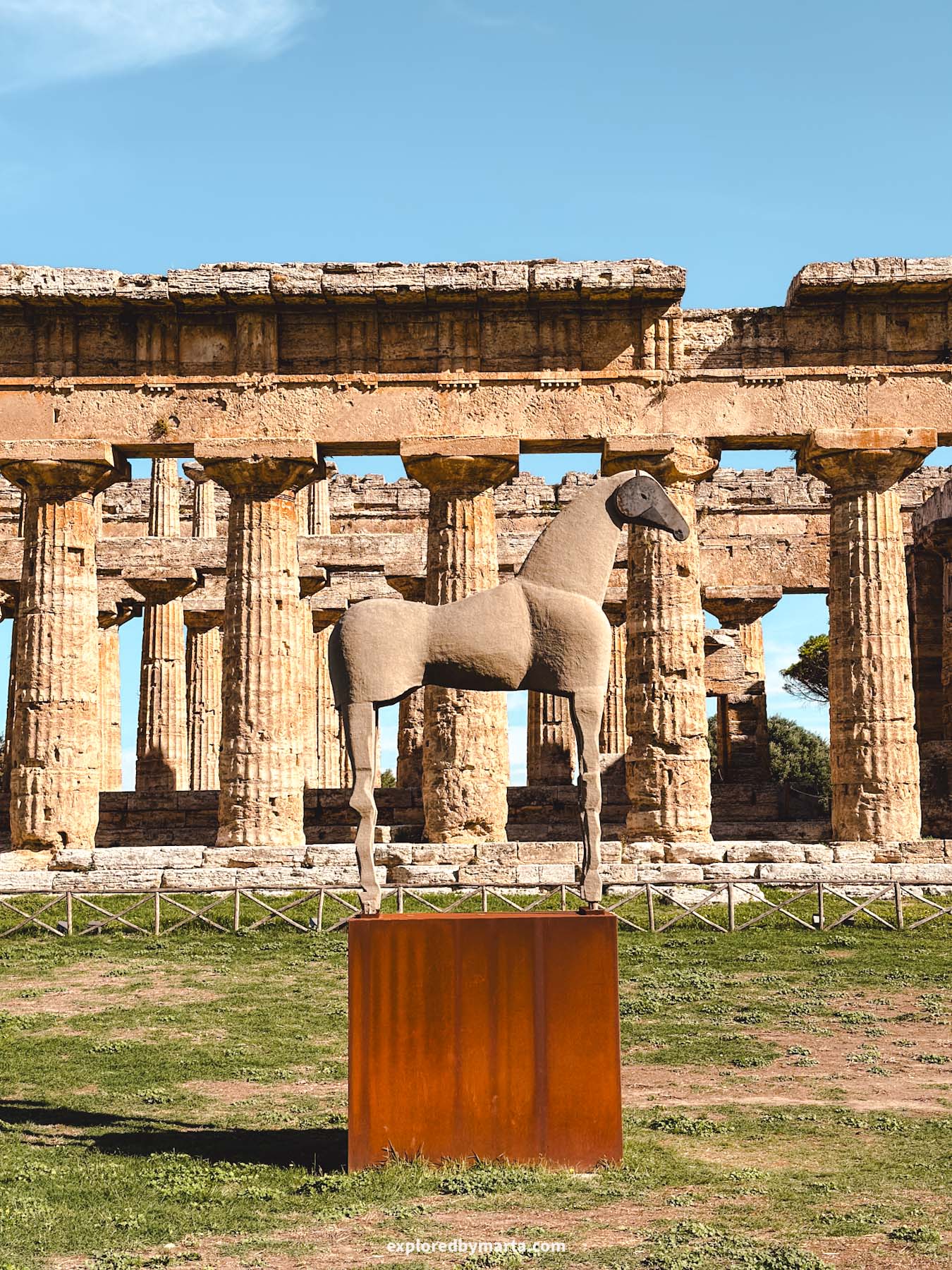
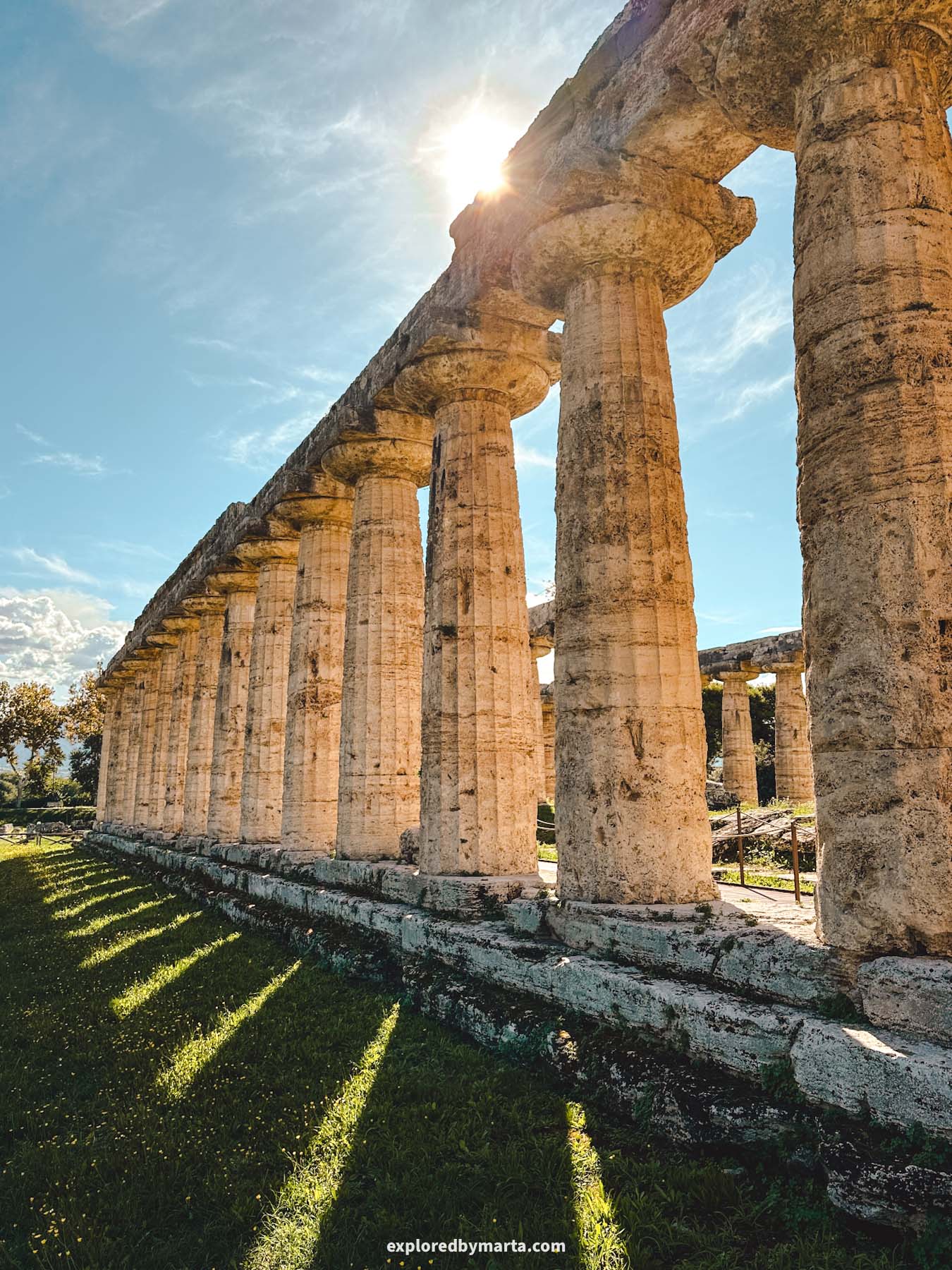
As a result, in many Mediterranean countries today, you can still see historic landmarks left behind by different civilizations. In the case of Salerno, there’s an ancient place called Paestum, where you can see Greek temples over 2,500 years old.
Visiting the Archaeological Park of Paestum was one of my favorite experiences during our time in (and near) Salerno. The massive archaeological site is absolutely jaw-dropping, and, surprisingly, it is one of the lesser-known tourist attractions in the area.

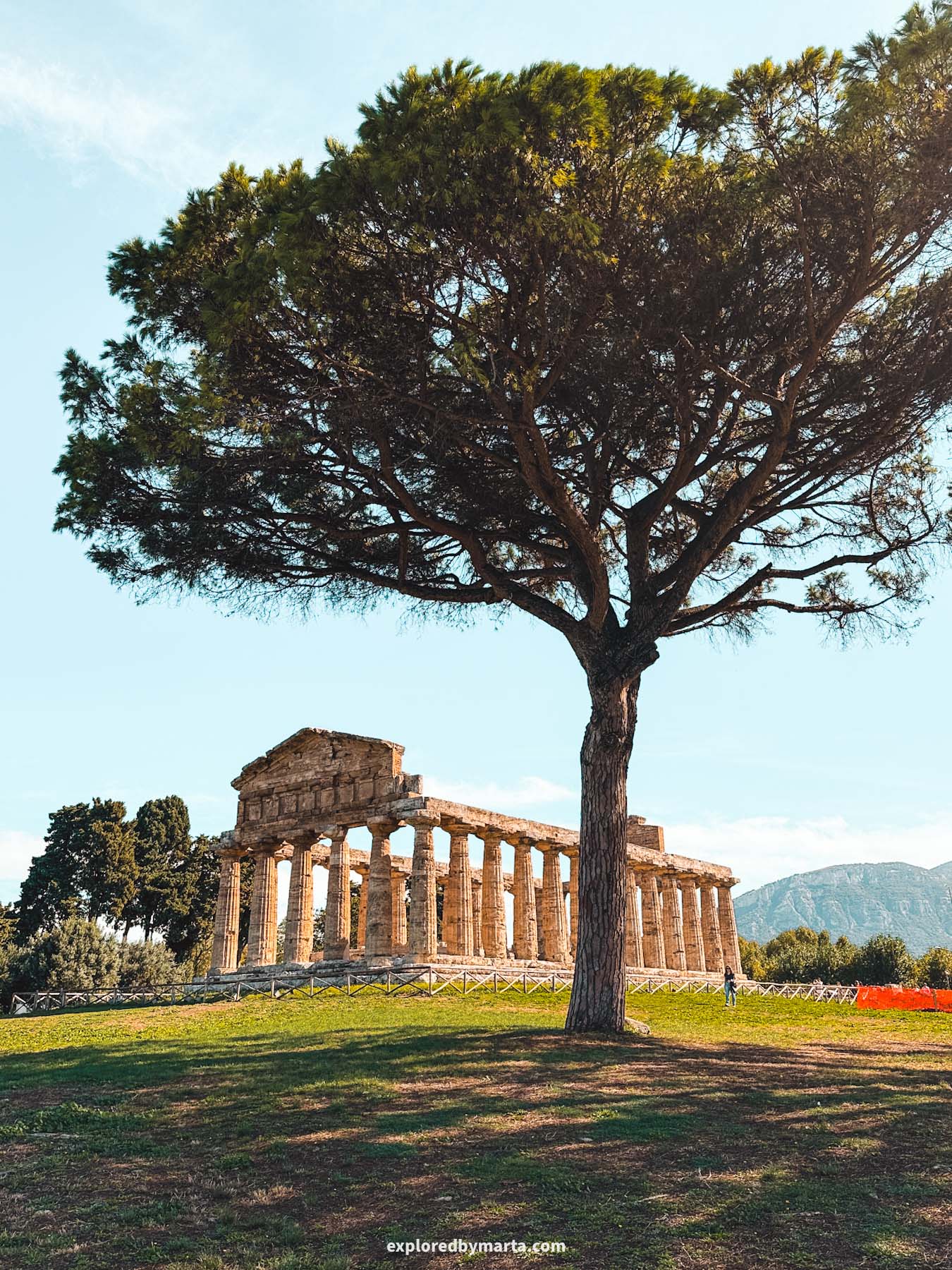
Located just a 40-minute drive south of Salerno, this ancient UNESCO World Heritage Site is a must-visit place in southern Italy. I didn’t expect much to be left of a 2,500-year-old place — but I was so wrong.
Paestum features multiple large Greek temples dedicated to deities like Hera, Athena, and Poseidon. These are some of the best-preserved Greek temples in the world, even better than many you might see in Greece!

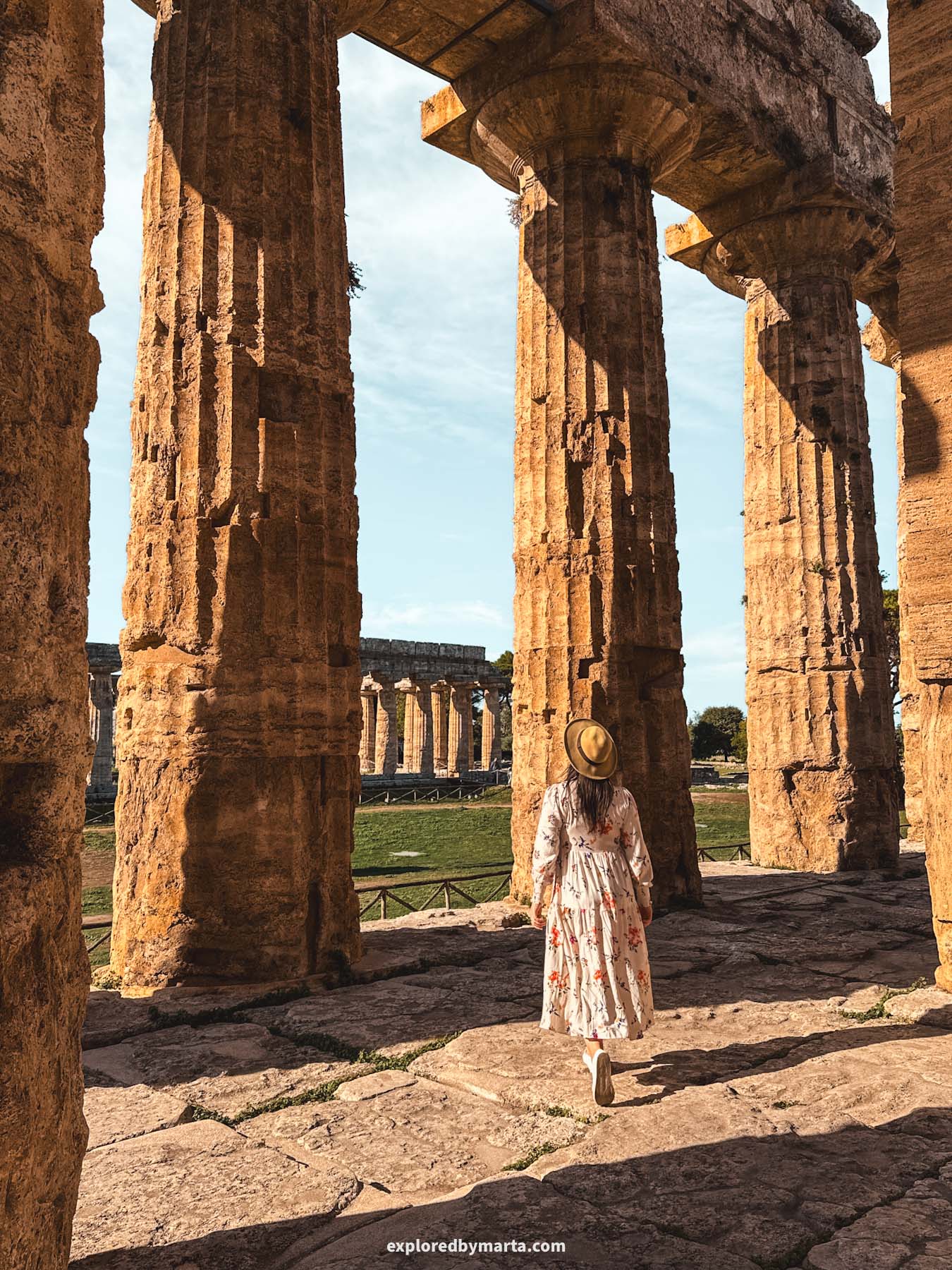
The best part? You can walk inside the temples, touch the columns, and literally step where the ancient Greeks once walked thousands of years ago. I absolutely loved this place. Honestly, I’d argue that the experience even surpasses visiting the Acropolis in Athens!
When the Greeks founded the city, they named it Poseidonia after their sea god. But it was later conquered by the Romans, who renamed it Paestum as we know it today.
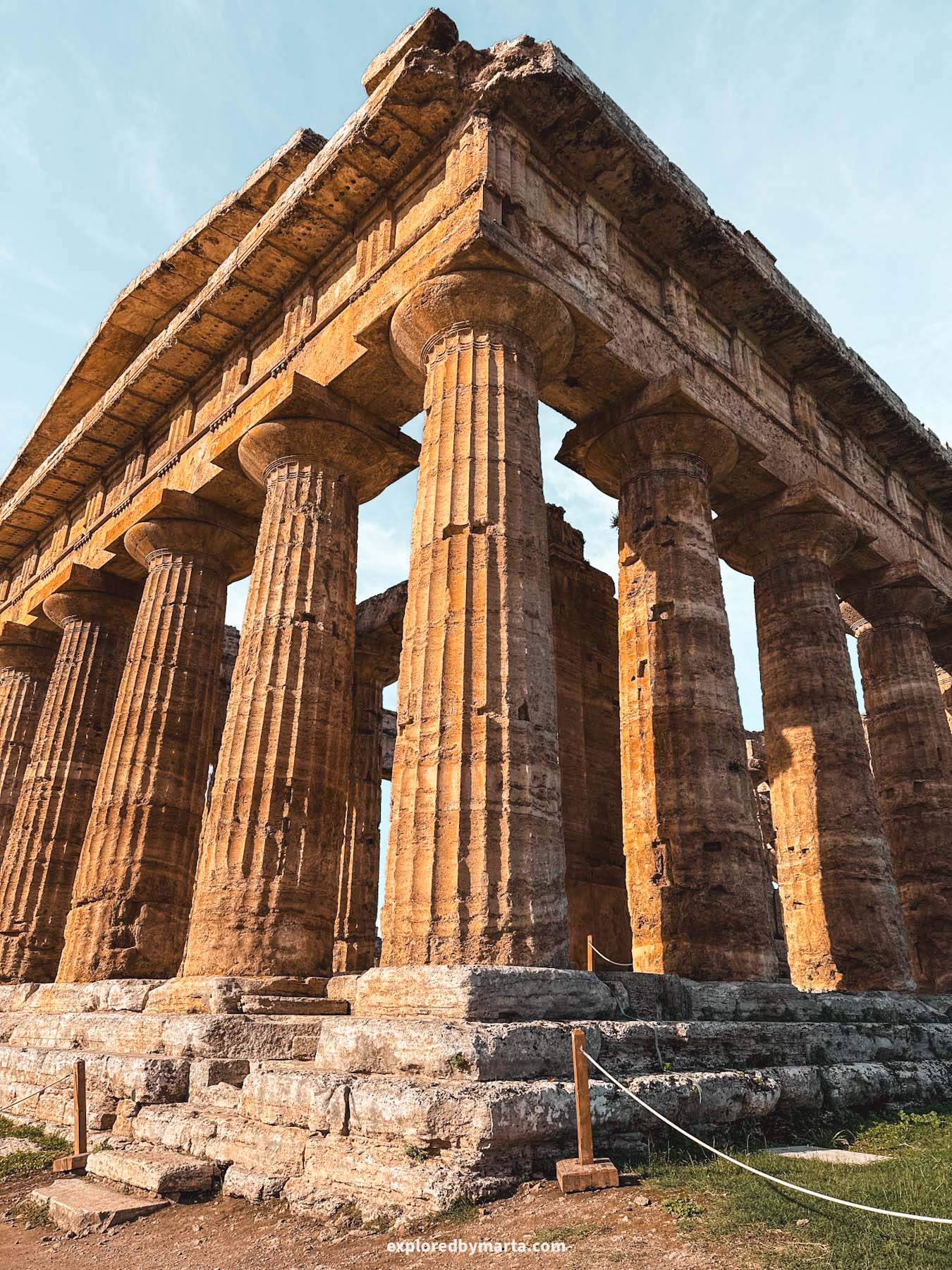

I know that it might feel strange visiting ancient Greek temples while you’re in Italy, but the history of the Mediterranean is deep, diverse, and intertwined. The Greeks did live here, built cities, and left a remarkable mark on this region.
If you’re one of the many history buffs or love sites like Pompeii, the Archaeological Park of Paestum should be high on your list of places to visit in the Campania region of Italy.
I never expected to love this place so much, but I’m quite sure you will completely understand when you see Paestum with your own eyes! It is a true marvel!
Location: Archaeological Park of Paestum
15. Go on a day trip to the Amalfi Coast
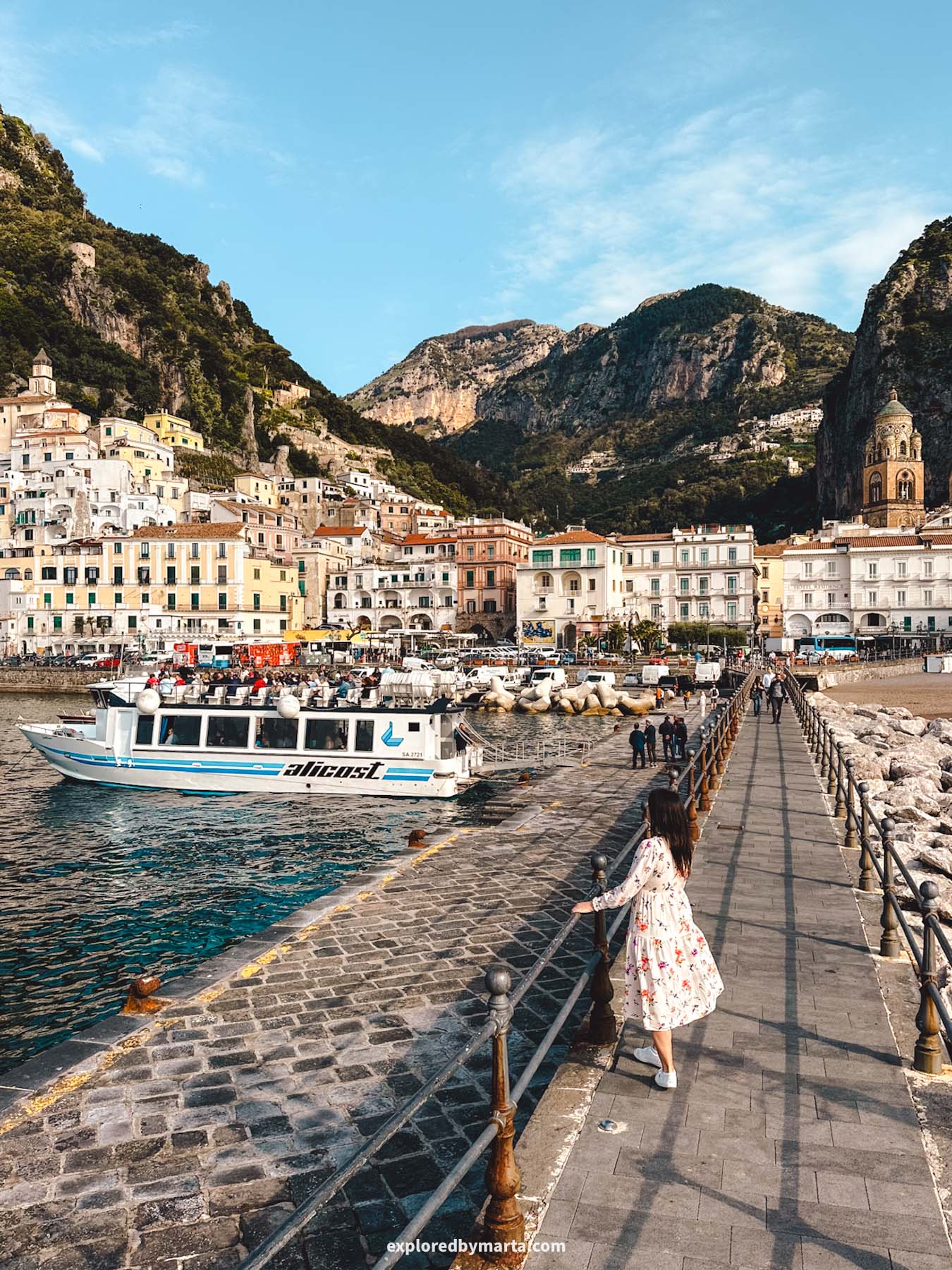
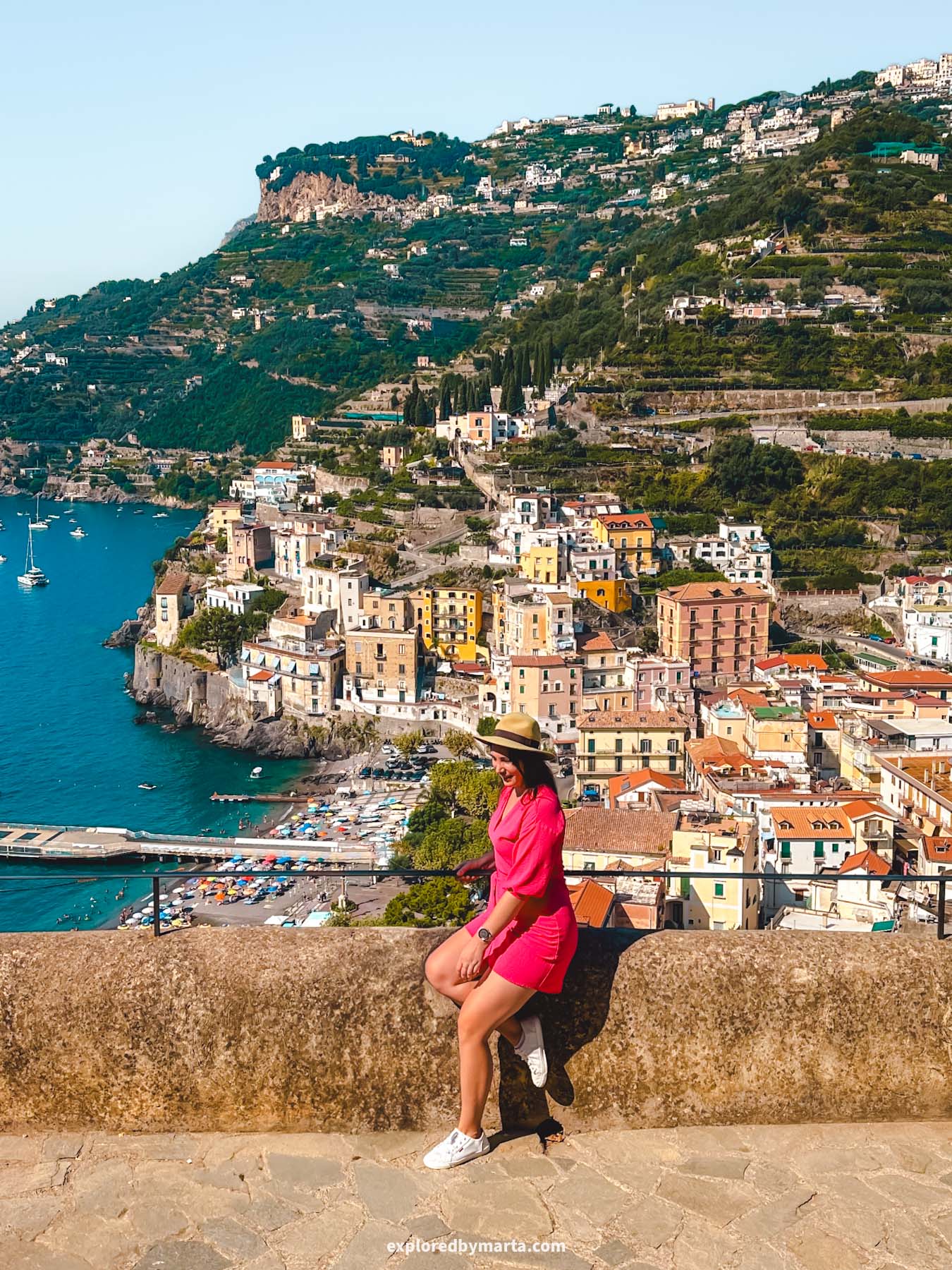
Let’s be honest. The main reason travelers are staying in Salerno is that they want to stay in cheaper accommodations than in the towns on the Amalfi Coast, and they want easy access to the towns on the Amalfi Coast.
Salerno is called the gateway to the Amalfi Coast for a reason. Amalfi Coast towns can be difficult to access because the only road that goes along the coastline is narrow, winding, and often congested with traffic.
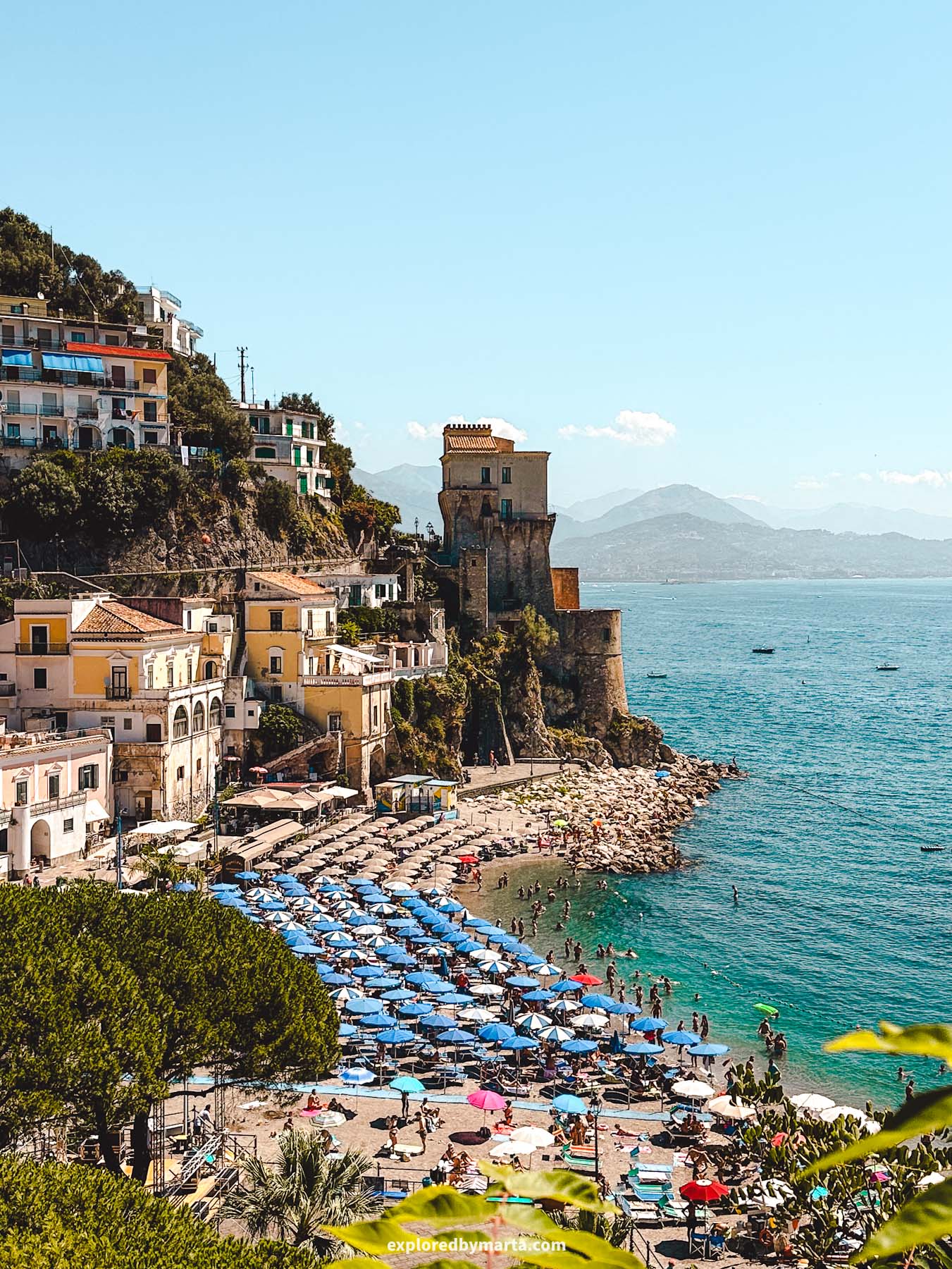

Even more, during the summertime, car access to the Amalfi Drive road is limited for rental cars due to the License Plate Alternation System. Based on the last number on your license plate, you can enter the Amalfi Drive road only on odd or even dates of the month.
For that reason, many travelers choose to travel to the Amalfi Coast towns by regular ferries or water taxis, and Salerno is the perfect base for these trips, with ferry connections to every town on the coastline.
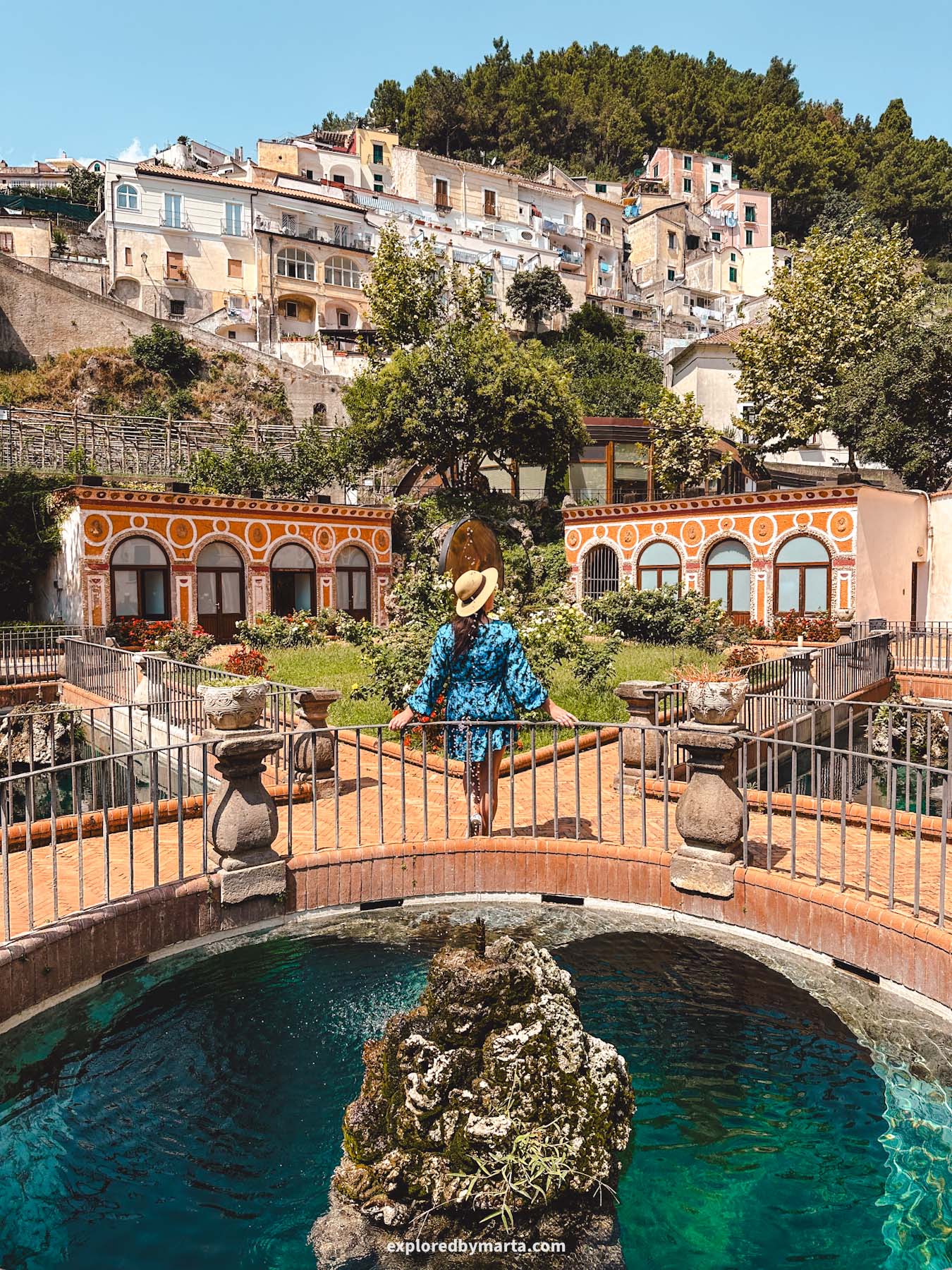
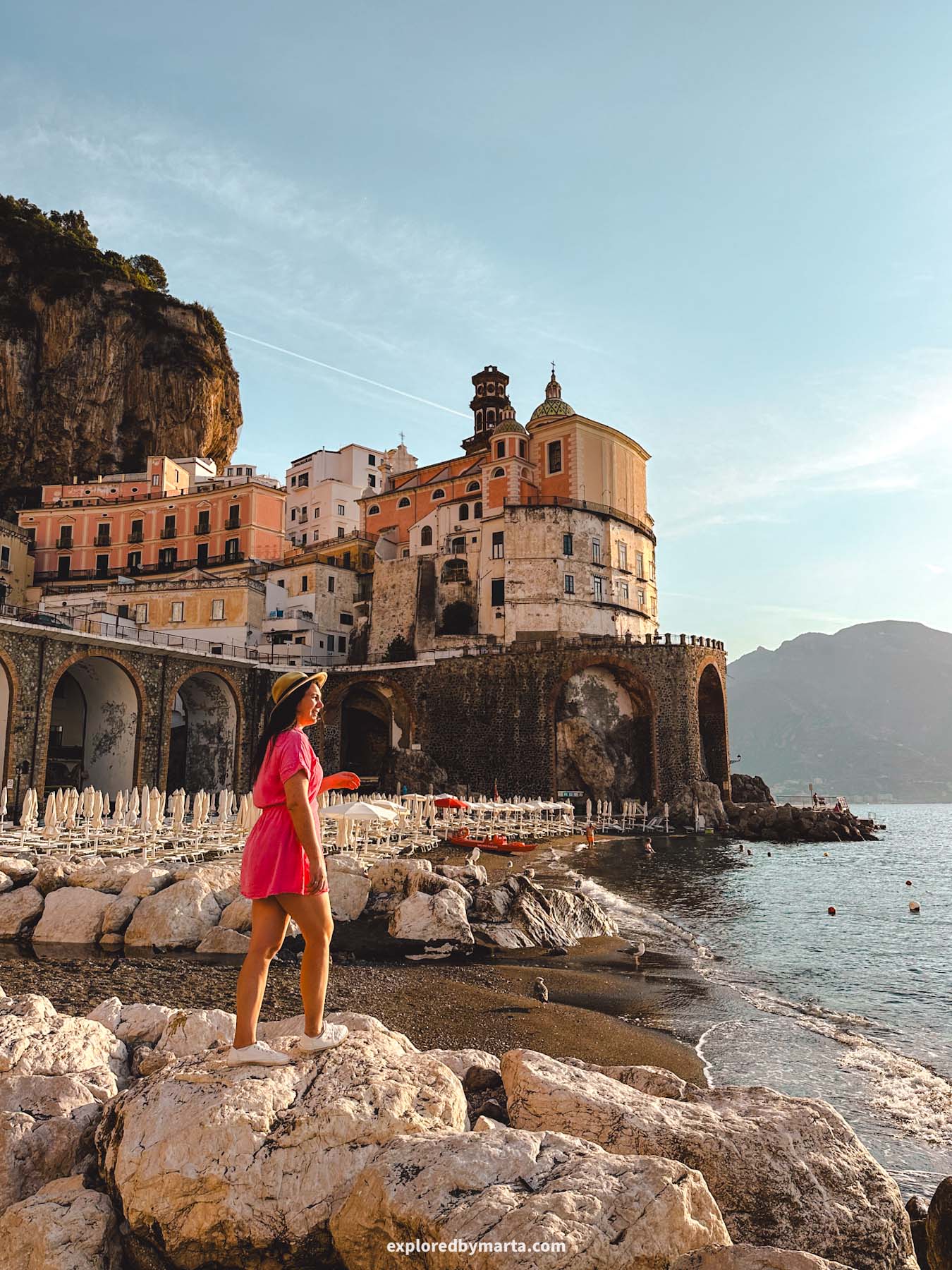
Ferry companies like Travelmar have regular connections to towns like Amalfi, Positano, Vietri sul Mare, Cetara, Minori, Maiori, and even Atrani and Praiano. Most ferries depart from a pier next to Piazza de Concordia, but some depart from the “oyster terminal”.
Moreover, seeing the Amalfi Coast from the sea is a whole other experience! You can only see so much while driving a car along the coastline, but from the sea you get the whole picture. And let me tell you, the Amalfi Coast is called the Divine Coast for a reason!
Location: Port of Piazza della Concordia – Stazione Marittima di Salerno
Happy exploring!
Once a strategic gateway to the Mediterranean, Salerno is a city rich in history, culture, and charm. From its medieval cathedral and hilltop castle to its artistic murals and seaside promenade, Salerno offers a mix of old-world beauty and laid-back coastal charm.
We spent several days exploring Salerno during our travels around the Amalfi Coast and were pleasantly surprised by how much this underrated city has to offer.
I hope this Salerno travel guide helps you plan your own visit and discover its many hidden gems. Whether it’s the panoramic viewpoints, the ancient temples nearby, or simply a walk along the sea, Salerno is full of unforgettable moments! Happy travels!
PIN FOR LATER!
